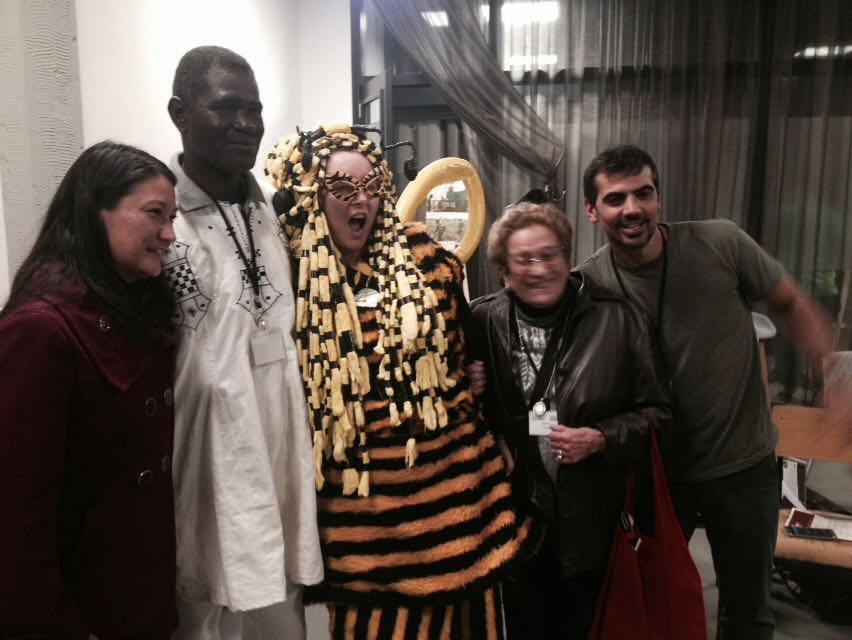
21.00h: Ali Tapsoba (CCAE & FASA) and Zen Honeycutt from Moms Across America with a British bee activist, Miryam Gorban and Pablo Rubino (Argentina)
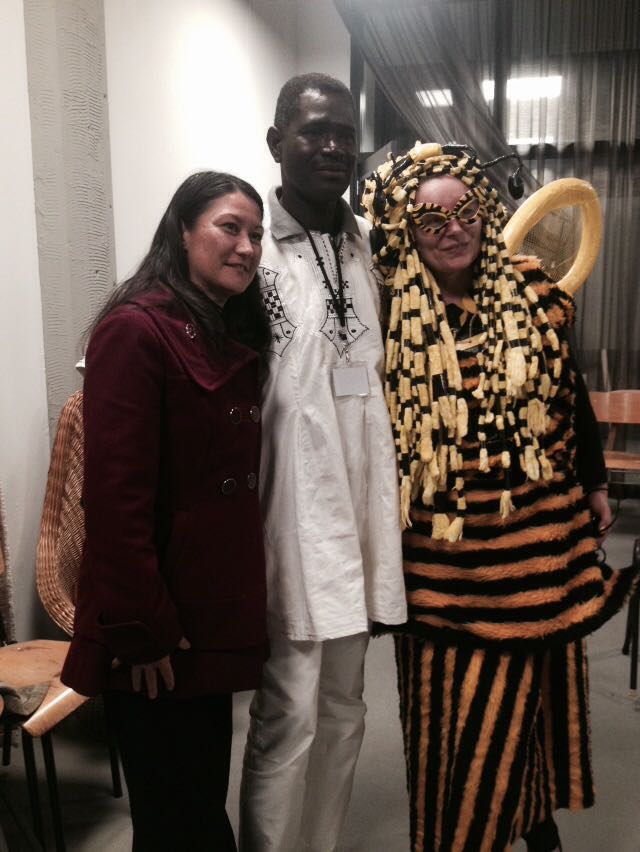
Ali Tapsoba (Terre à Vie) and Zen Honeycutt (Moms Across America) with British bee activist
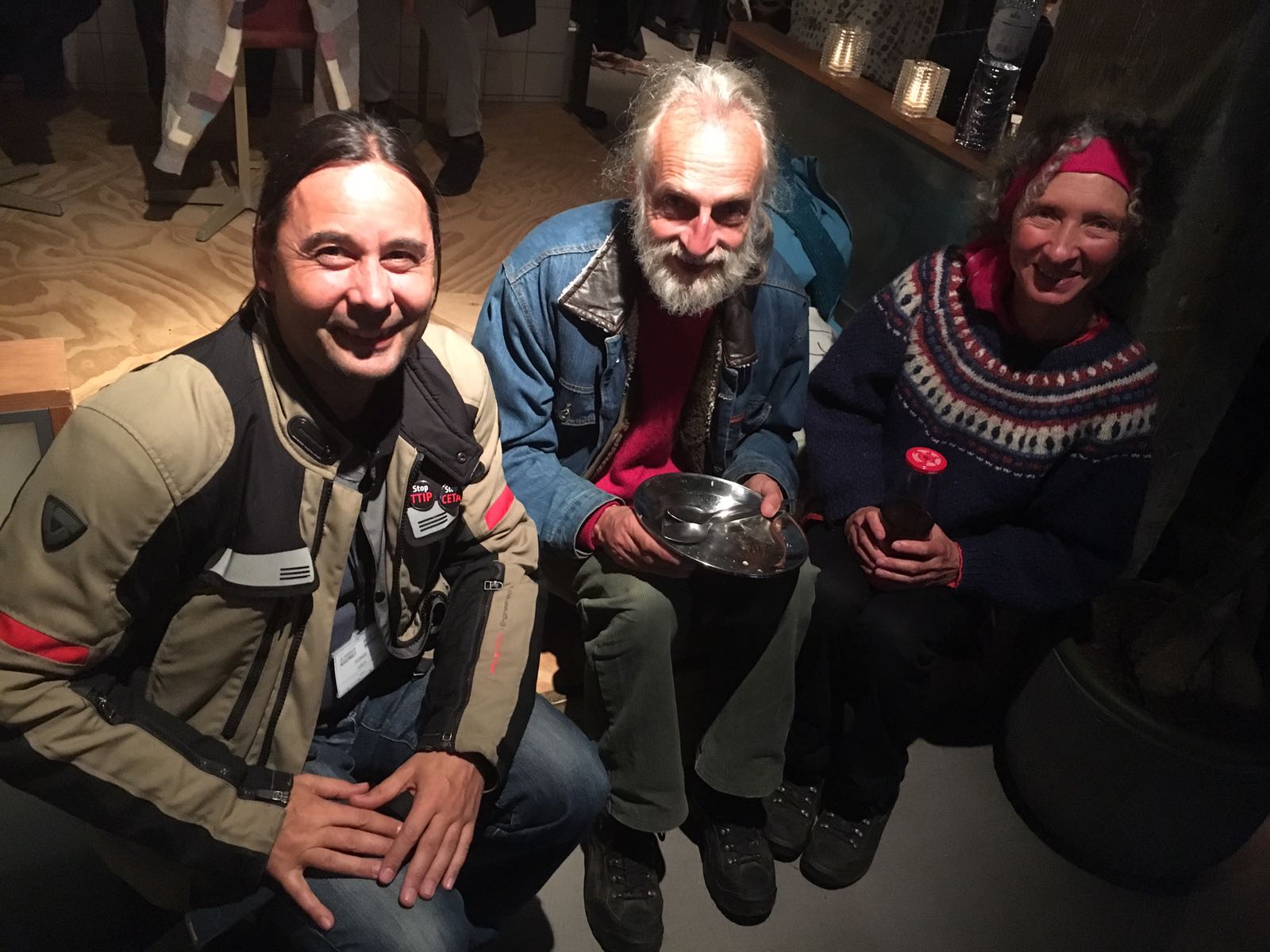
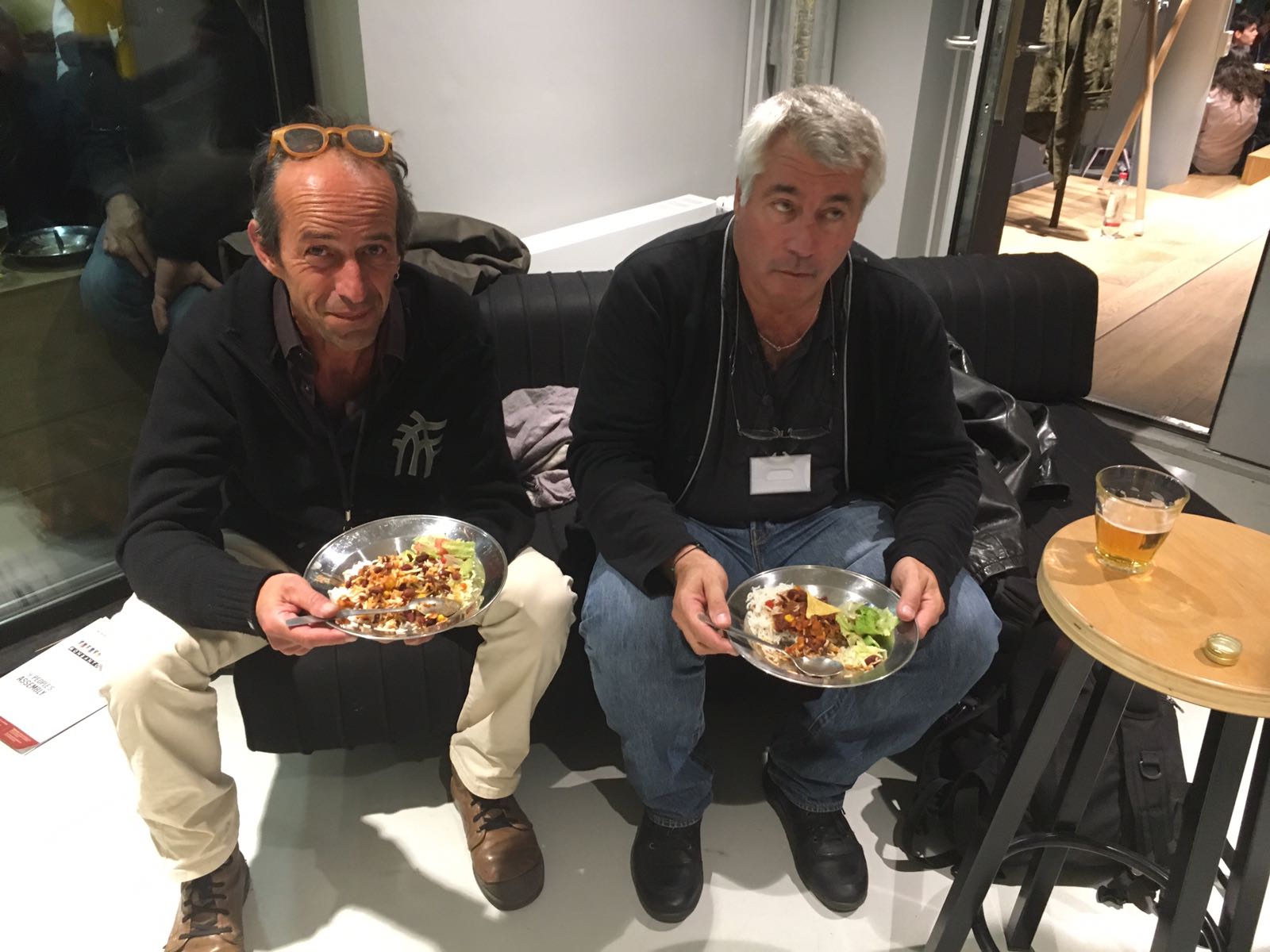
21.10: French photographer Gérald de Viviés enjoying dinner at the end of the day
De Viviés’s work “Farmerseed Outlaws” was amongst those exhibited at the Bazaar of Ideas in occasion of the People’s Assembly
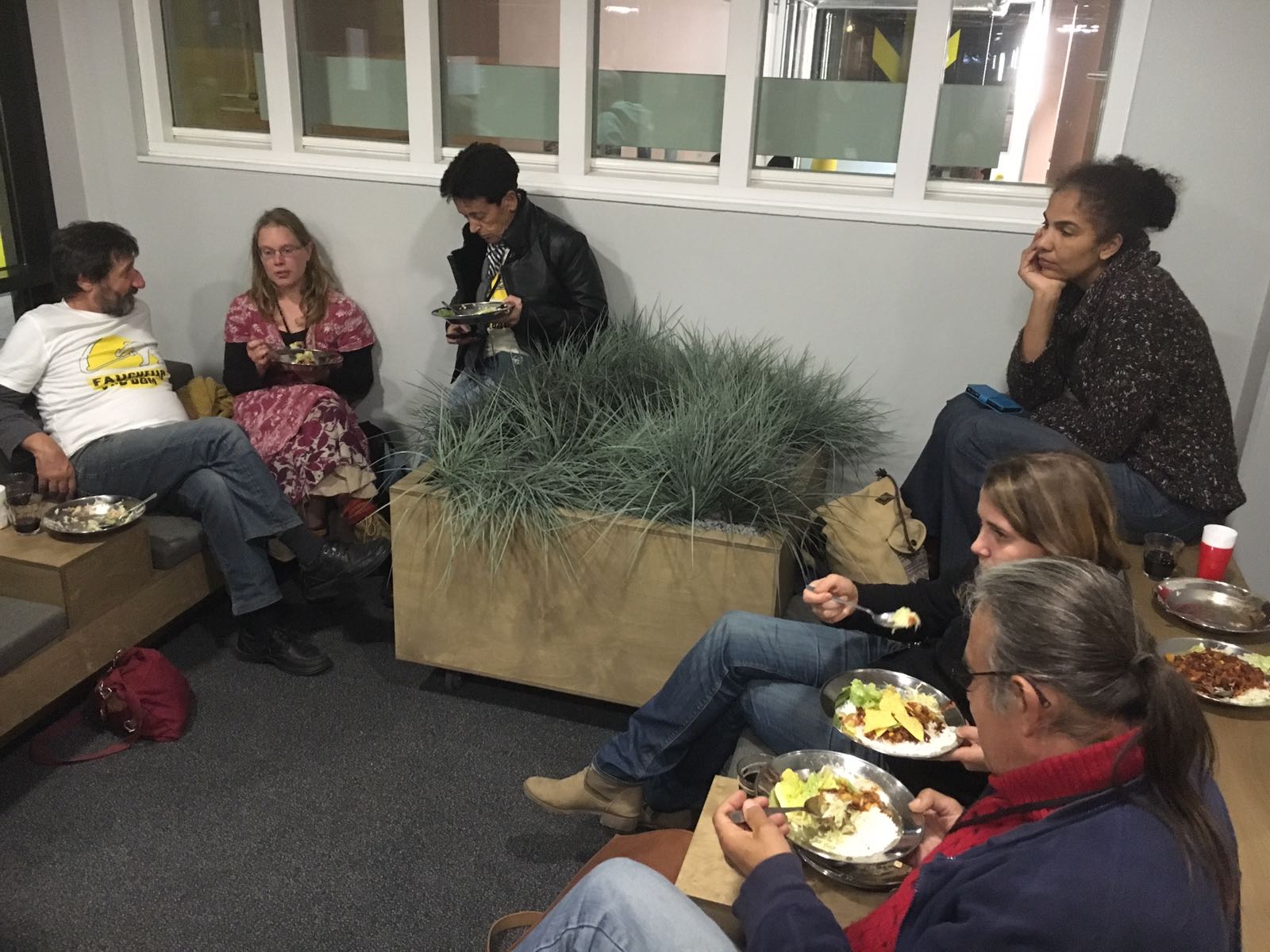
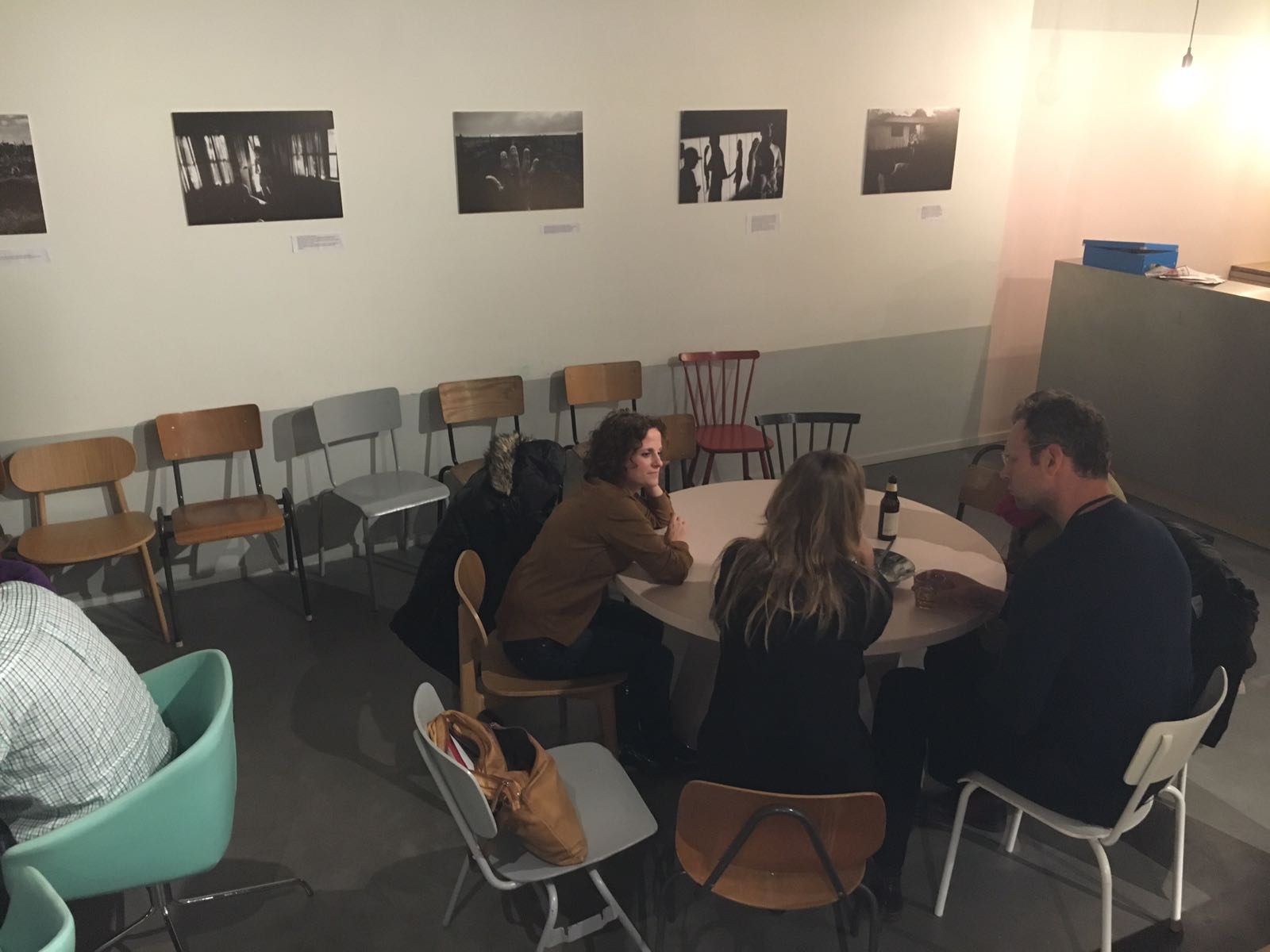
21.00h: attendants enjoying refreshments at the end of the sessions
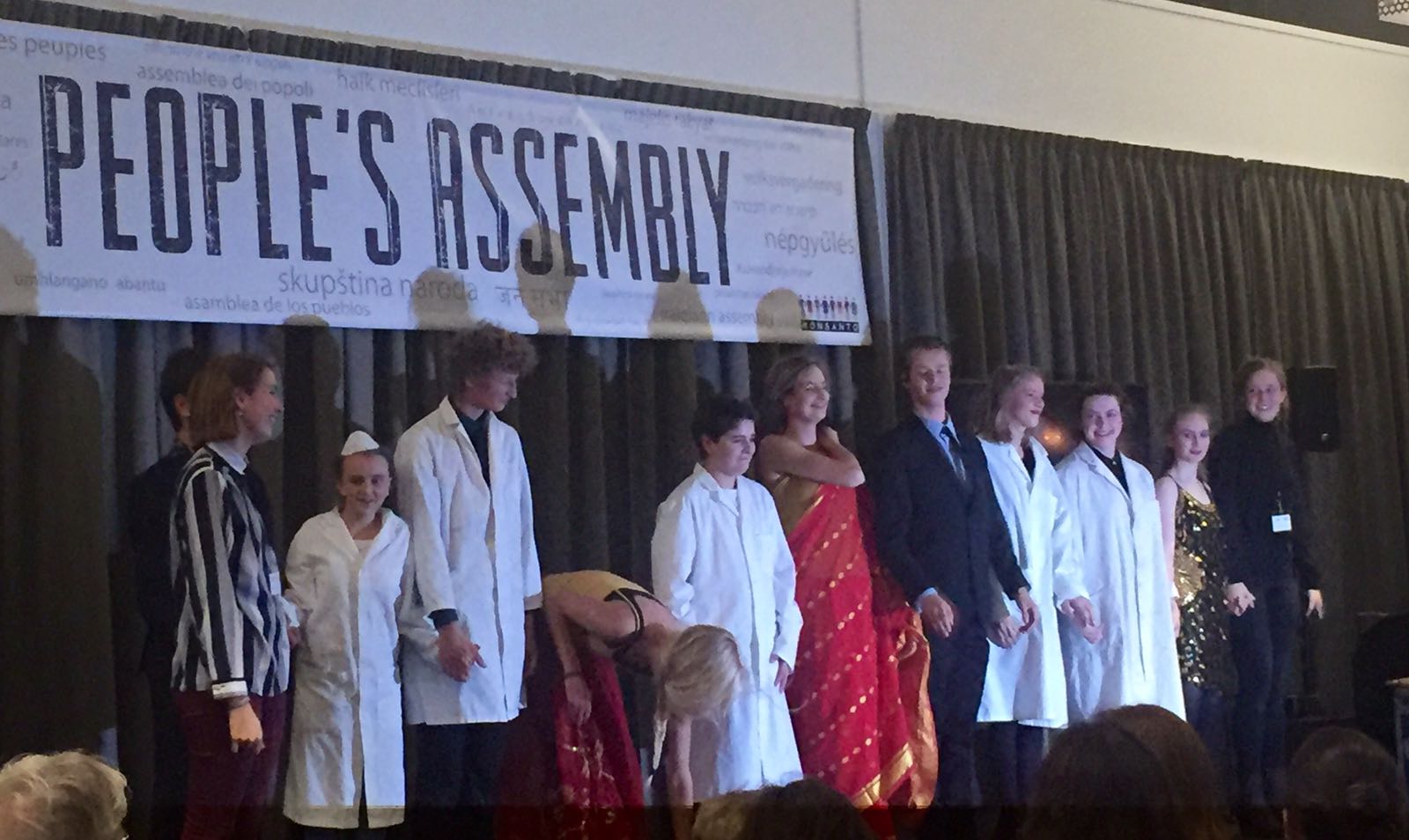
A group of young people aged 14 to 23 performed four scenes from the Monzado original play

20.00 – 20.30: “Monzado”, a theatre/dance performance by Marieke Vingerhoets showing the different aspects of multinationals’ chain production (genetic modification, lobbyism and the exploitation of Mand and Earth) that come with Monzado’s search for maximum profit.
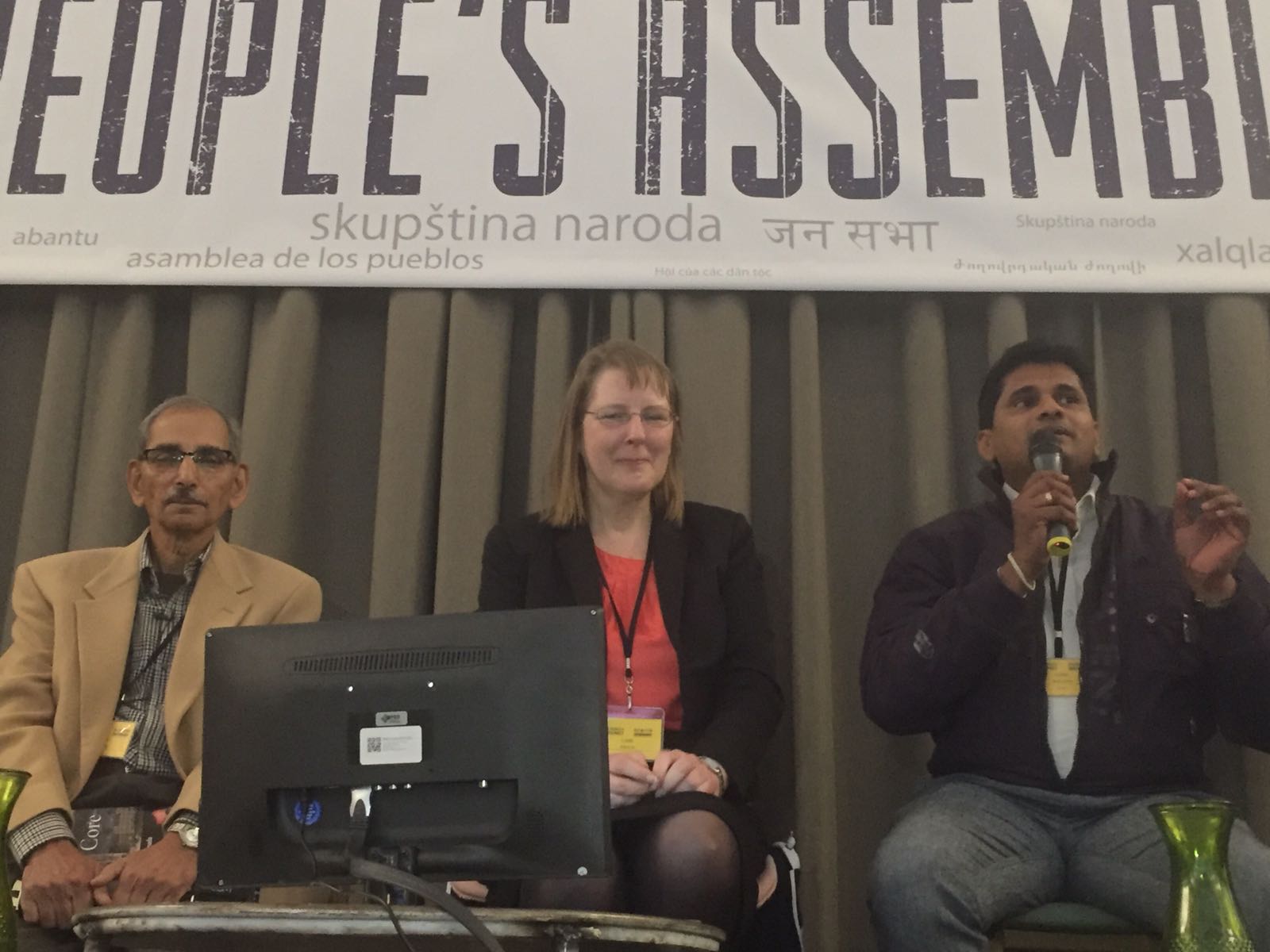
19.00h: Dr Shiv Chopra with Claire Robison (GMwatch UK)
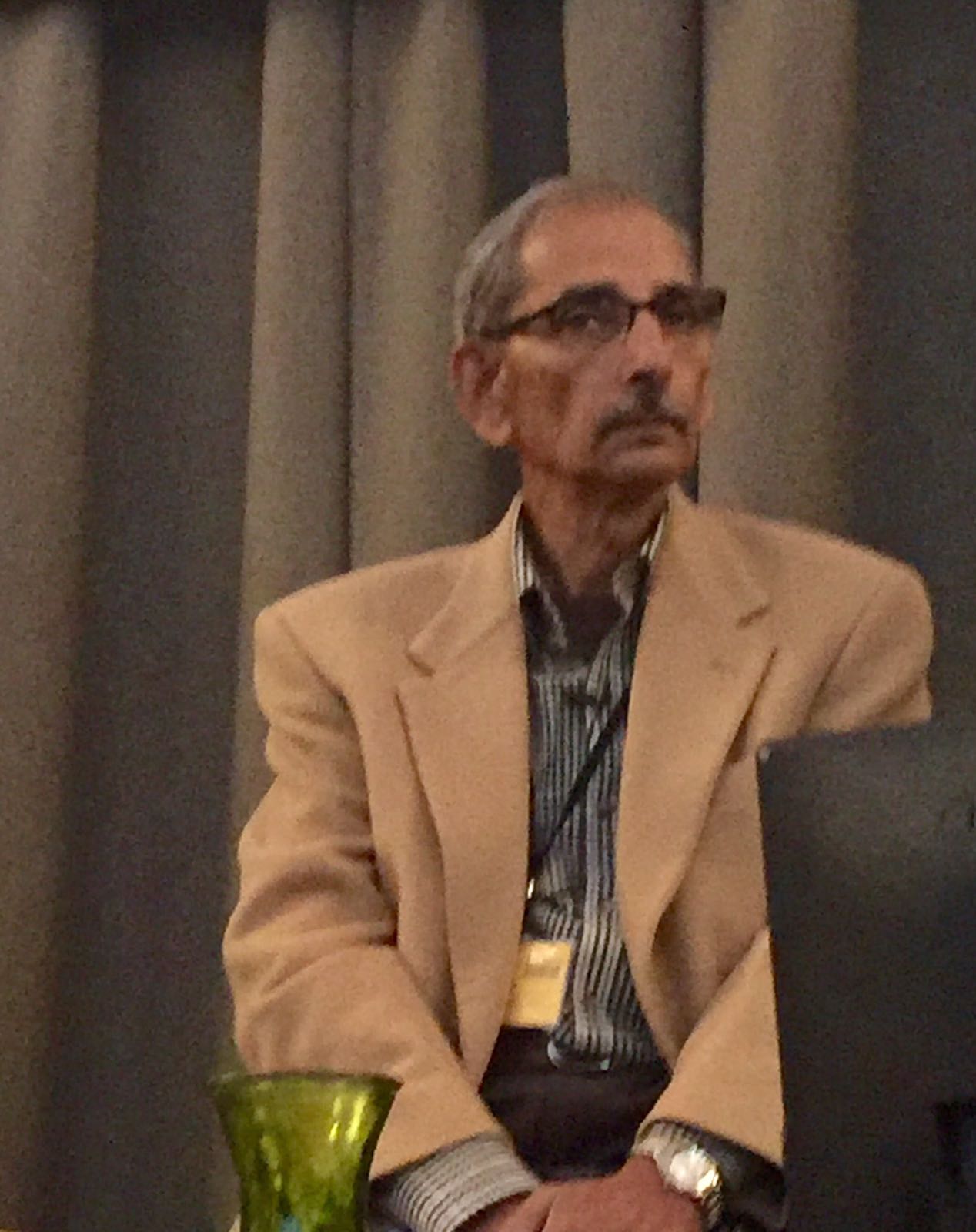
18.44h: Shiv Chopra delivering his speech at the fourth session of the day (Attack on Science and Scientists):
“…two hundred scientist wrote a joint petition to the Ministry of Health [about vaccines that were officially approved which they deemed dangerous for human health] saying these were wrong and should be stopped. They were completely ignored. So therefore, if I’m going to sue anybody it won’t be Monsanto, or Bayer, or any of these people. It is my own government that has allowed for this to happen for over thirty years!”
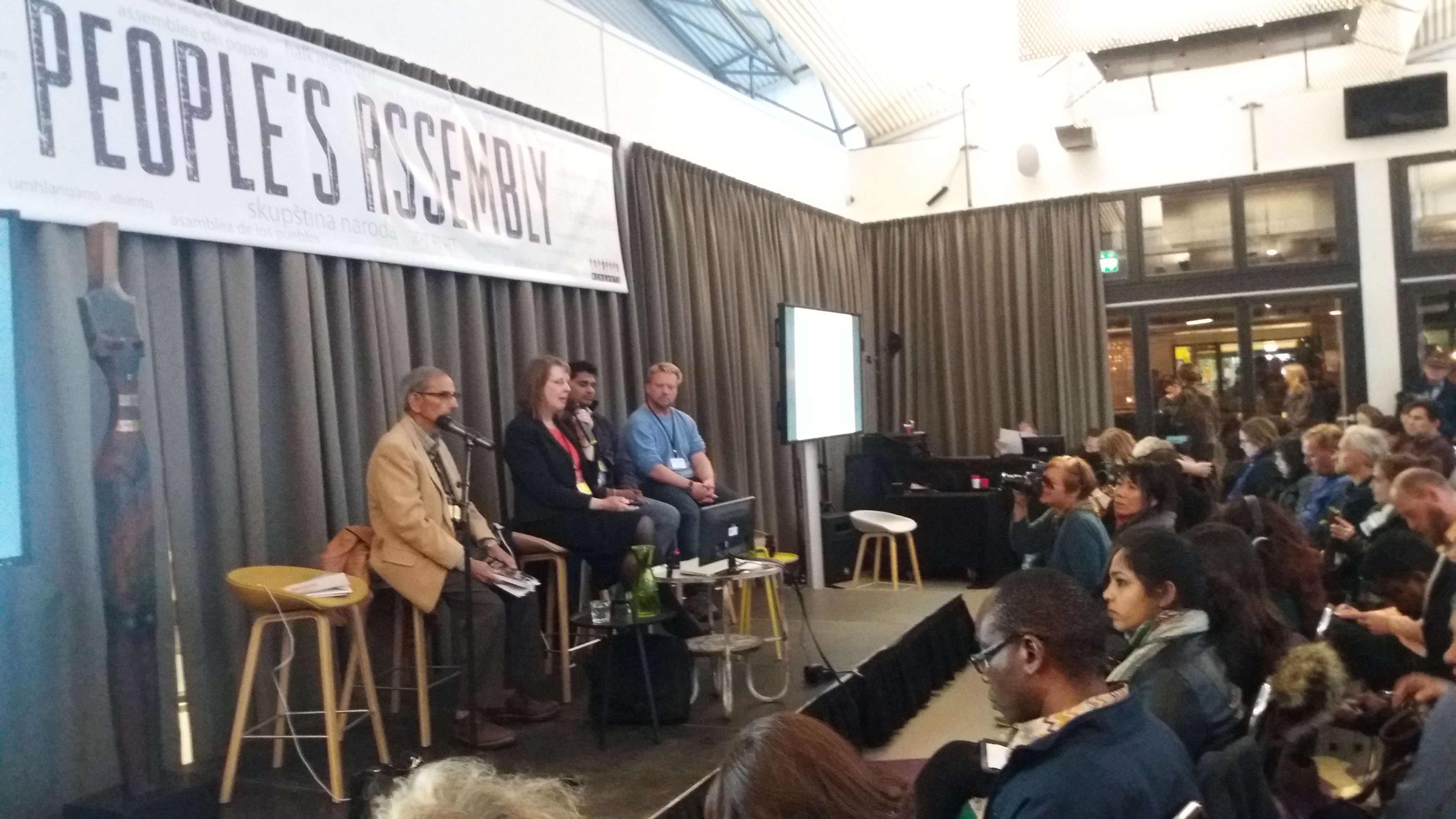
18.30h: Dr Shiv Chopra, Claire Robinson and Nicolas Defarge
Shiv Chopra: “In Canada, Monsanto didn’t even have to lie: they came in from the front door”
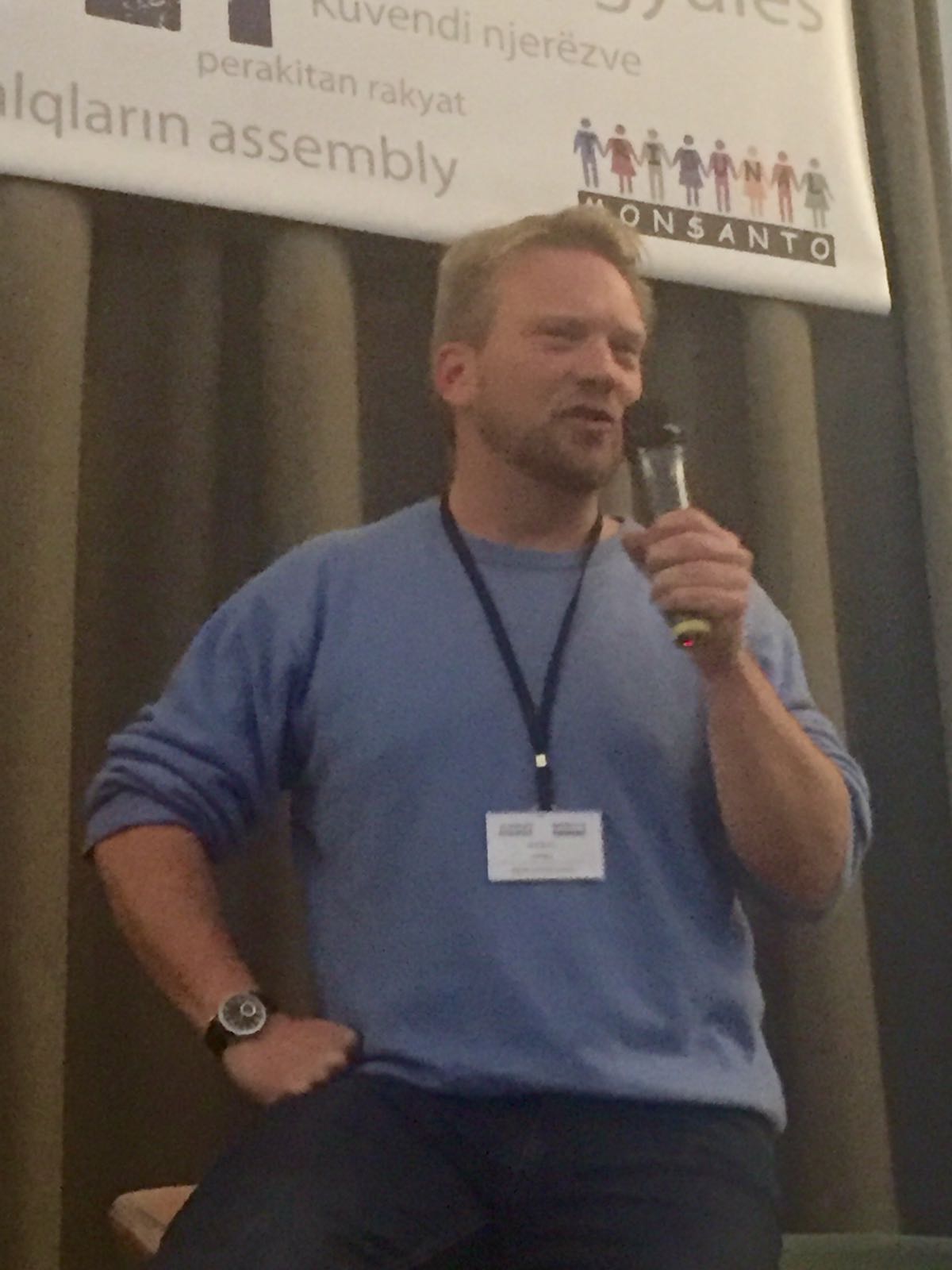
18.00h: Nicolas Defarge, also witness at the Monsanto Tribunal, intervenes during the fourth and final talk session of the day “Attack on Science and Scientists”
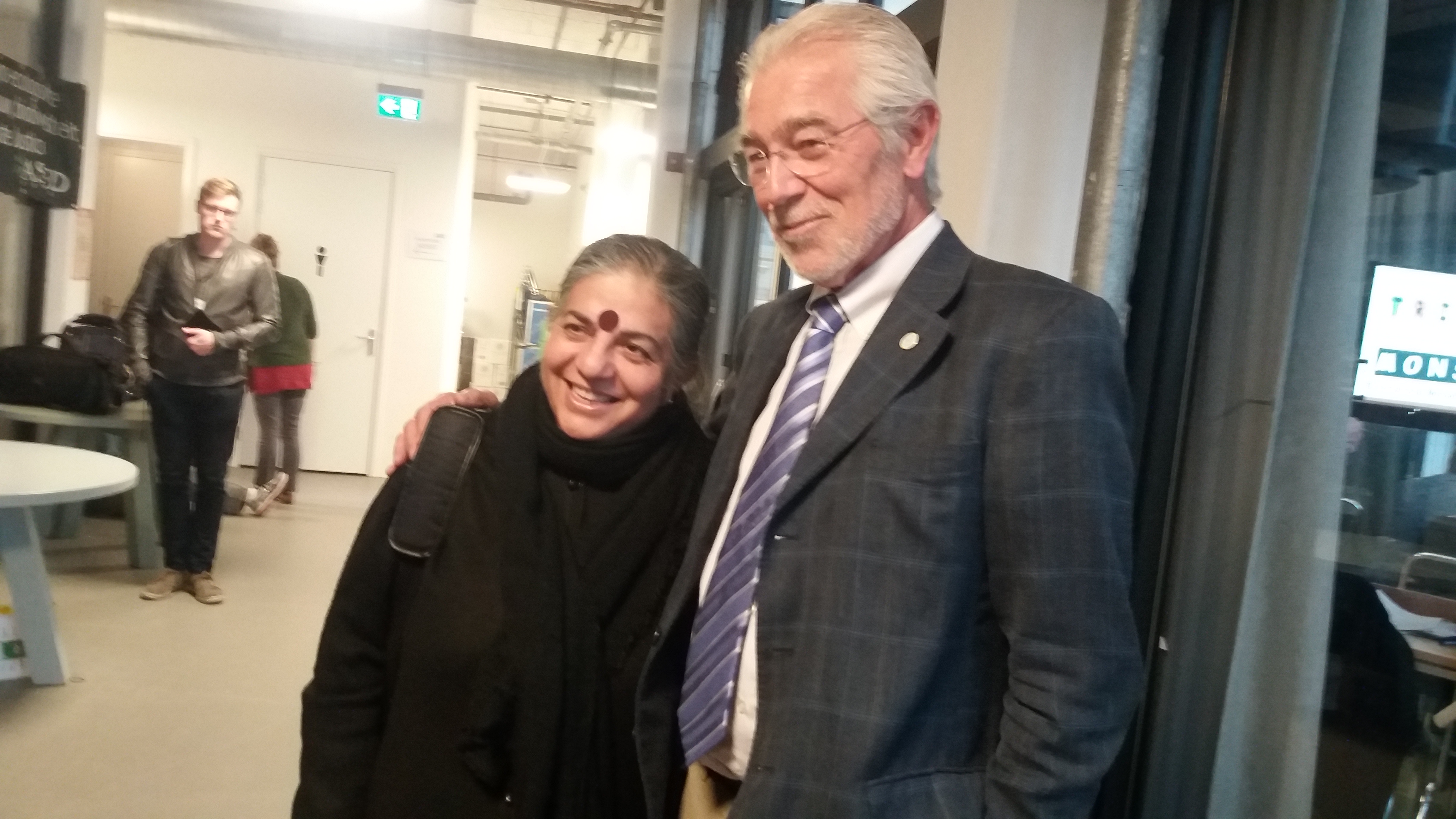
17.30: Hans Herren and Vandana Shiva in between two sessions
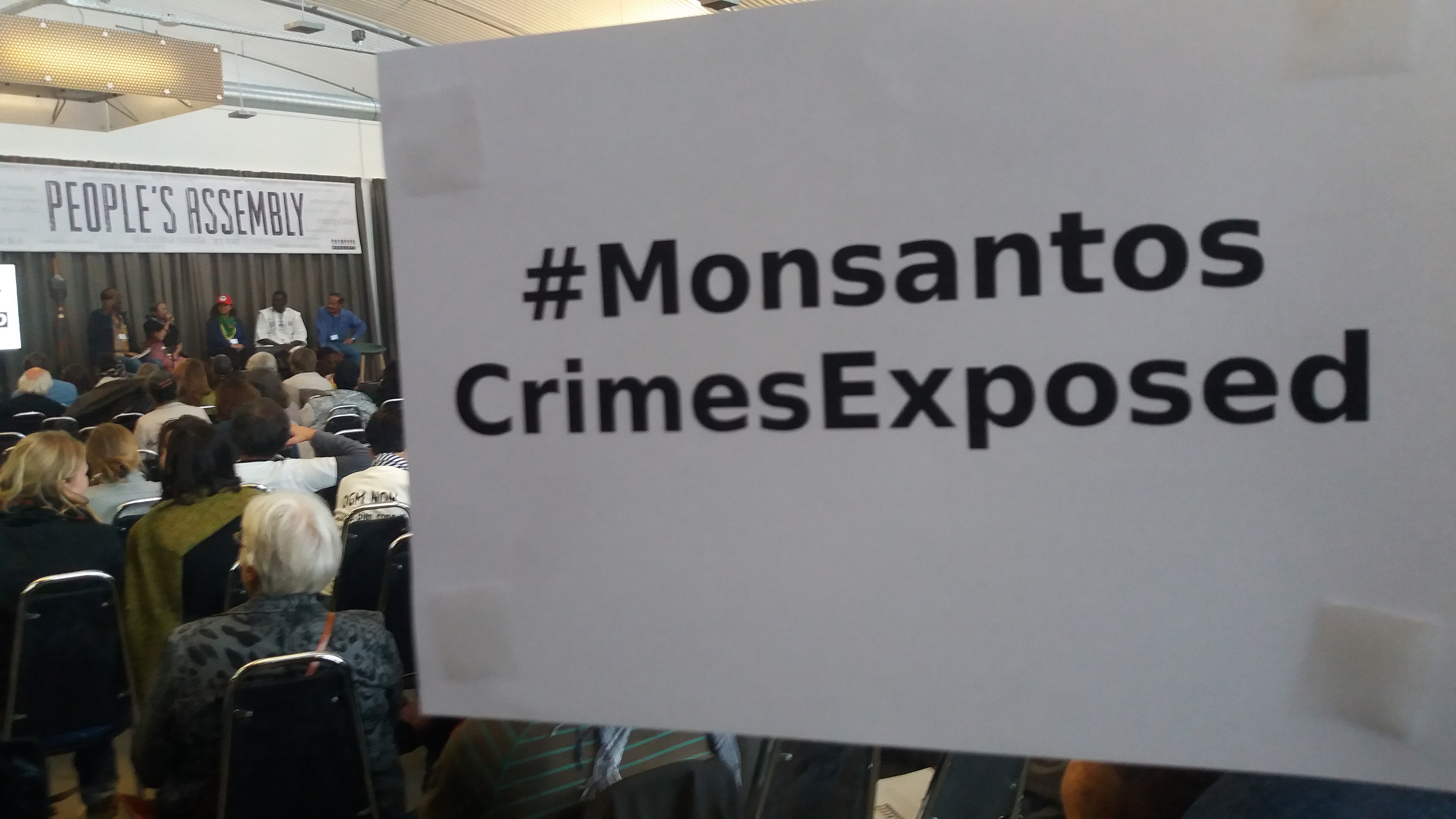
#MonsantosCrimesExposed – the common hashtag for the first day’s twitterstorm
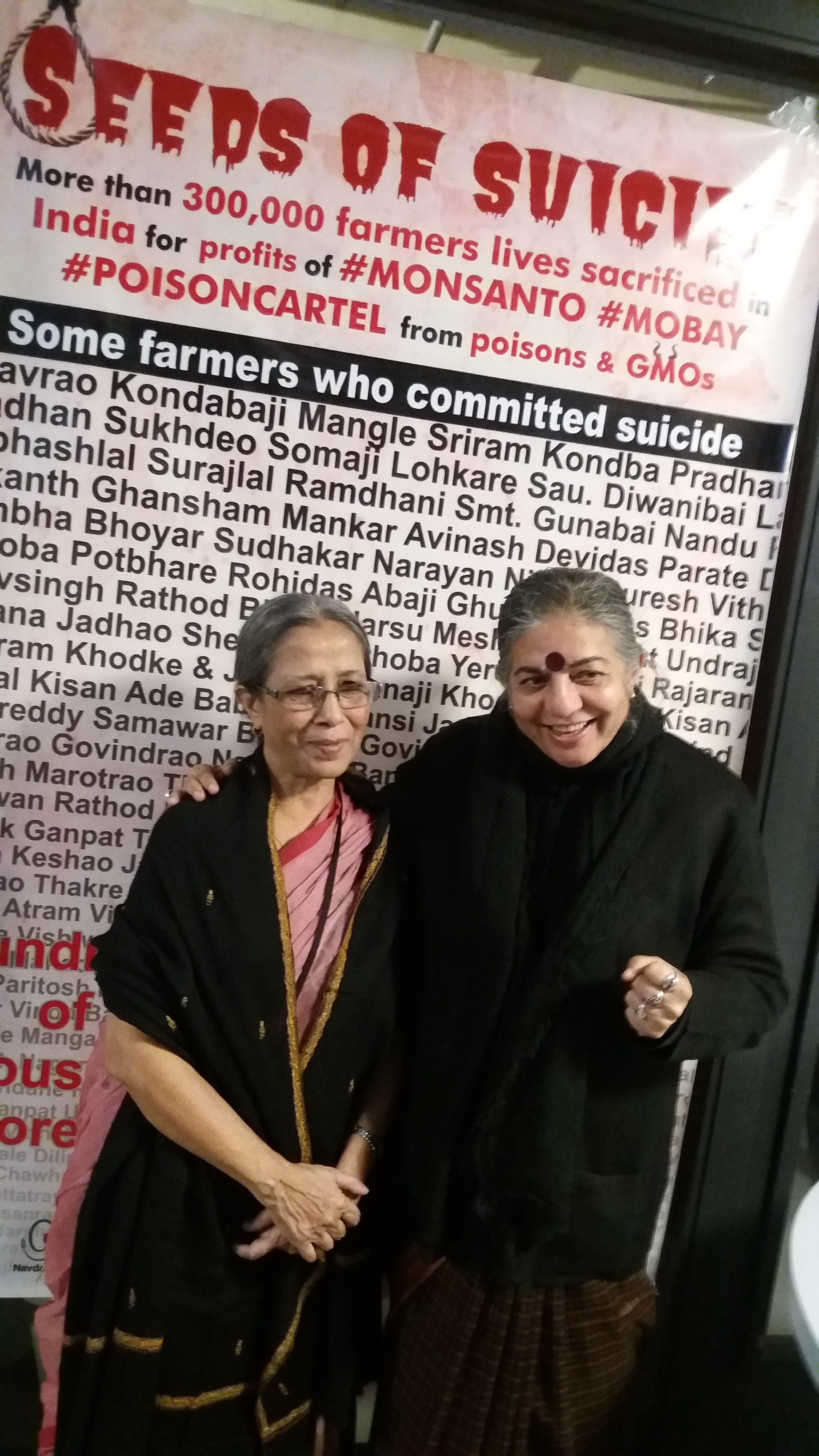
Dr Vandana Shiva with P.A. speaker Farida Akhter, Bangladeshi activist and executive director of UNINIG (Policy Research for Development Alternatives)
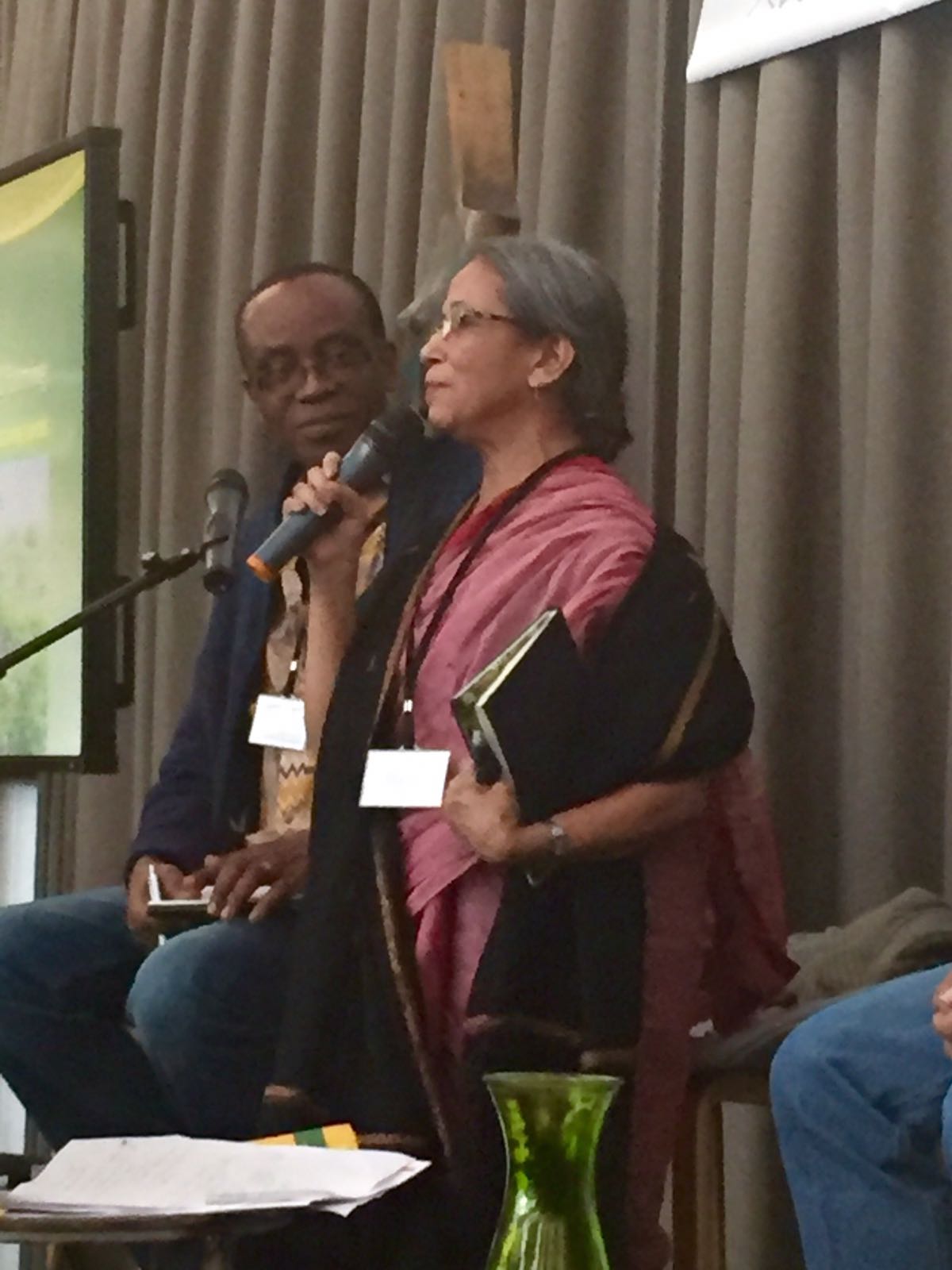
Nnimmo Bassey (Friends of the Earth International, Environmental Rights Action) and Farida Akhter
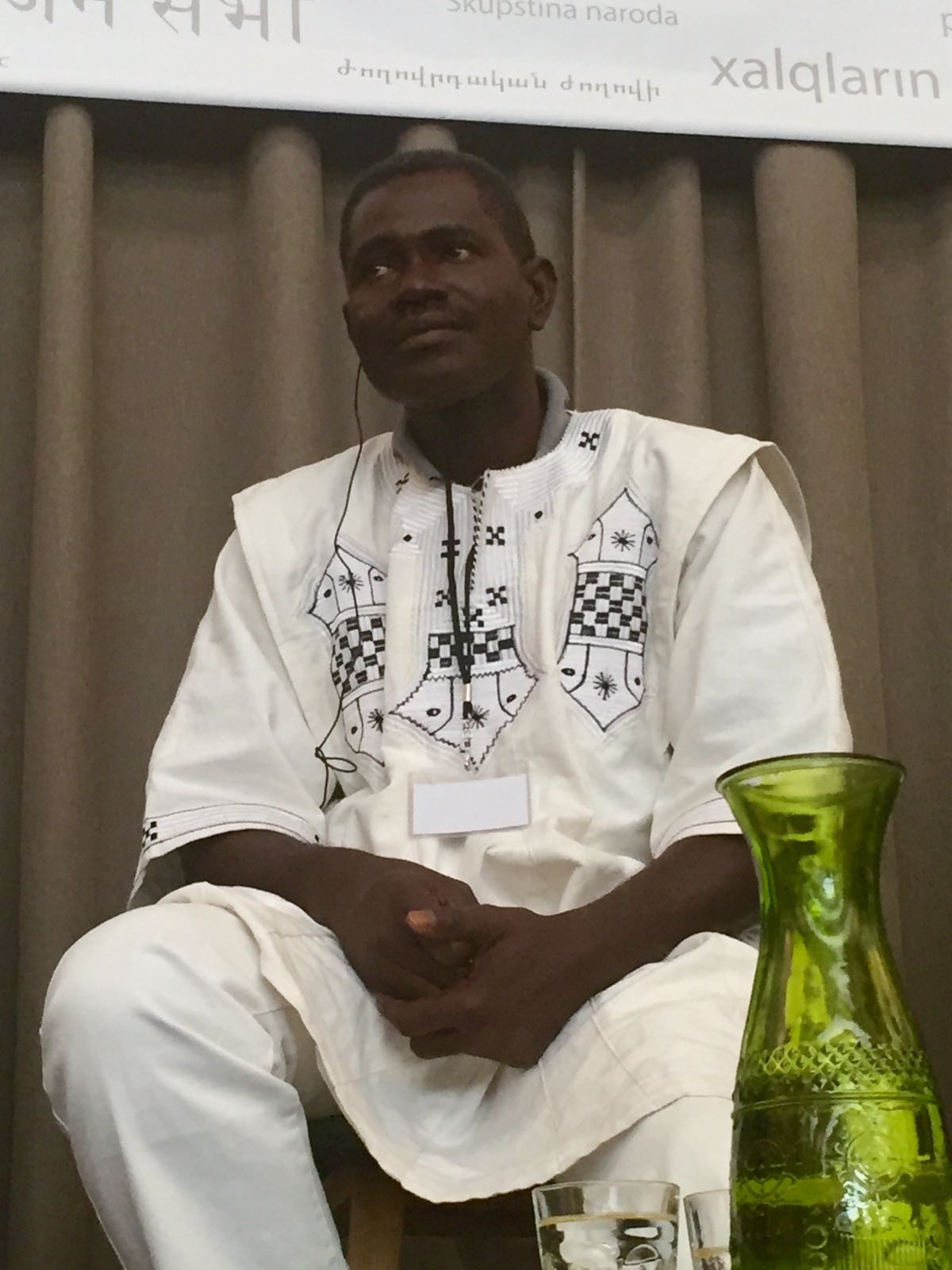
Ali Tapsoba (Terre à Vie, Burkina Faso)
“In Burkina Faso, our ability to engage and mobilize all of civil society, and to organize marches was key in enabling us to get GM cotton finally banned. Today we demand that we consider creating a global front against Monsanto for food sovereignty to include all – including women. As the saying goes ‘what women want, god wants. As such, we need to act together. I have no flag because I am not only Burkina Faso, I am also Africa, European, Asian (…)”. “We have to produce what we consume and consume what we produce. If someone controls our seeds, they control our food, our thoughts and our life”
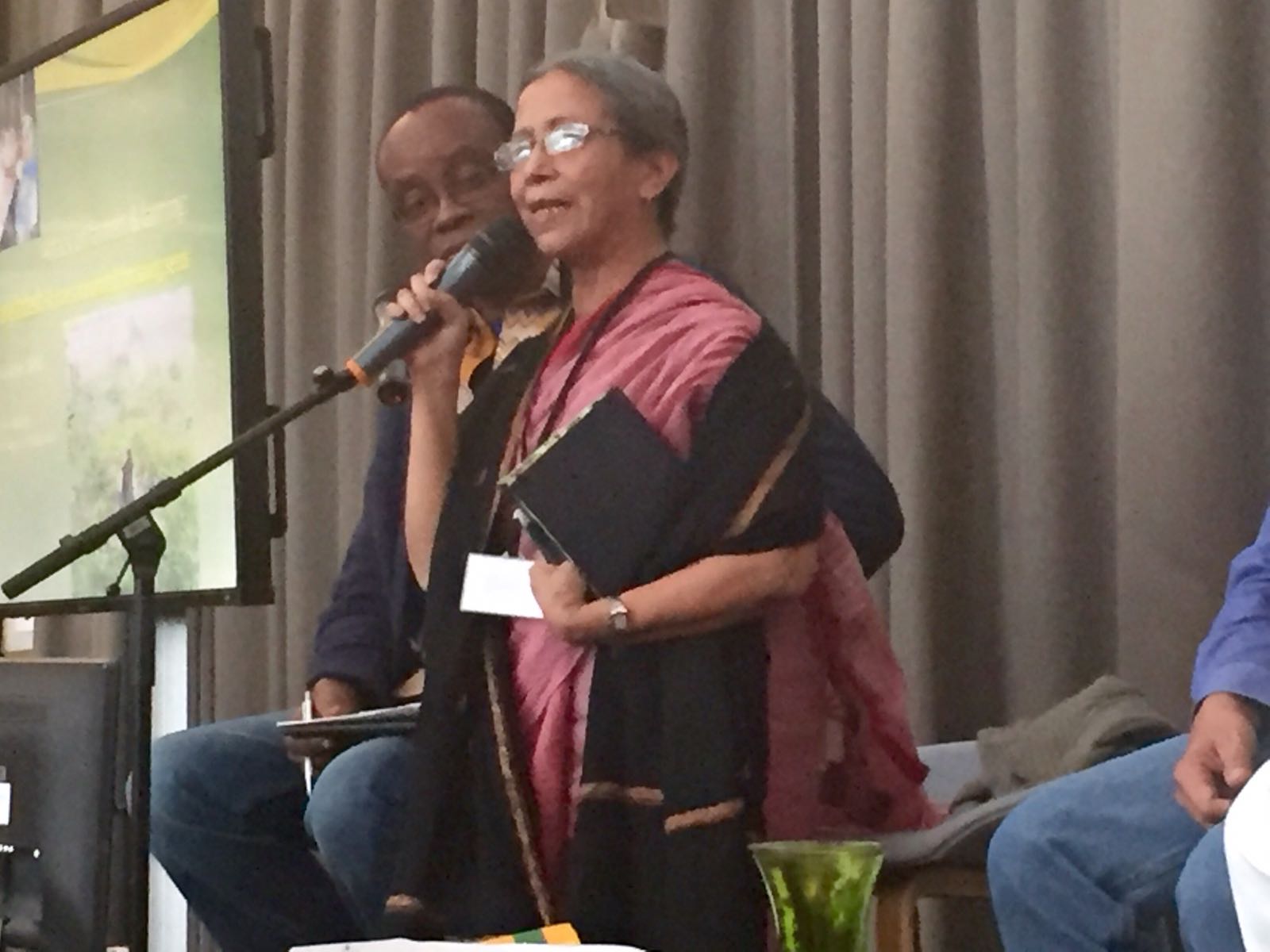
Farida Akhter (UBINIG Bangladesh):
“Companies say that we need to be helped to grow more food. But our country is named “the country of gold”. Our gold is not the gold you find in mines but the soil we have that can produce such bountiful food (in fact, Bangladesh has 248 varieties of Brinjal)! Monsanto claimed intellectual property rights on 9 of brinjals in a secret agreement with the government without the knowledge of the people. In fact, consumers are not even told whether the brinjal they buy is Bt. Brinjal or not! Bt Brinjal is a direct attack on our farmers and our farming. We need support from you not only for our sake but also for your sake because Brinjal is a global vegetable that comes to your plate as well. As for myself, I believe we have the truth, so we will win”
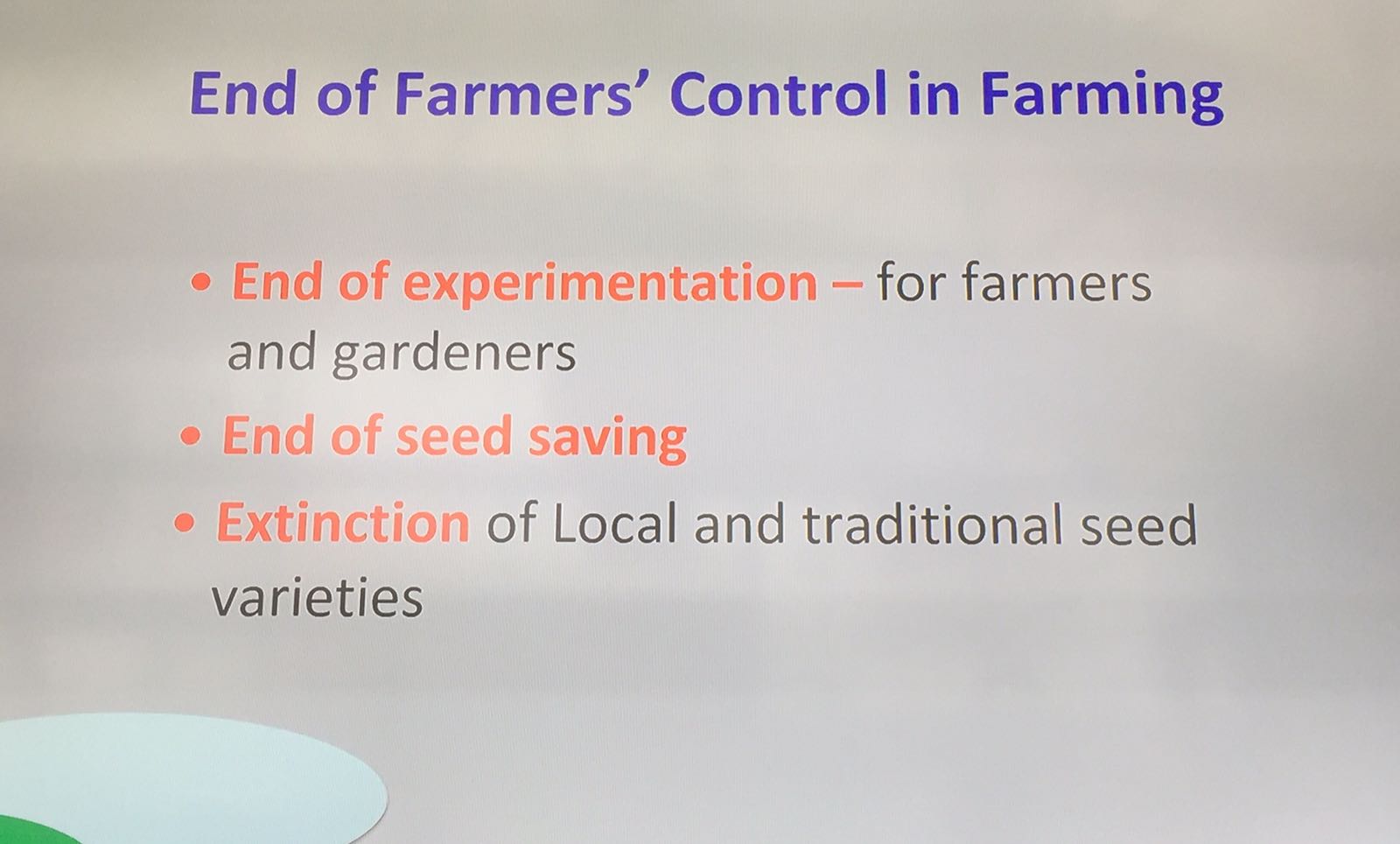
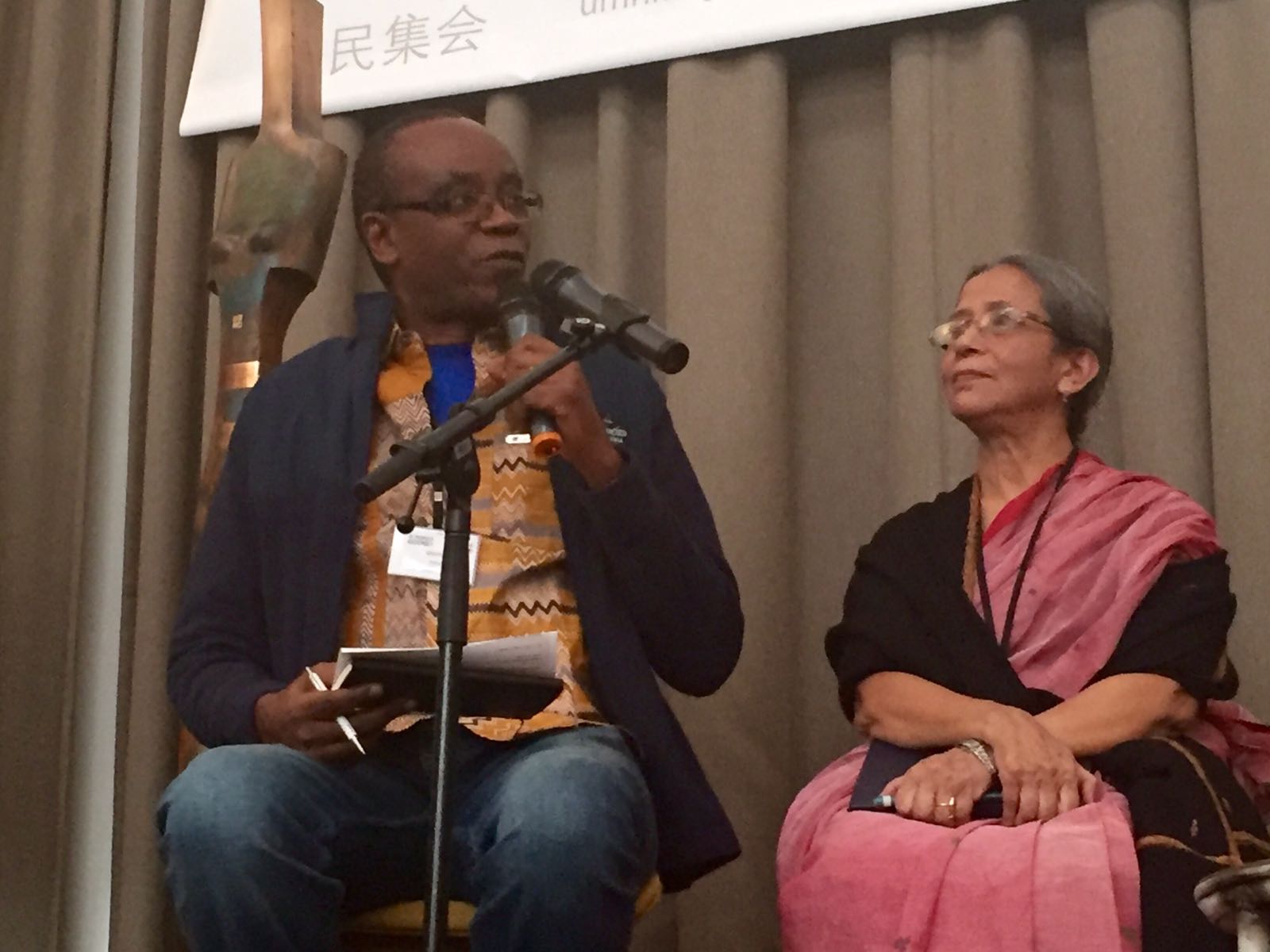
Intervention by Nigerian environmental activist Nnimmo Bassey (Health of Mother Earth Foundation, Nigeria):
“Nigeria is a nation of 170 million or more people. Our farmers depend on mixed cropping and there is very little of monoculture in the country and also very little of industrial agriculture. There has been a major push lately through Monsanto not only to introduce monoculture, but to take over the dominant staple crop in the country. So far their development experimentation is failing. They are in the background with some government agencies, which – rather than regulate biosafety – is promoting modern biotechnology. So we have a Biotech organization regulating biotechnology in Nigeria, which means the system we have is not really any system to regulate anything, but to open up the environment to GMOs. And if Nigeria is overtaken by Monsanto, then you can be sure they have Africa, which is what they are aiming to.”

Ali Tapsoba, agribusiness technician and human rights activist from Burkina Faso, recounts the story of his country’s relation to GMOs, in particular Bt cotton. Ali travelled 6000 km to attend the People’s Assembly.
” in the early nineties the UN was going to put sanctions on my country but the government struck a deal with the US whereby Monsanto could use Burkina Faso as a trial country and the US would allow those sanctions to be lifted. The impact of Monsanto’s entry was almost immediately palpable. Our food sovereignty was undermined just as much as the social basis of our (predominantly agrarian) culture. By this I mean that for 1000 years it was part of our culture to share seeds which we could suddenly no longer do. The consequence of this was economic disaster: cotton yields decreased, at same time the use of chemicals did not, while crucially the quality of cotton decreased, so farmers could not sell cotton anymore. In health and safety terms, many peasants got sick, others died. We saw animals die because they ate the sprayed plants’ leaves. Moreover, there was no research to identify the causes of this sickness”.
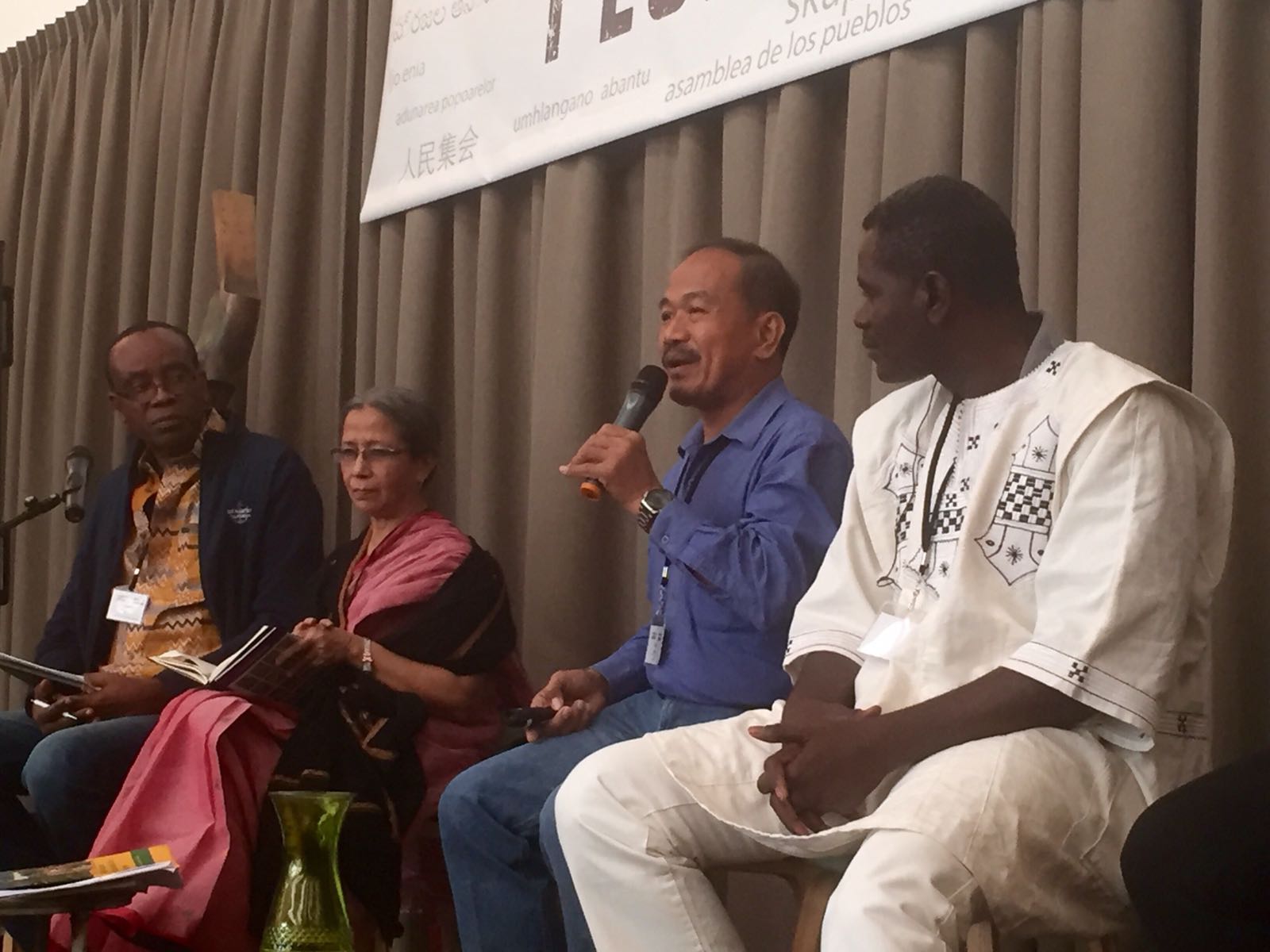
Intervention by Charito P. Medina (Philippines), national coordinator of MASIPAG and member of the National Organic Agriculture Board (NOAB) of the Philippines Department of Agriculture
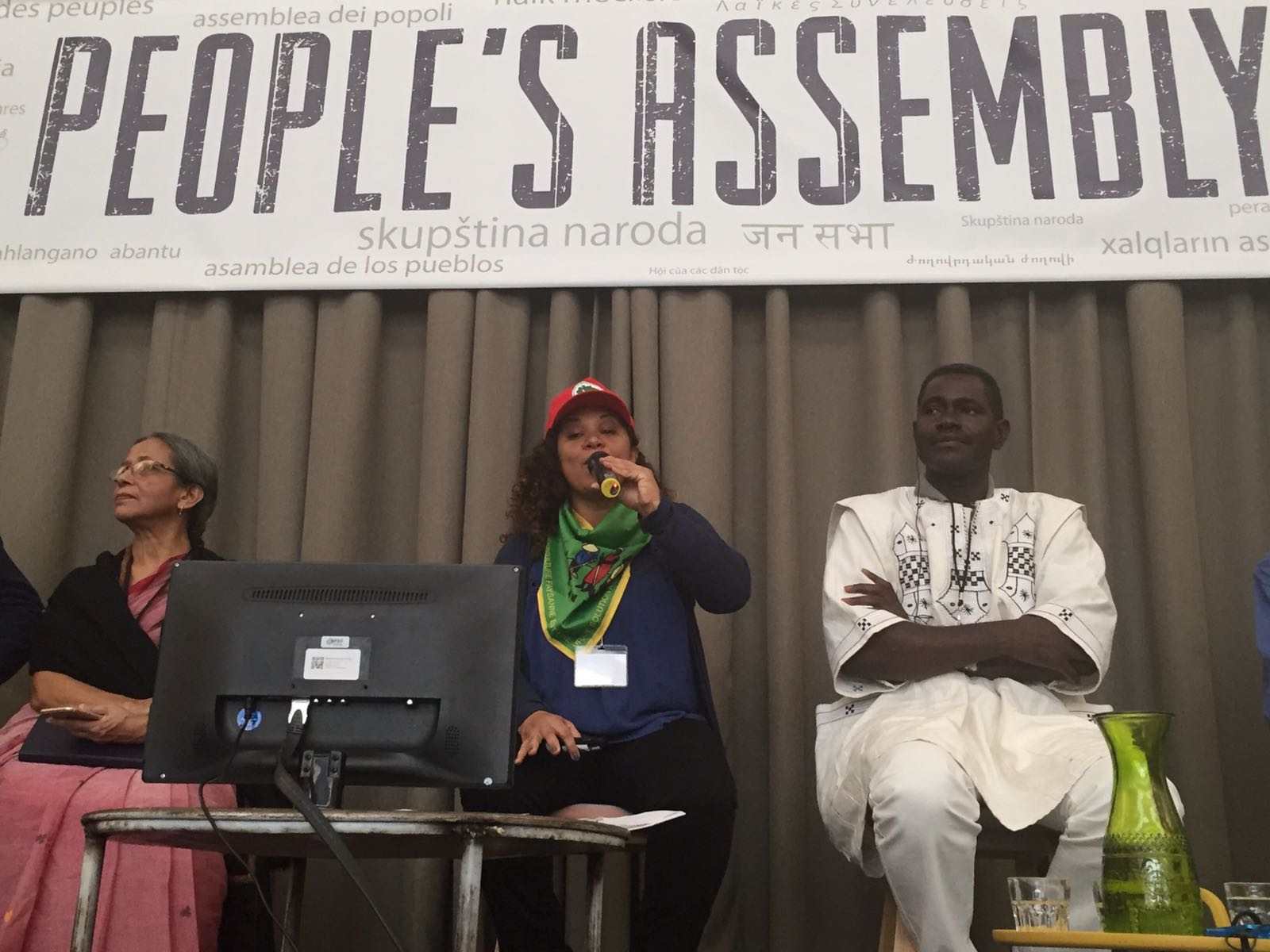
Intervention by Brazilian activist Nivia Silva (Movimento Sem Terra):
“The form of governance in Brazil, I’m afraid, has fallen apart. What used to be an alliance between the people and capital has fallen apart. The coup that has occurred in Brazil is a result of the interest of the bourgeois which has led to this new neoliberal government. In this context, production of rice and beans has gone down by 41% and 40% respectively while mass production of soy has skyrocketed. The impact this has had on farmers has been a new form colonization, repression of their economies and a decrease of the production of their basic goods. Moreover, tha quantity of agricultural land is also disappearing against this backrop: 50 years ago 36% of land was in urban areas and the rest in rural areas, now 85% urban. Huge areas of land expropriated from farmer communities are now cultivated with GMO (44.2M hectares). While, 64% of food in Brazil contains pesticides or fertilizer, in Brazil Monsanto sells 23 agro-chemicals that have banned in the European Union. We want to say that this is no longer acceptable. We no longer want to use agro-chemicals that are trash and not accepted anywhere else”
“On behalf of La Via Campasina we want to say that this is an international battle because our governments and the production of our food is owned by these companies. Our countries cannot handle this because the companies are bigger than them. As farmers we have rights, we need to put in to place systems that can stop them because it is no longer acceptable. In conclusion, I believe as international farmers we need to have solidarity among us, while as traditional farmers we need to take back control of our land, our seeds and our businesses. “
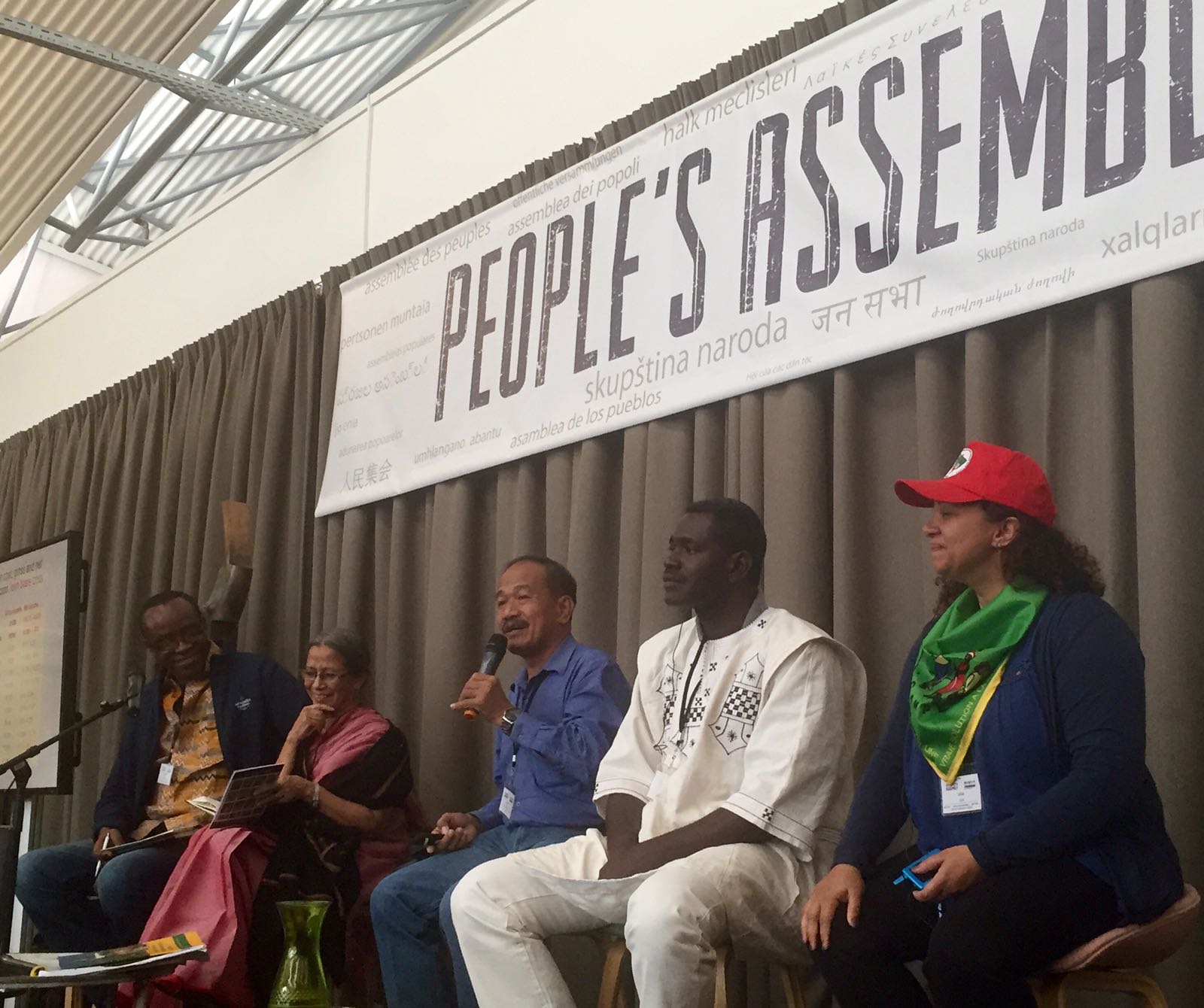
(left to right) Nnimmo Bassey, Farida Akhter, Charito P. Medina, Ali Tapsoba and Nivia Silva
Charito Medina: “The only counter check to multinational corporations is civil society, farmers and consumers. We must fight globally by acting locally”
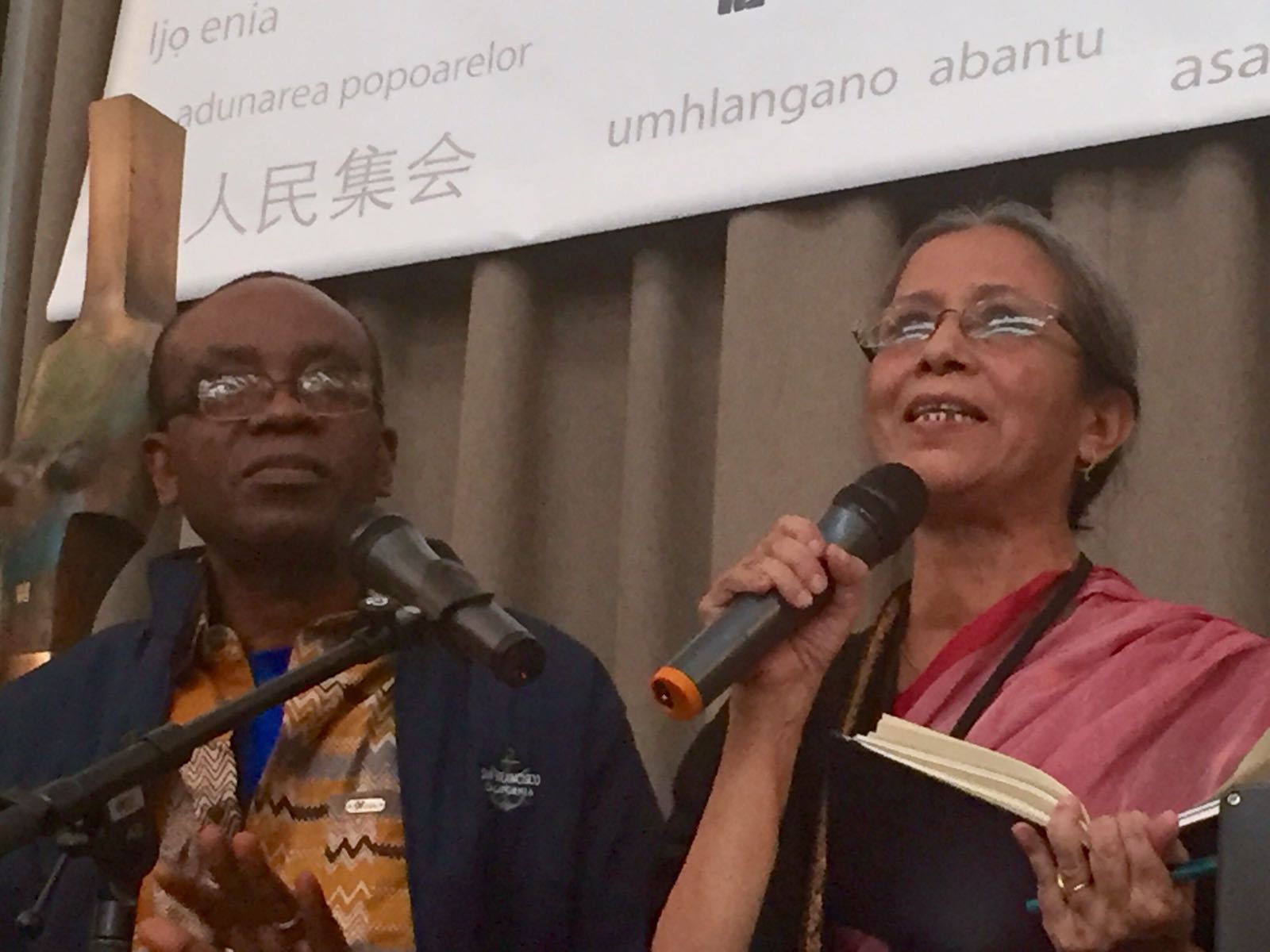
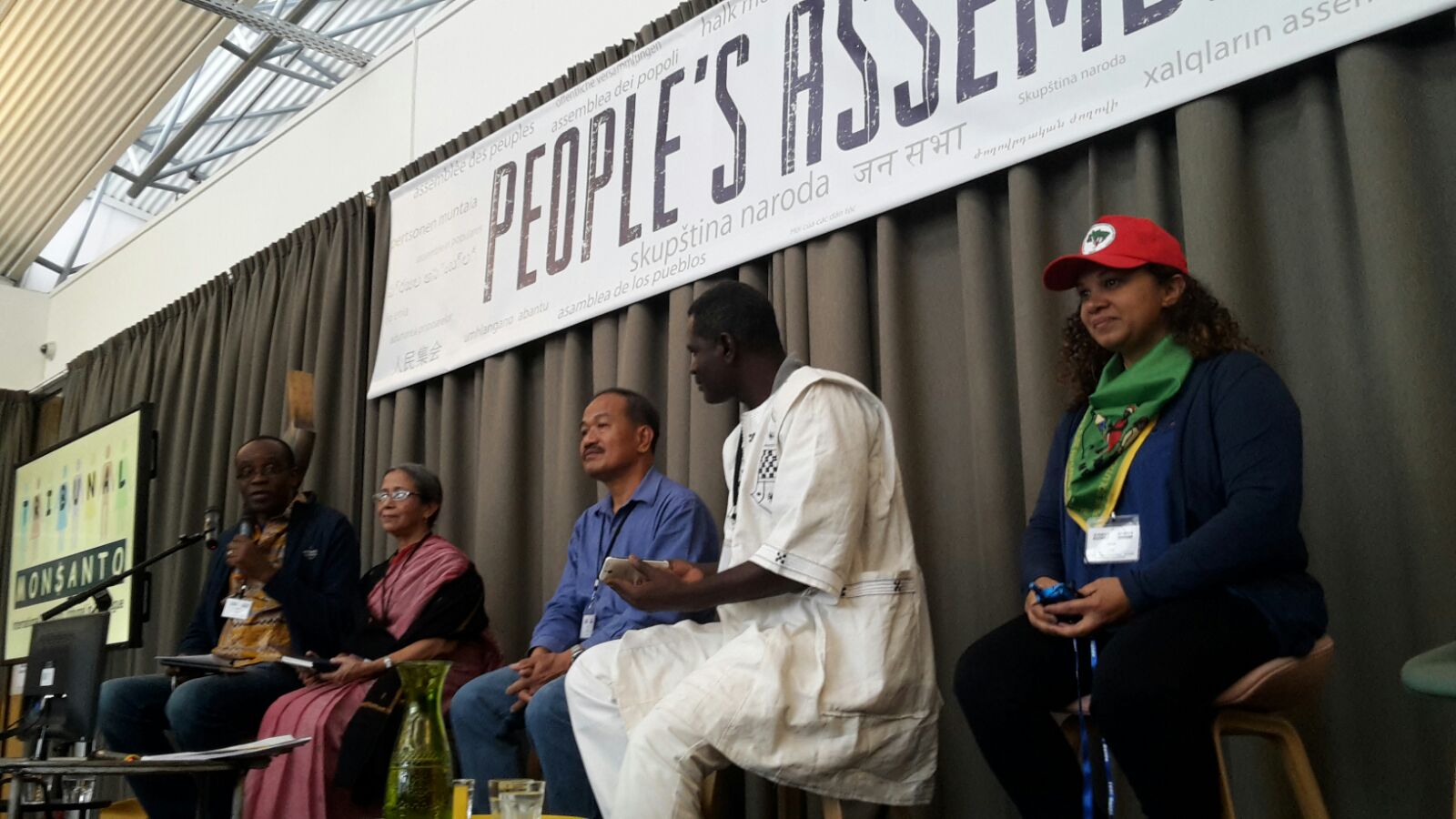
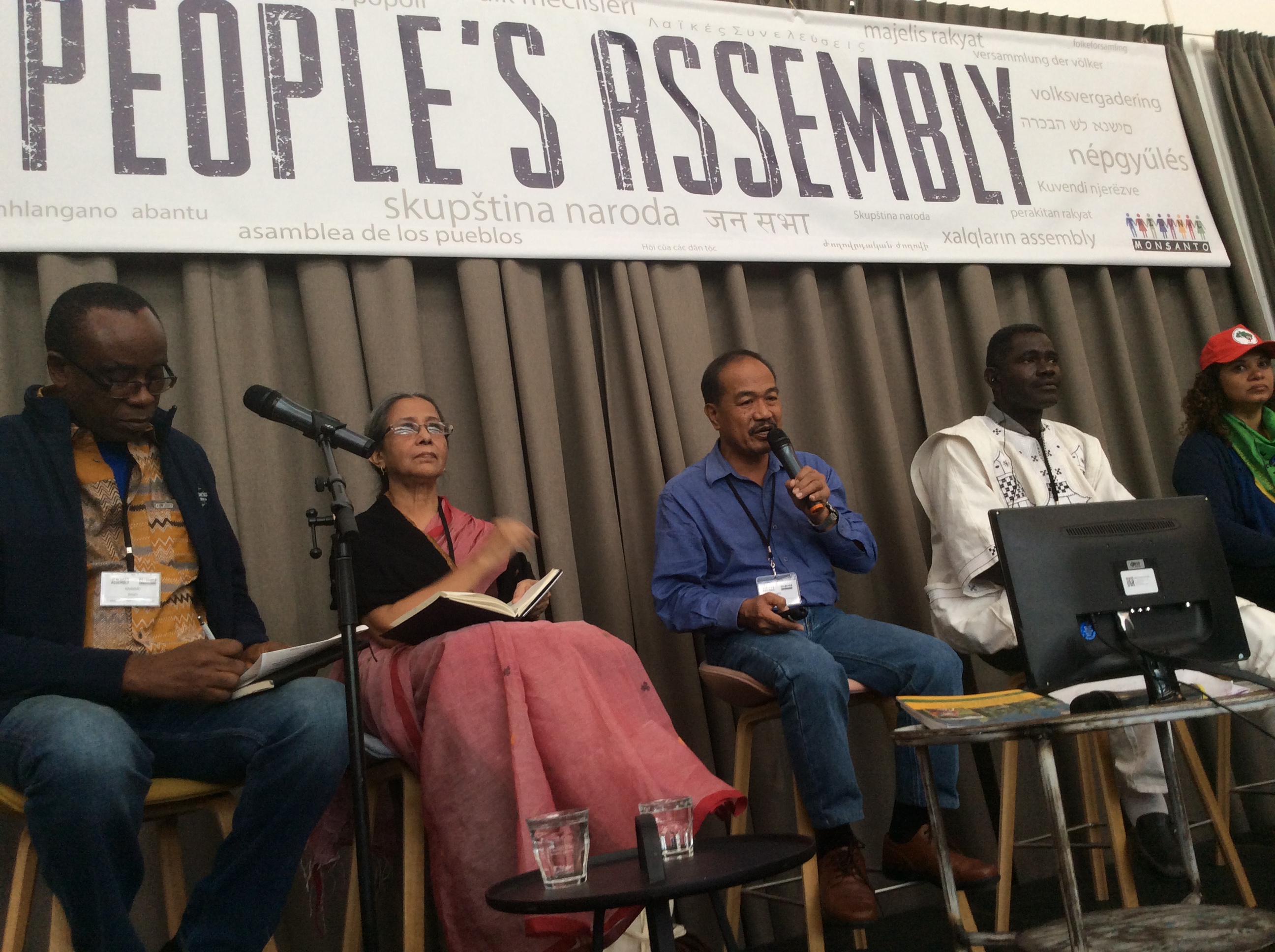
16.30: third session “Attack on Farmers and Farming” – Nnimmo Bassey (Nigeria), Farida Akhter (Bangladesh), Charito Medina (Philippines), Ali Tapsoba (Burkina Faso) and Nivia Silva (Brazil)
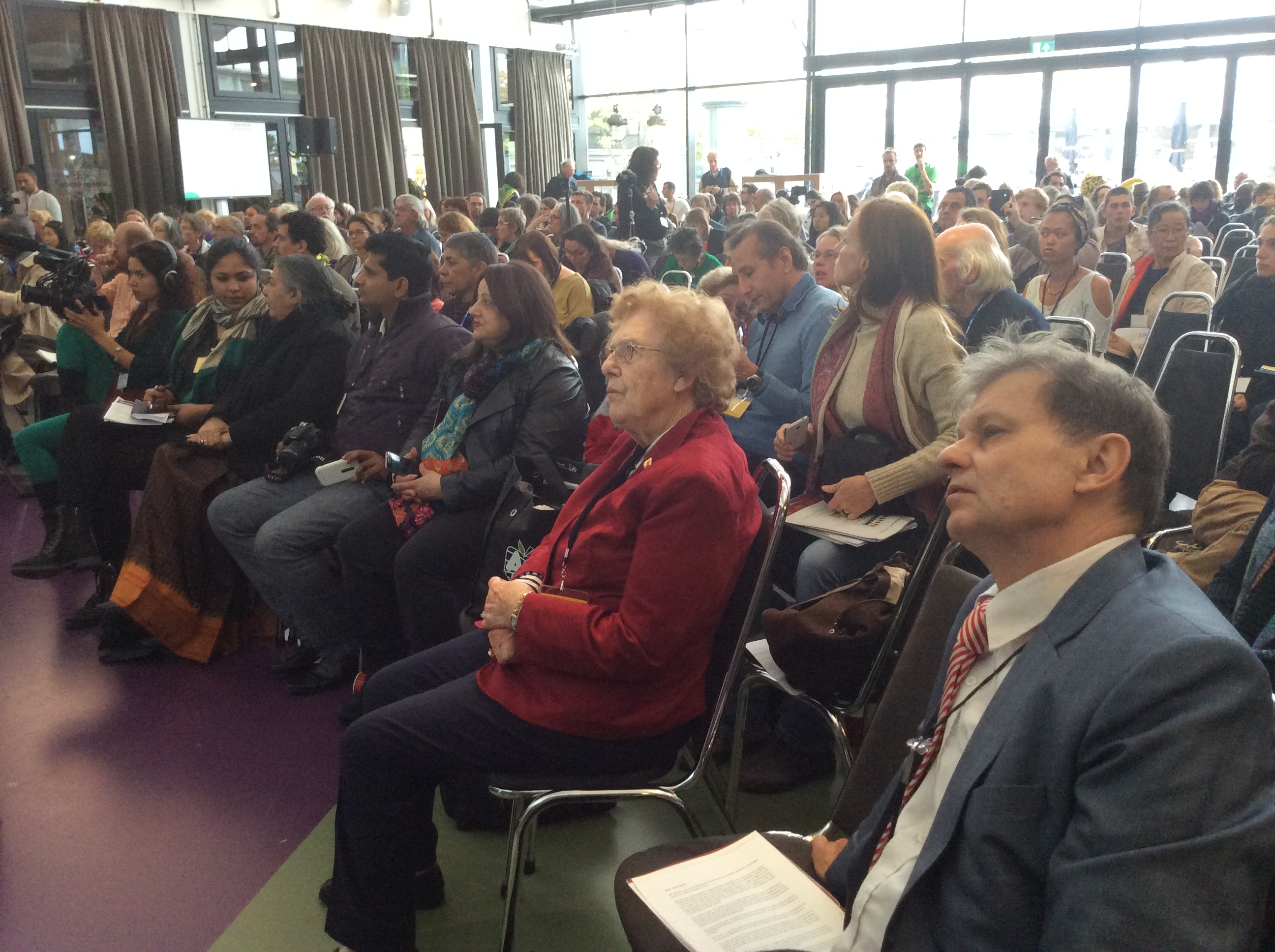
Audience attending the session: in the front row (right to left) Andre Leu (IFOAM), Mrs. Percy Schmeiser, Vandana Shiva and Ruchi Shroff)
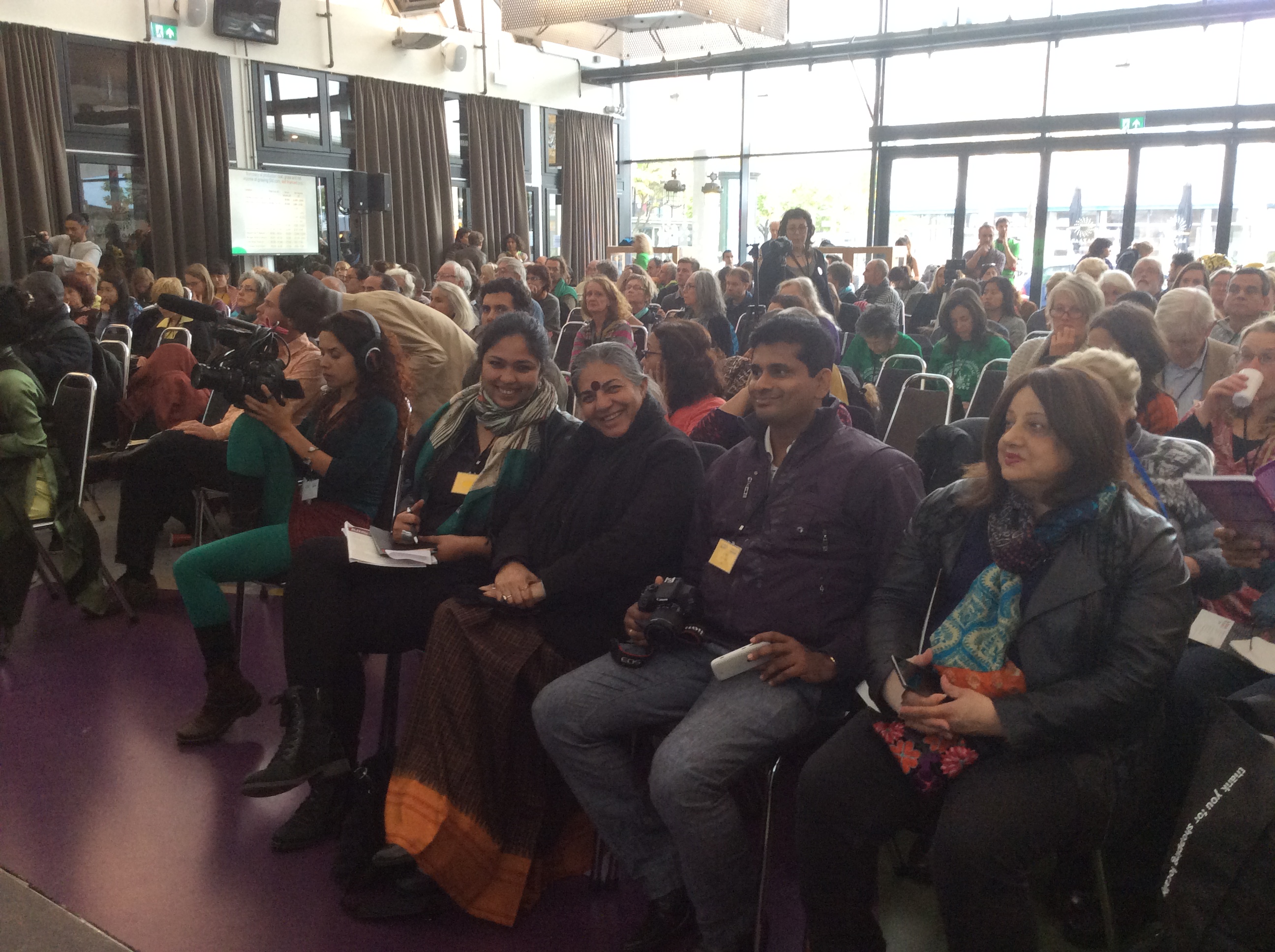
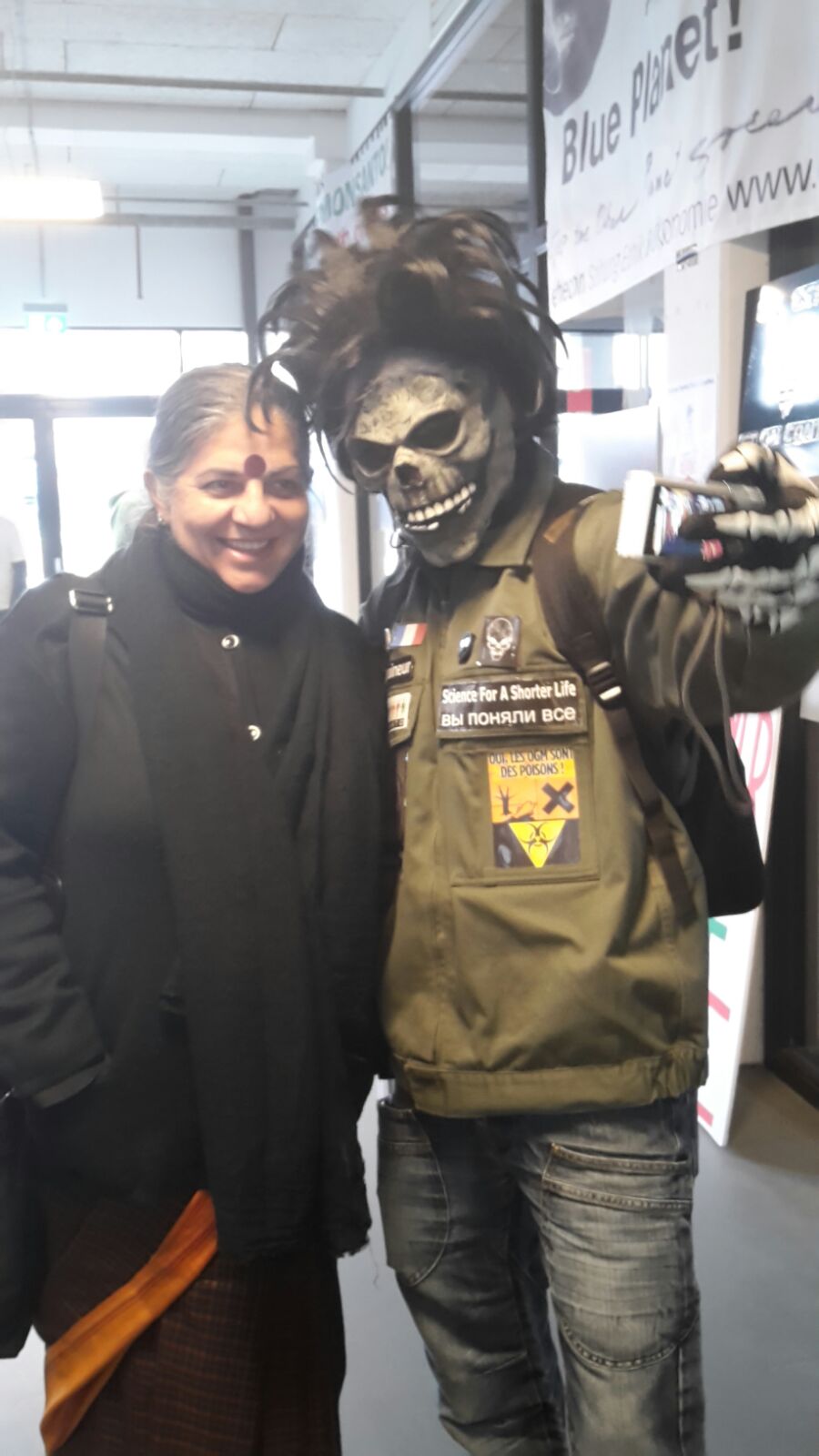
Dr Vandana Shiva with French activist Julien Calmeilles during a break between sessions
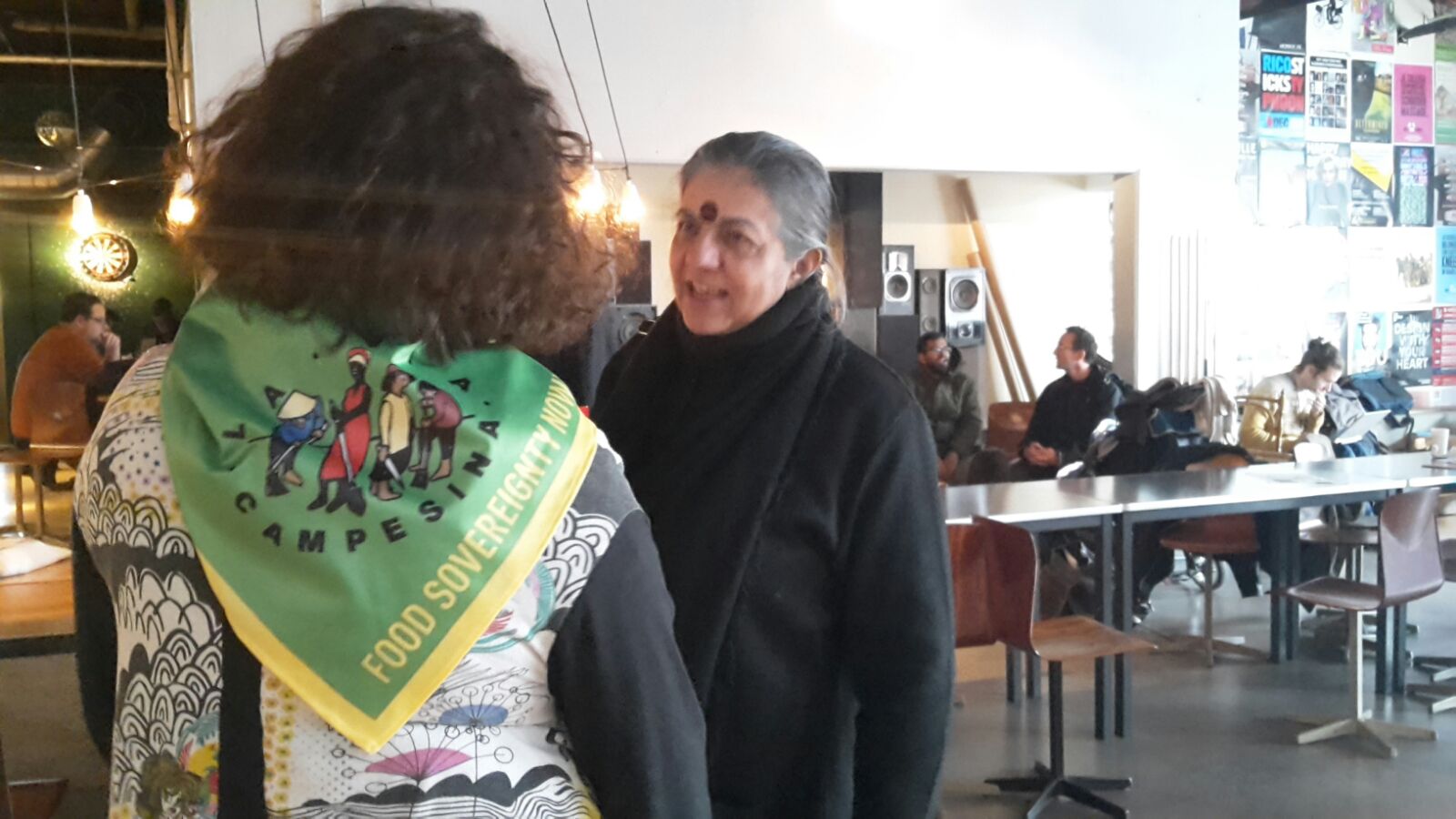
Dr Vandana Shiva with Sandra Moreno (La Via Campesina) during a break
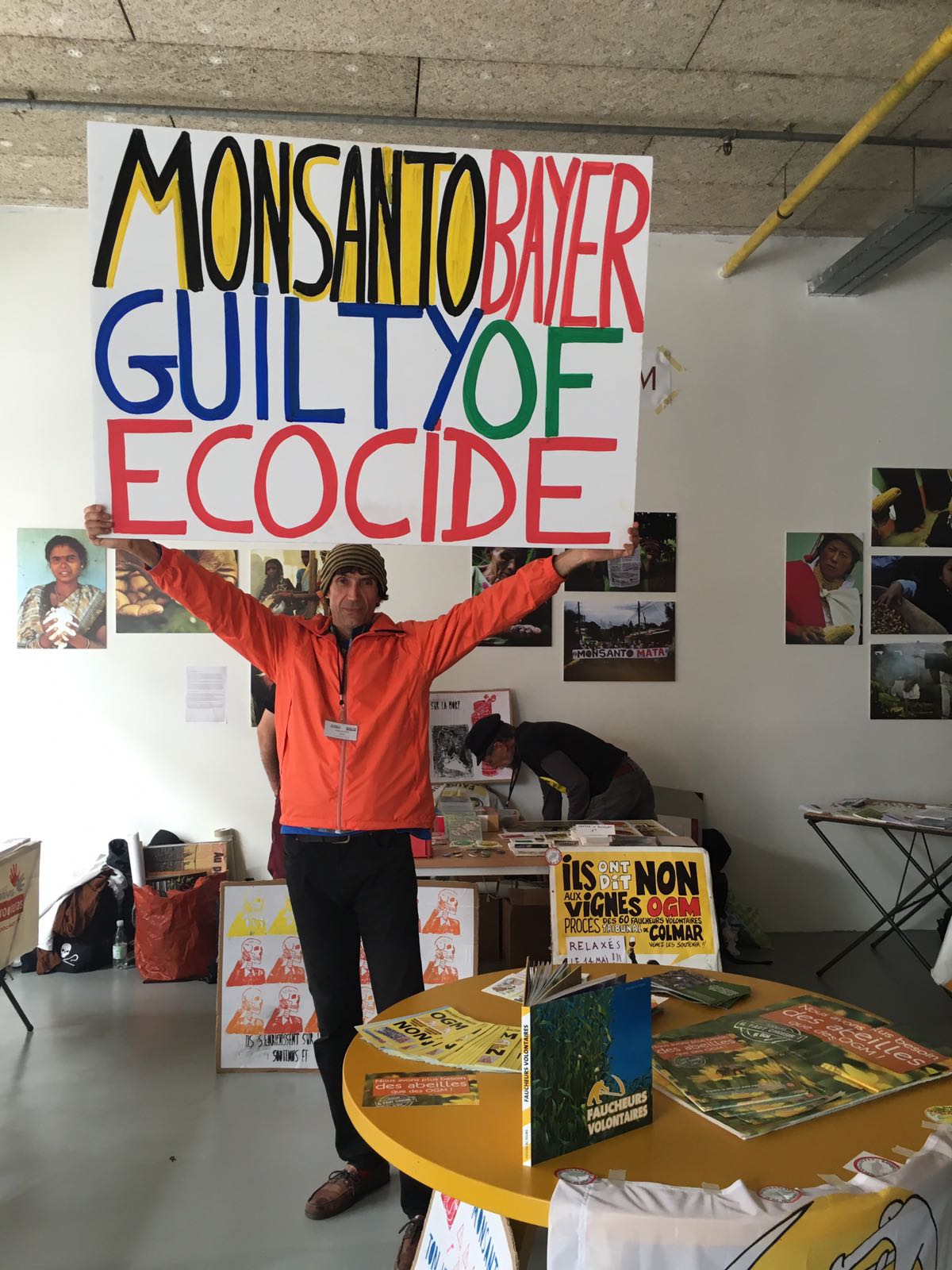
French activist Jean-Baptiste Redde in the stalls / photo-exhibition room
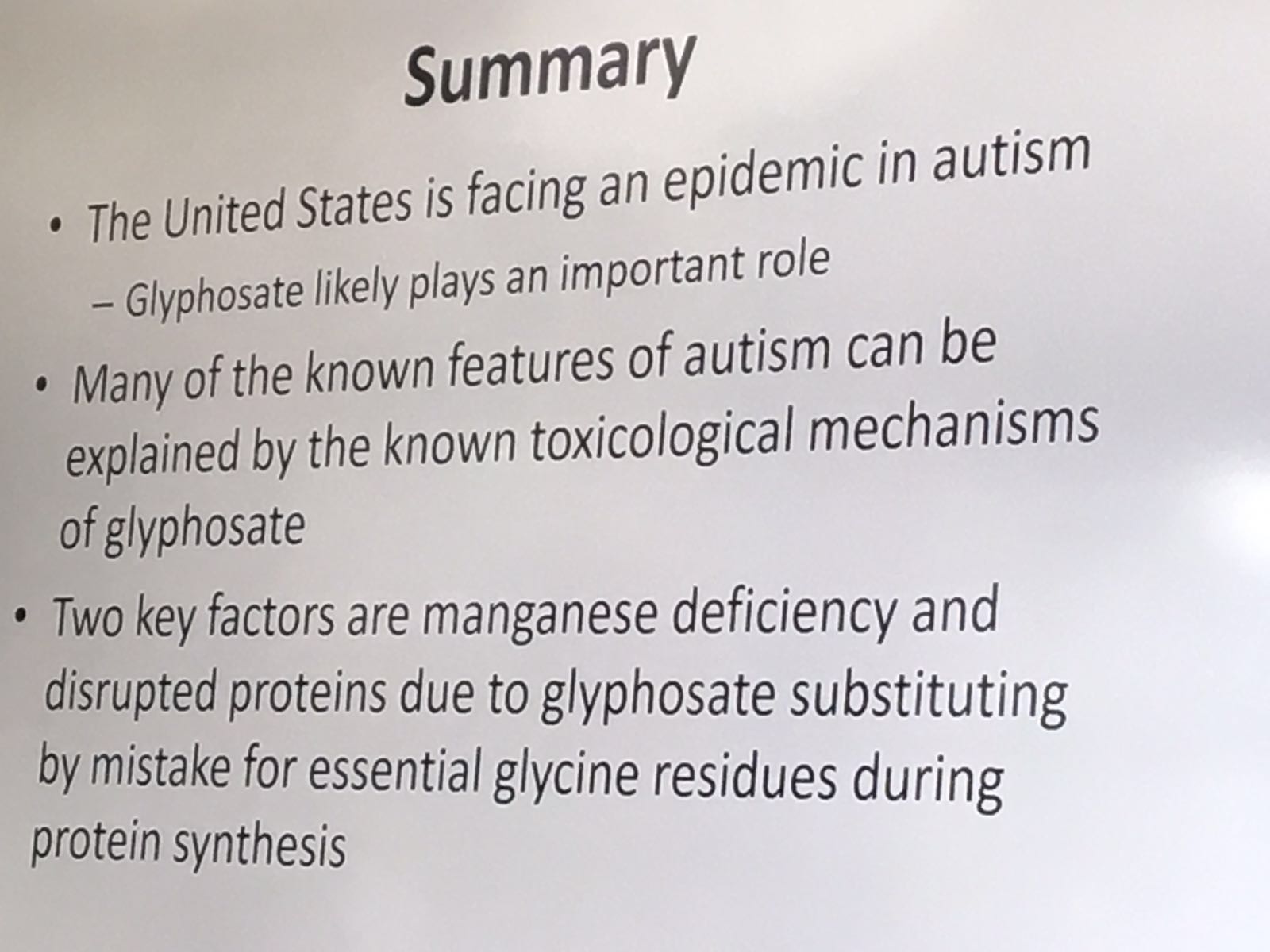
Slides from (Senior Research Scientist) Stéphanie Seneff’s intervention on the co-relation between toxics and autism during the second session “Poisoning Life”
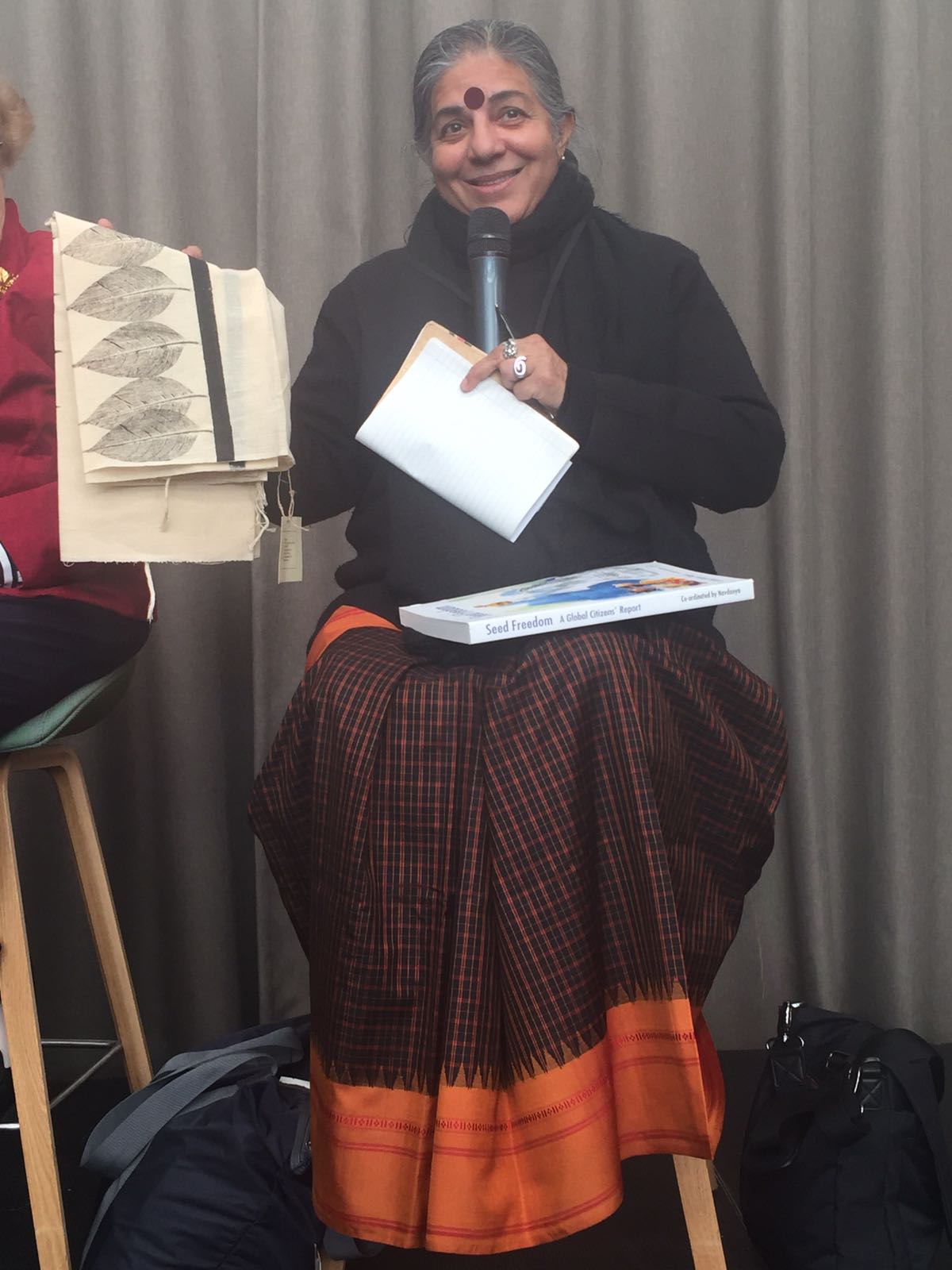
Dr Vandana Shiva, holding Navdanya’s 2012 Global Citizen’s Report on Seed Freedom, states:
“When rulers fail, it’s the people who defend freedoms. That is the ‘platform’. At the end of the day, the highest verdict is from the people. In our times, that verdict must come from people organized globally as a planetary alliance, because this is a global threat. This Assembly is seeding the future and laying out the future and it will not depend on how much Monsanto bullies, corrupts, and buys out our governments, it is about our consciousness against these crimes and what we do about it, and that is what we are here to build”.
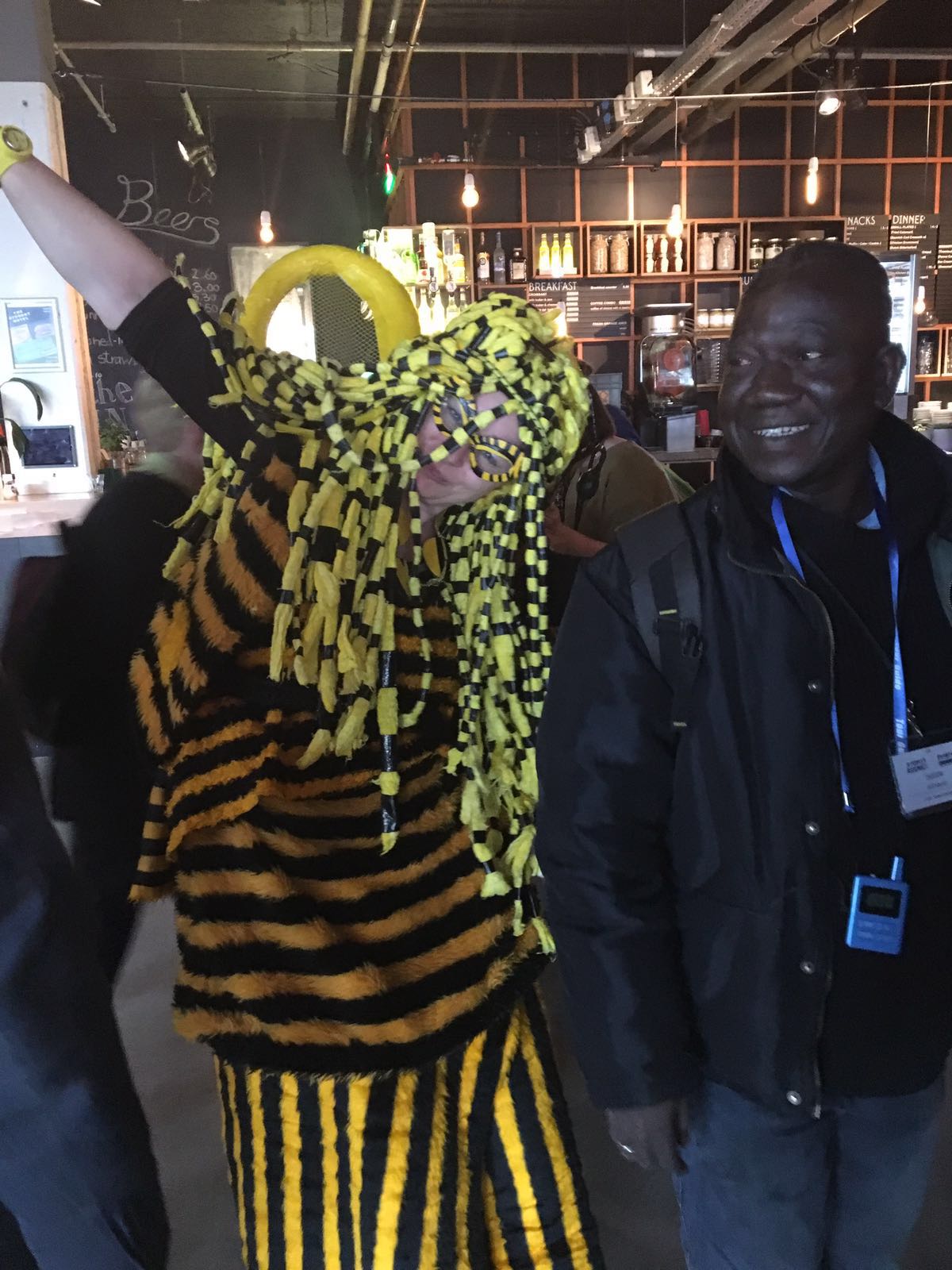
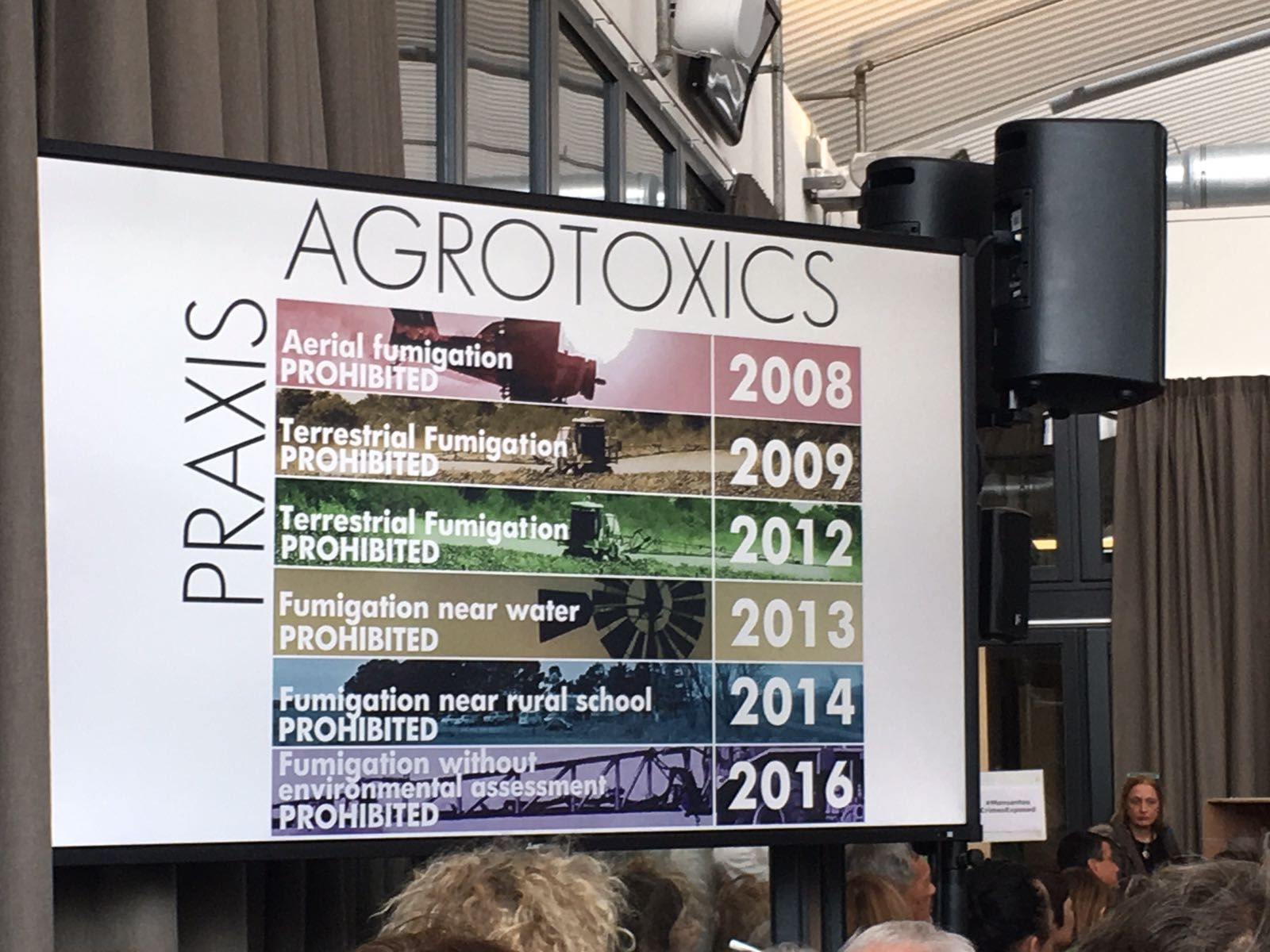

Marcelo Firpo: “It is impossible to produce monocultures without destroying biodiversity. The problem is the relationship between agribusinesses and politics. Agribusinesses needs non democratic regimes in order to be allowed to violate human rights. Health, for example, is not a question of contamination, health is a human right, health is justice, health is the right to our future. I want to underline this because real figures can be 50 time higher than official data on cases of deaths from agro-toxic poisoning. Currently in Brazil many rural areas have an index of cancer higher than in urban bases and the most important factor is the high exposure to agro-toxics. Moreover, Monsanto currently have 5 agro toxics with 3 active ingredients in Brazil that are not allowed in the European Union”.
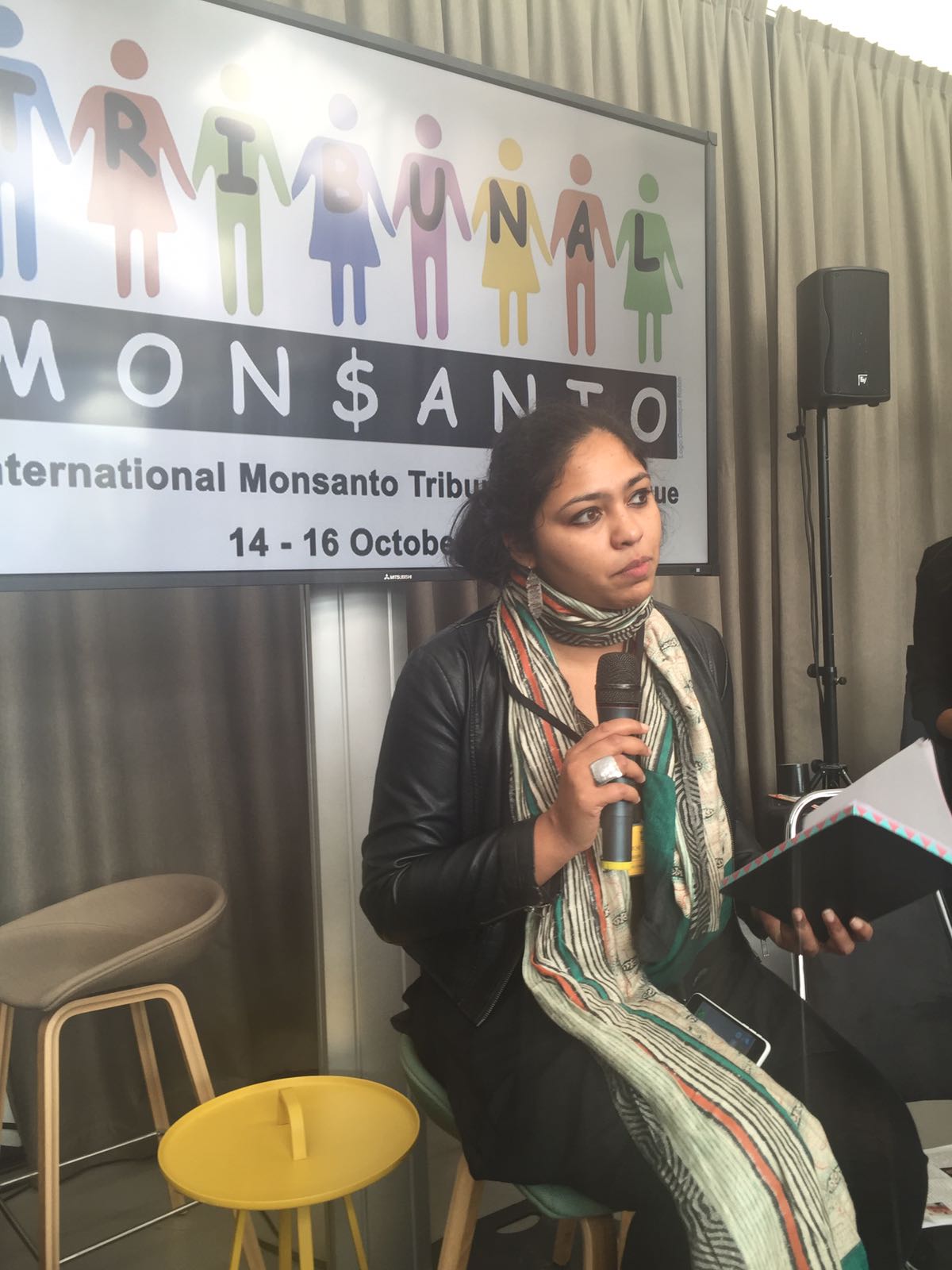
15.00: Ruchi Shroff, director of Navdanya International, opens the second session “Poisoning Life”
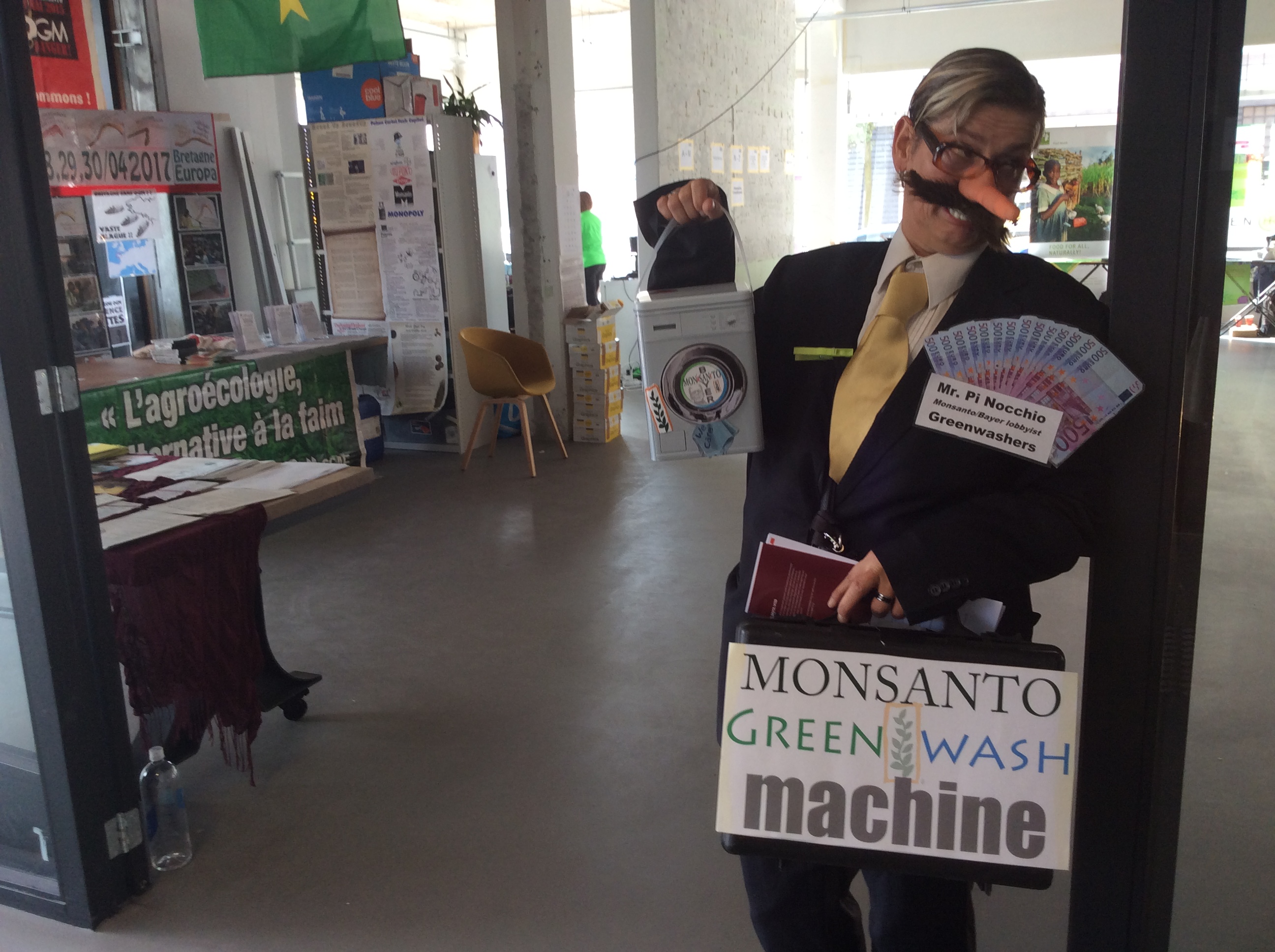
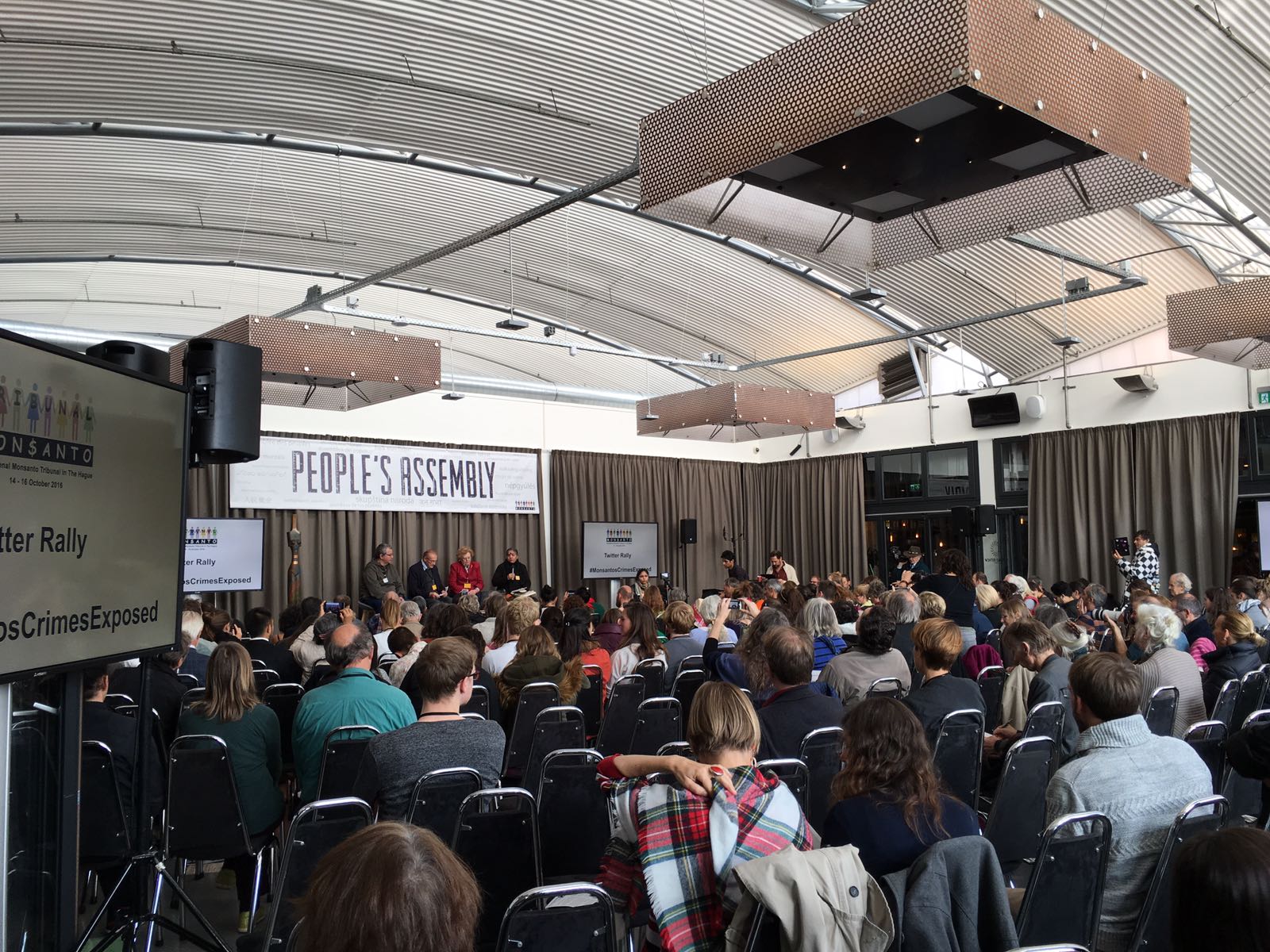
Fernando Cabaleiro (cont.):
“In May 2016 Monsanto was notified of this decision. Monsanto appealed in the Supreme Court of Argentina. We as part of our work plan decided to take part in this legal process and formed a network of fumigated villages physicians. What we request of the supreme court of Argentina is to have a public hearing and to have the status of de amicus curiae. That’s why we invited Vandana Shiva to help us in this fight and why we came here to help us fight in this legal process. There are more than 80 organizations and worldwide that have signed this petition to participate in this Supreme Court Judgement”.
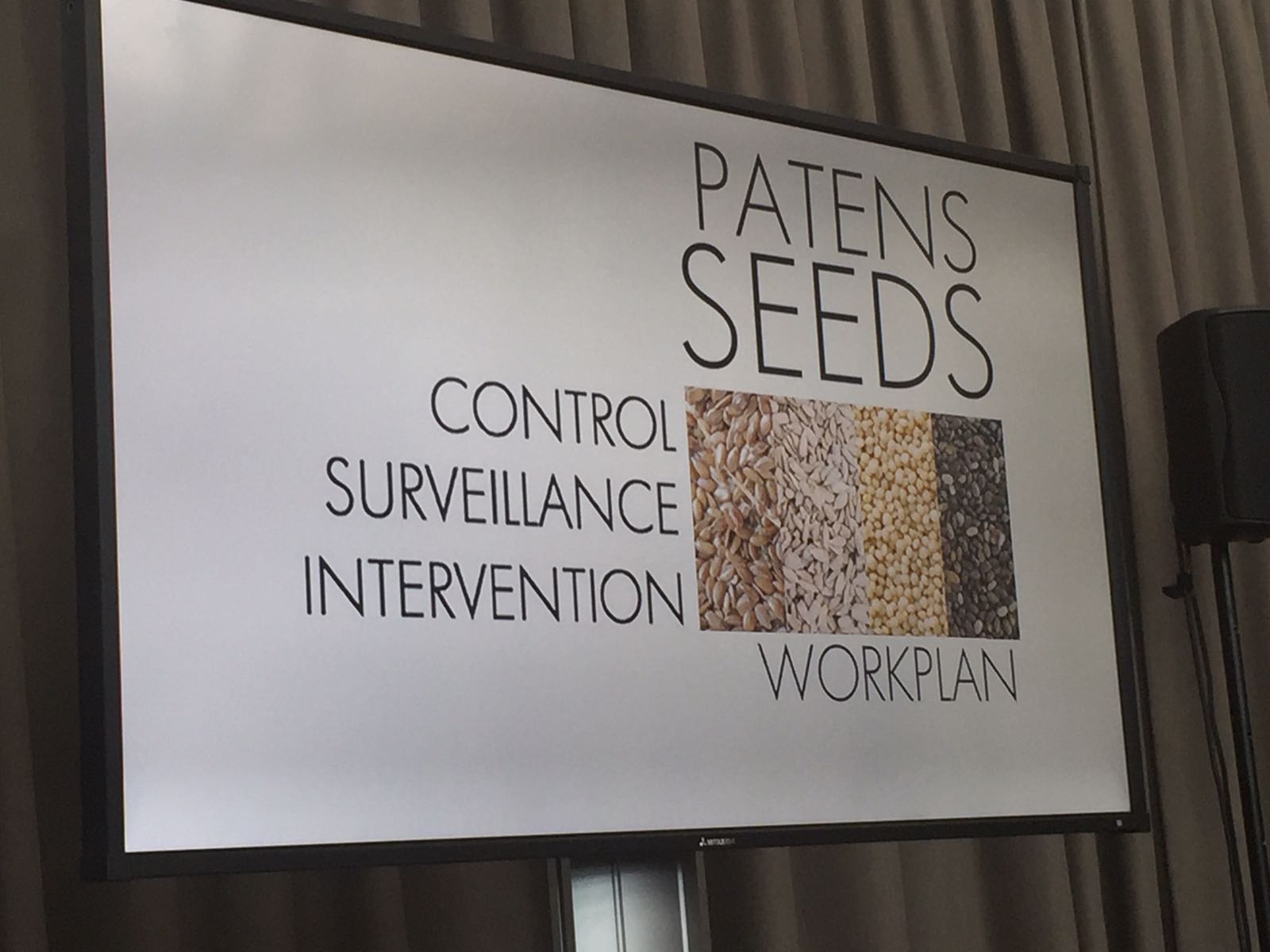
Fernando Cabaleiro:
“Seeds have historically had no patents, as plants were not considered ‘patentable’. Only products or processes from an inventive activity were considered acceptable to be patented. It was common knowldege that a product that can affect the health or life of people, animals, plants or cause serious damage to the environment should not be patented, as well as the idea that whole biological and genetic material can not be patented.
For the case of Argentina, we (Nature of Rights) have a working plan which consists of control, permanent surveillance of all case files regarding the patenting of seeds, and we are hunting down the files in which enterprises are asking to patent seeds: when we find such a file then we intervene. Similarly to other parts of the world, there have been GMO cases in Argentinian Justice, where Monsanto claims the recombinant DNA of a molecule.In 2012 the government granted Monsanto patents. The argument for this decision, ignoring expert opinions, was that seeds are constituted of micro-organisms which are allowed to be patented.
I say that Nature can be seen as structured in a 15billion year old language, we can only glimpse and see this language, but we cannot own this language”.

Fernando Cabaleiro, Argentinean attorney and activist, recounts his experience as part of the Citizen Coalition against Monsanto’s claims to patents on life in his country:
“Agro-industry in Argentina, like in other countries, has changed agriculture from producing products to producing commodities”. As the price of commodities rise we see a chain reaction of negative consequences for health and our food and social and economic consequences. Land grabbing of the indigenous people. We see also an increase in health issues, chronic diseases, cancer, From the agricultural perspectives, our first fight was against agri-toxics and the spraying next to houses and people. We have started legal procedures to fight against air spraying and land spraying and near rural schools. We have finally reached a juridical position where we have reversed the evidence. This means that agrotoxins vicitms do not have to demonstrate the damage, it means the corporations have to demonstrate that the chemicals are safe. We are also got involved with the other part, mainly GMO seed. We currently have two law suits against Monsanto and chemicals for the two new GMO seeds. Argentina does not abide by protocol which means it does not have a law that prevents GMO seeds. These products are approved by studies that Monsanto presents. In the case of the law suit against Monsanto in the year 2013 we requested to have access to studies presented by Monsanto. This legal measure was approved and we could actually see with our own eyes that these studies are just trash studies, we are still undergoing 2 lawsuits.
We are now looking into the second aspect – how industries want to appropriate life and own seeds. The main two enterprises are Monsanto and Bayer who want to patent seeds in Argentina”.
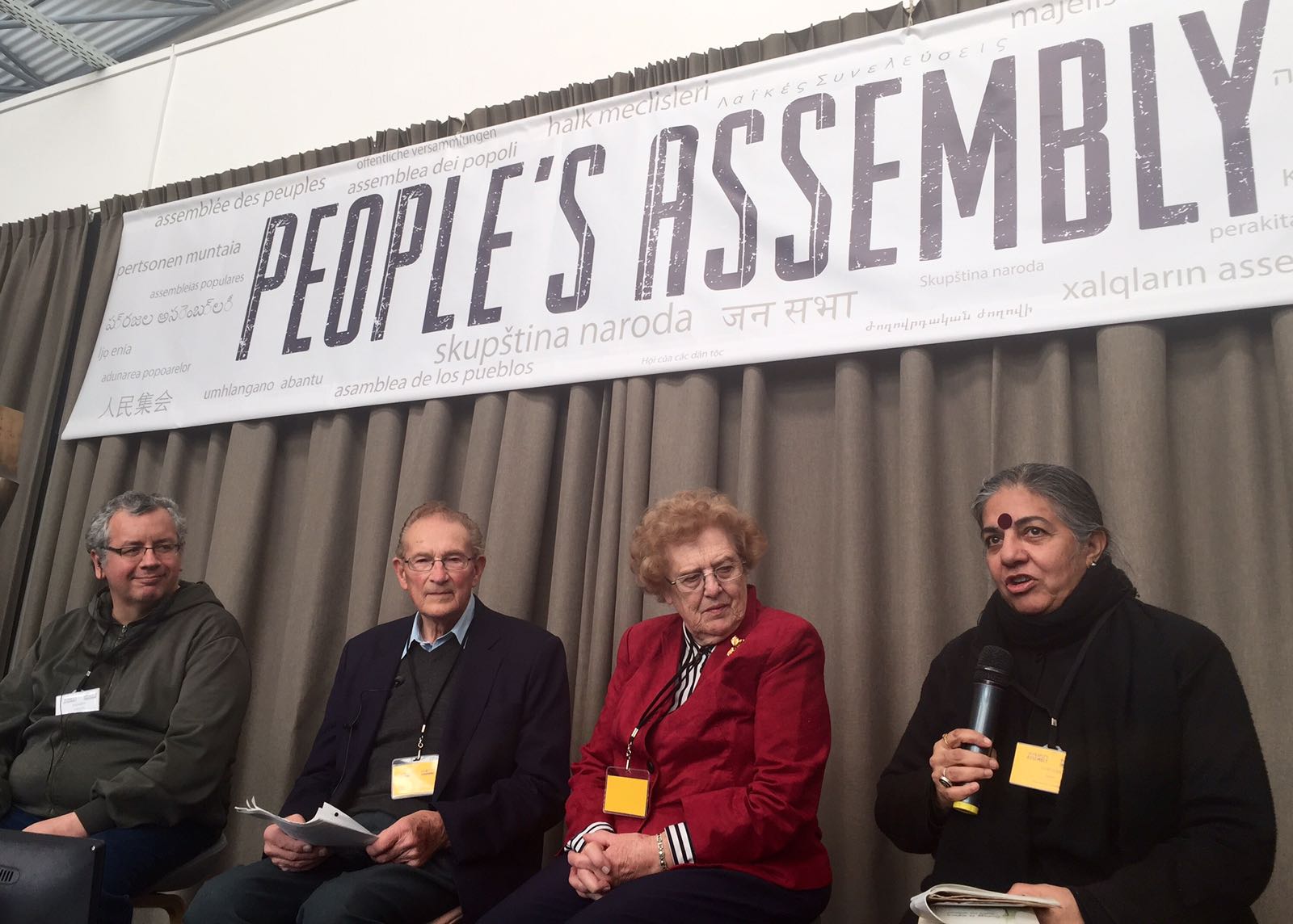
Fernando Cabaleiro, Percy Schmeiser and wife, and Dr Vandana Shiva
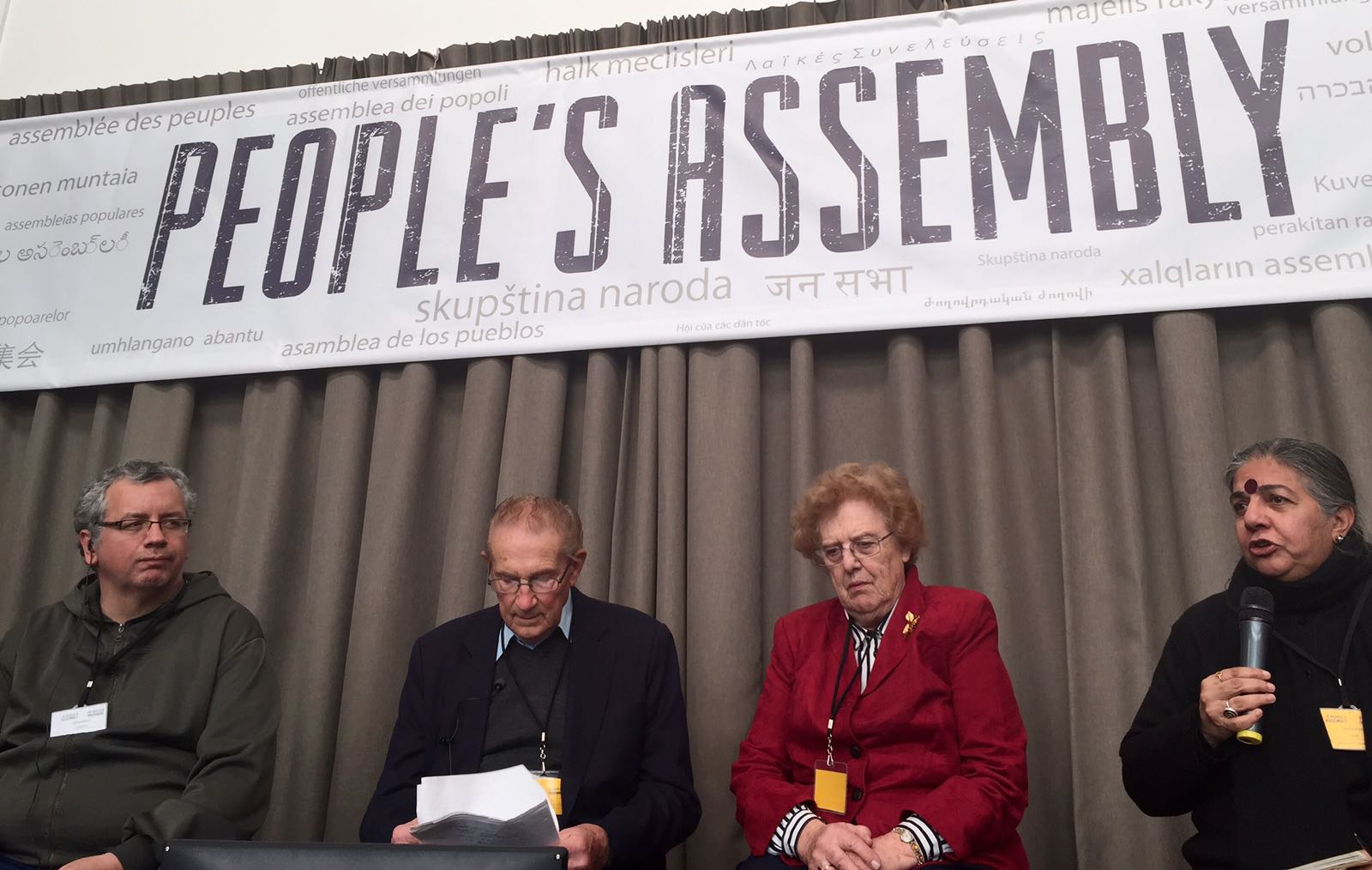
Fernando Cabalero (Nature of Rights Argntina):
“It is indisputable that Monsanto owns the patent rights to a material by the mere fact of having modified it; as it is indisputable that the author of a literary work does not become owner of the language he used in it by having registered it.” (referring to the forementioned Sentence of Chamber Federal Civil and Commercial of Argentina on GM patenting)
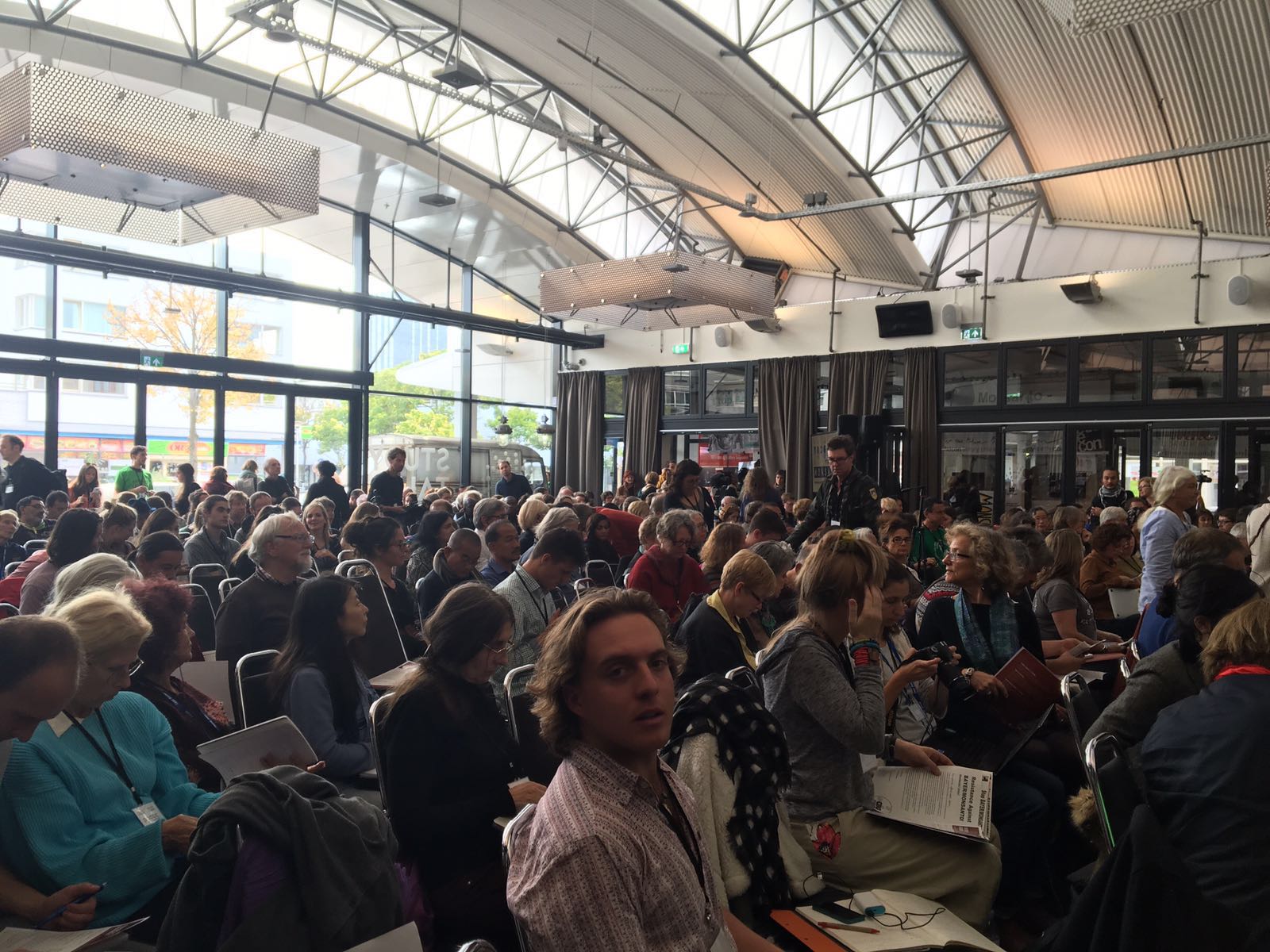

14.20: first session ongoing…
Dr Vandana Shiva: “The end of patents on seeds is not just a correction on Monsanto’s empire, it is a correction on the concept of empire.”
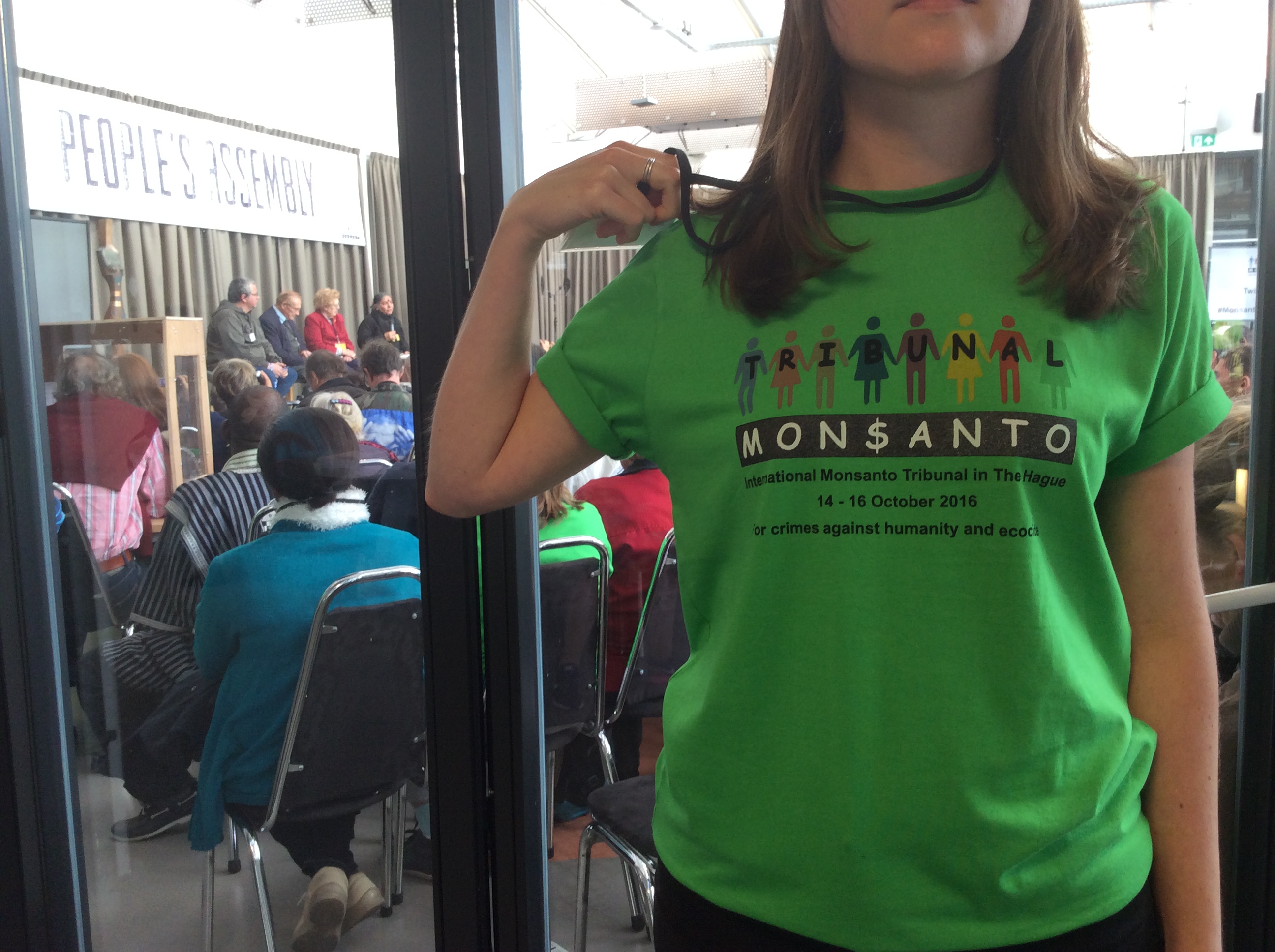
14.15: Monsanto Tribunal shirts distributed to attendants
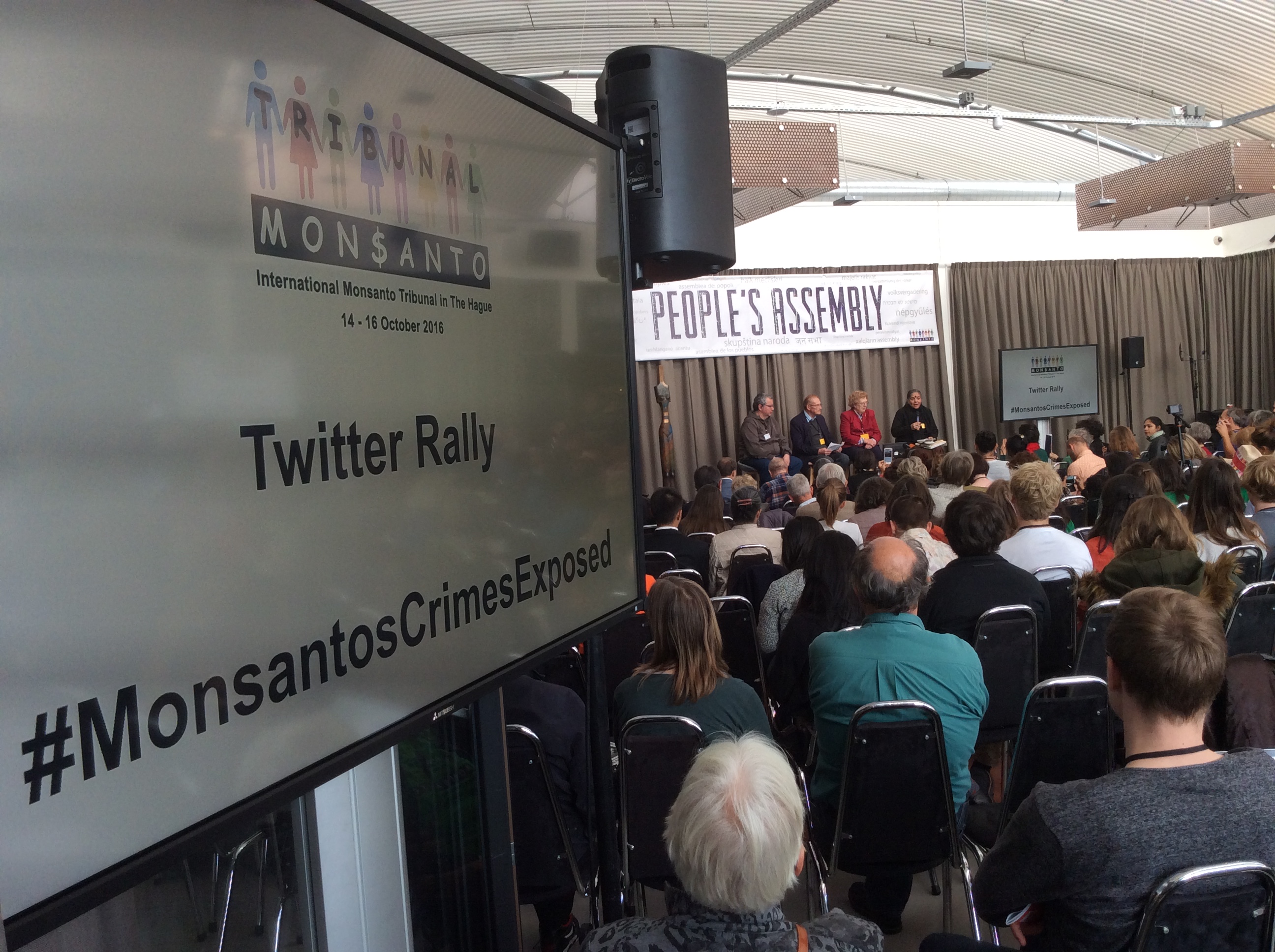
Fernando Cabaleiro (Nature of Rights Argentina) intervenes:
“Monsanto seeks to declare ‘unconstitutional’ the article in the Argentinian constitution that does not allow plants to be patented. It argues that the insertion of a gene that is inserted into a plant is in fact an invention and thus is patentable. In 2012, the first court granted Monsanto a patent. The argument of the judge, ignoring the opinion of the expert, was that plants and cells can be considered microorganisms. Argentinian law allows microorganisms to be patented. This ruling was appealed by the patent office of Argentina and the decision was repealed. The decision said the judge has disregarded the opinion of the expert and disregarded that plants are microorganisms. The chamber also said the insertion of a transgene into the genome of a plant is not an invention – it is an innovation – but not an invention”.
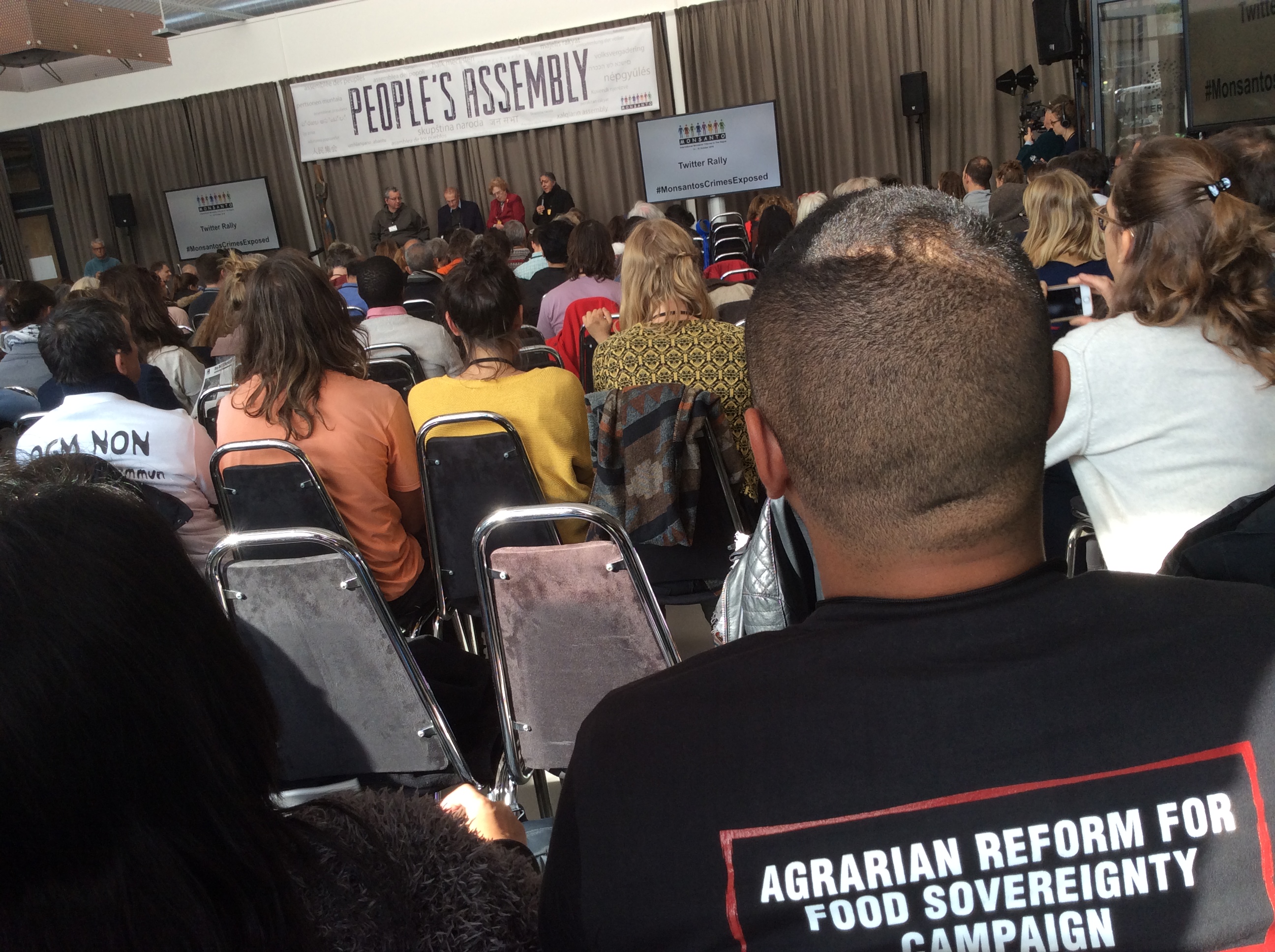
14.00h: Fernando Cabaleiro (Nature of Rights Argentina):
“We have finally reached a very important judicial decision. The victims no longer have to demonstrate the damage that agrochemicals have caused them, the culprits have to show that these chemicals are actually safe. In the case of the lawsuit against Monsanto in 2013, we requested to have access to the studies done by Monsanto. This legal measure was approved and we could see with our own eyes that these studies are just trash science”.
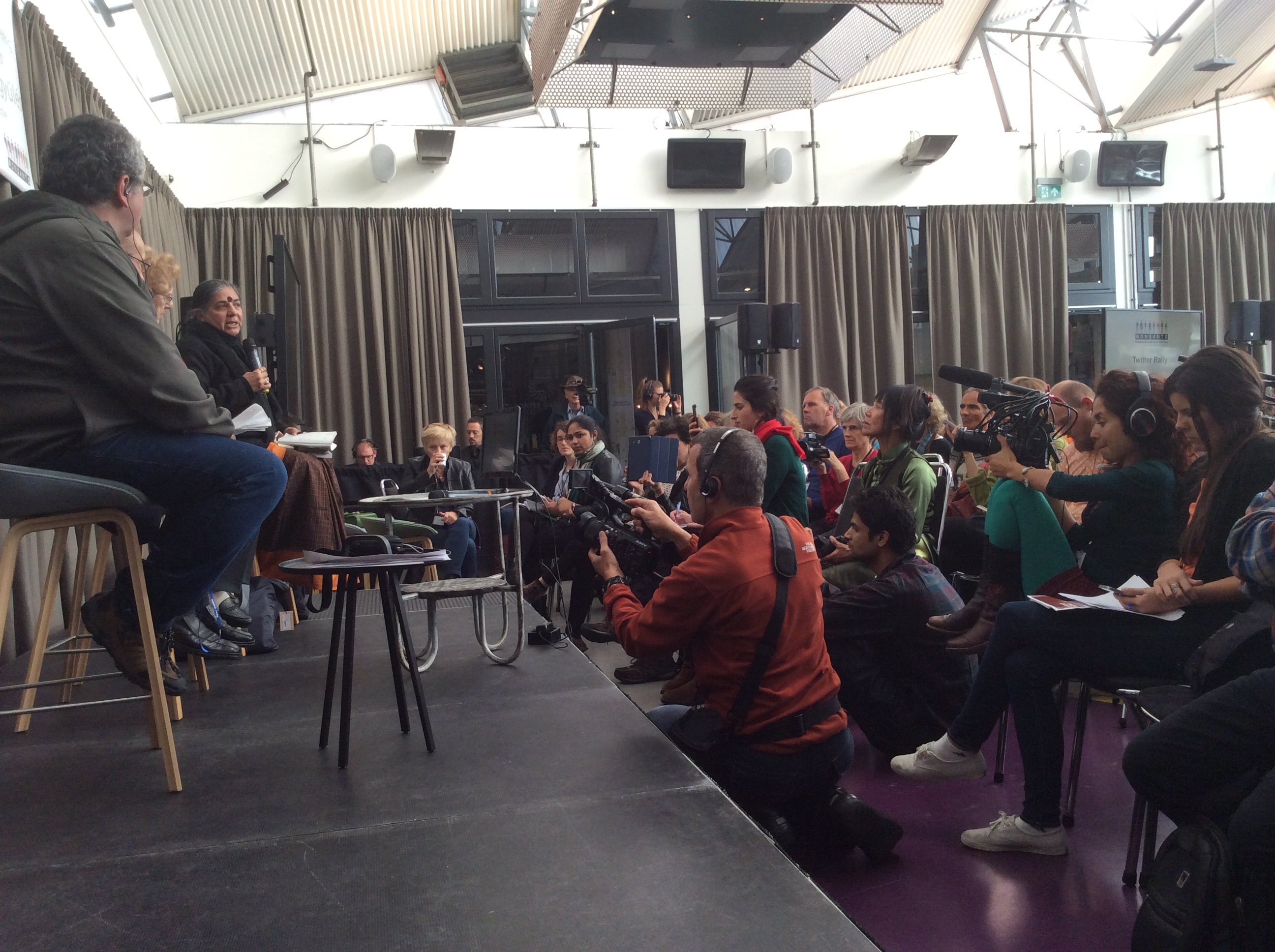
Percy Schmeiser:
“In 1998 said when Monsanto produced GMO Canola, we didn’t even know what GMOs were. We thought GM meant General Motors. Can you imagine the fear in a farm family when you get an extortion letter from a billion dollar company when they give you a letter telling them to send you $500K because they think you’re growing their patented crops. Monsanto would run advertisements in the paper saying if you think your neighbors are growing their crops without a patent contract, report them and we will send you a gift. The gift was free chemicals or a leather jacket. Believe me, there are not many farmers wearing Monsanto leather jackets in Western Canada.
We were known as seed developers in Canada, growing Canola varieties suitable for the climate In Western Canada. We stood up to Monsanto, it went to the Supreme Court of Canada after 12 years. The Supreme Court ruled that whereever the Monsanto patented gene is found, the higher life form is also patented. If you were contaminated with a patented gene, whether by wind or pollen fall or however, you no longer own your seeds, they become property of a corporation. How far can you go? What about a human life?”
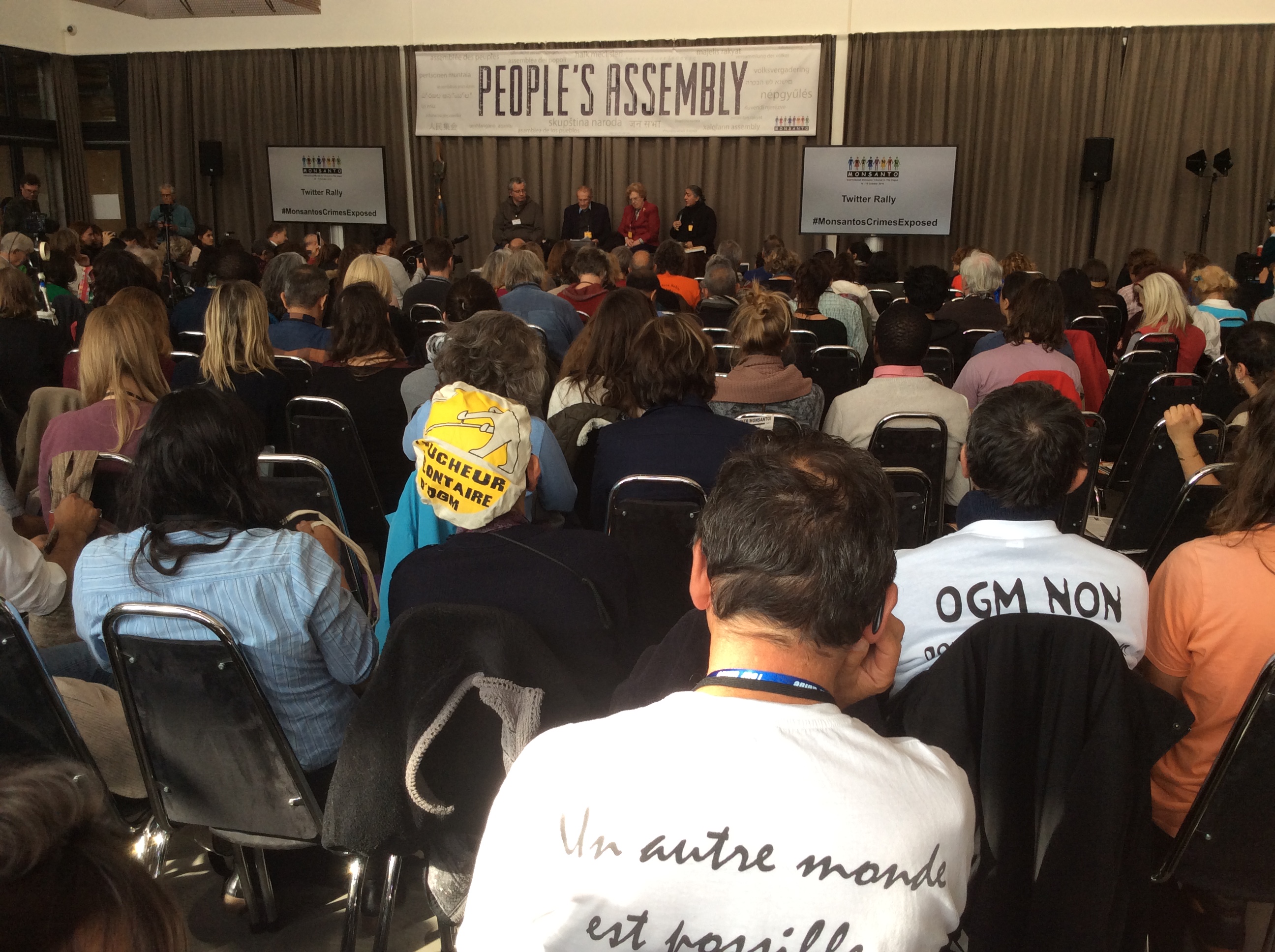
13.35: the fist talk session (Owning Life) has begun! Featuring as speakers Argentinean lawyer Fernando Cabaleiro (Nature of Rights), Percy Schmeiser and wife, and Dr Vandana Shiva
Percy Schmeiser:
“Come from the Western part of Canada, we never realized 20 years ago what would happen 20 years later. 1996 was the year GMOs were introduced in Western Canada. I refer mainly to four crops: canola, cotton, soya, and corn. The following economic issues were devastating, in terms of property law, the environmental issue – the mass of chemical introduction! Millions of tons of toxic chemicals were introduced when farmers were told they would not affect environment. Where we lived, Monsanto would also excercise a culture of fear by having their own police force in the local – Monsanto had an investigation force of 35 members in Western Canada.. You tell me why a company like Monsanto needed their own police force to inspect local farmers?”
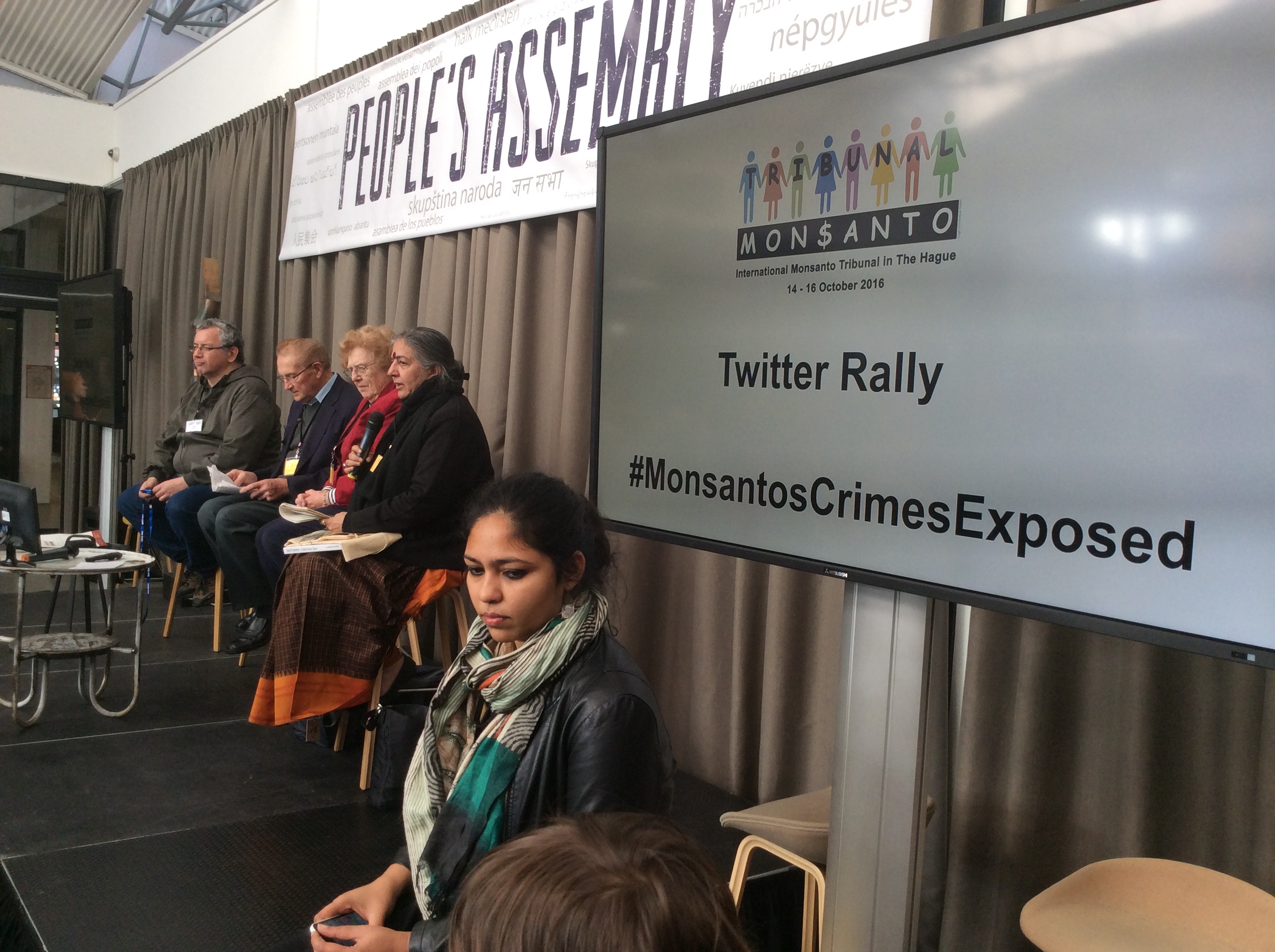
13:35: the first session (Owning Life) has started – time for Twitterstorm #MonsantoCrimesExposed
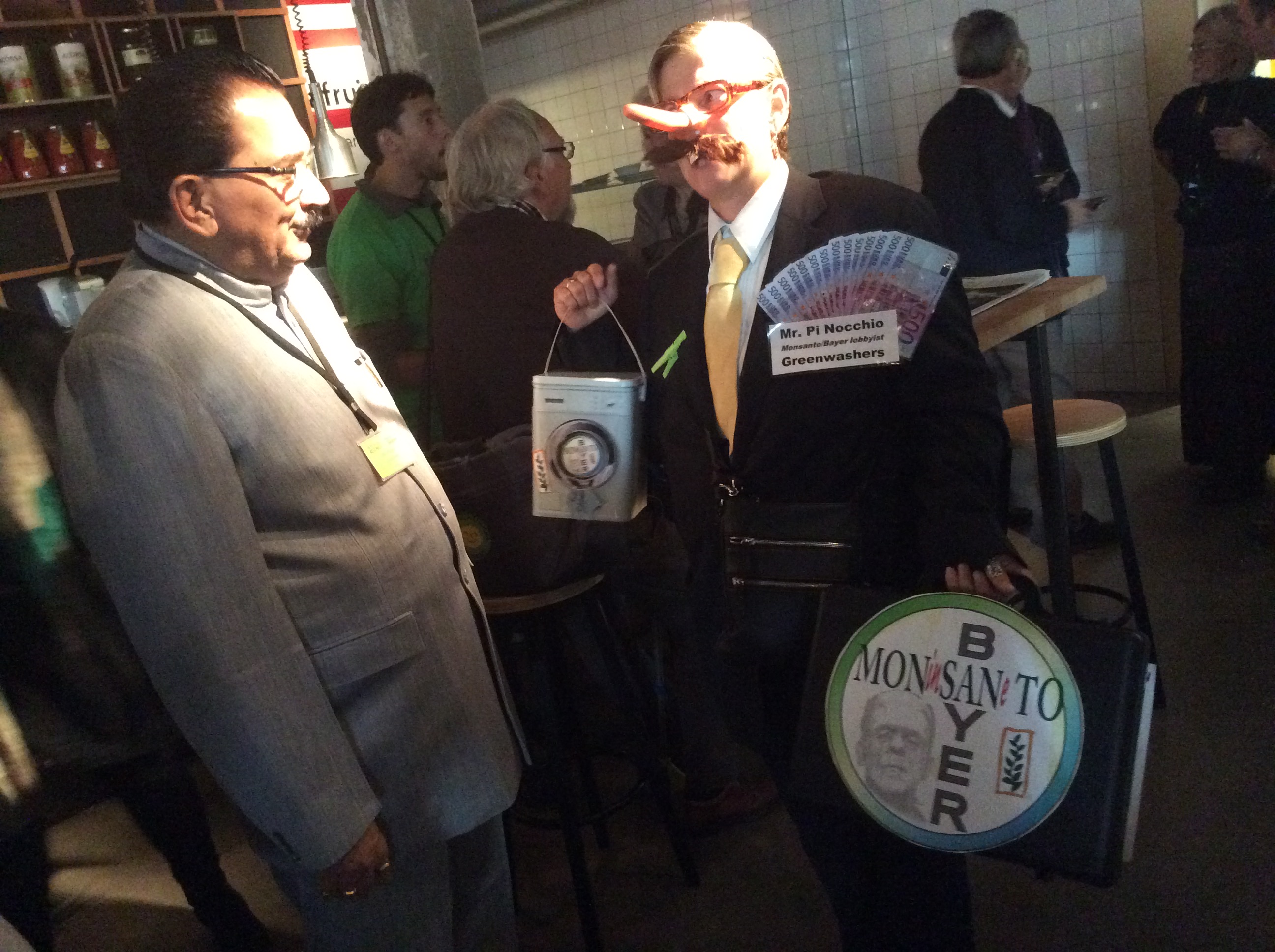
13.25: Krishan Bir Chaudhary meets Monsanto again…
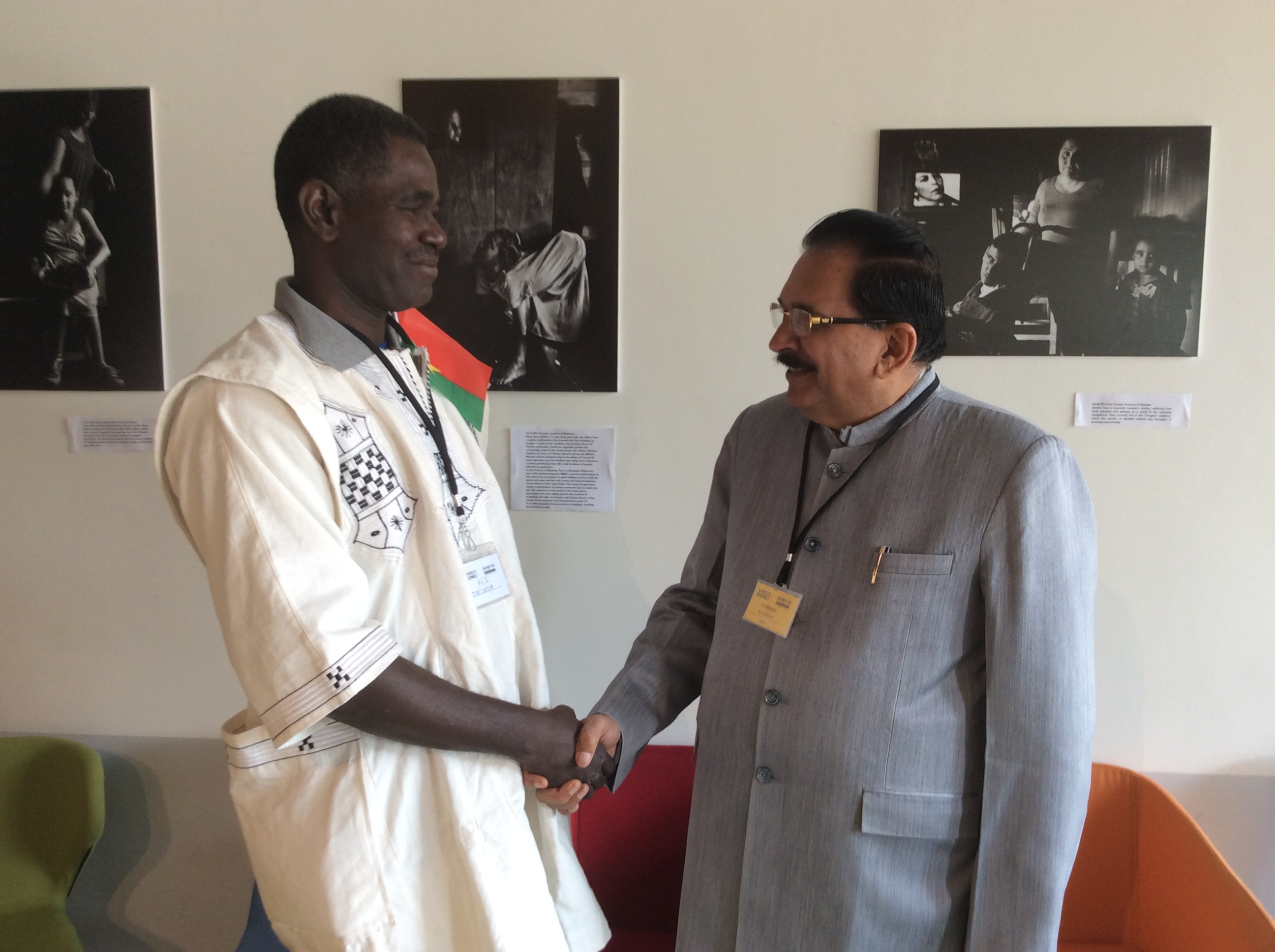
13.20: Burkina Faso and India; different countries, same problem: Bt cotton…
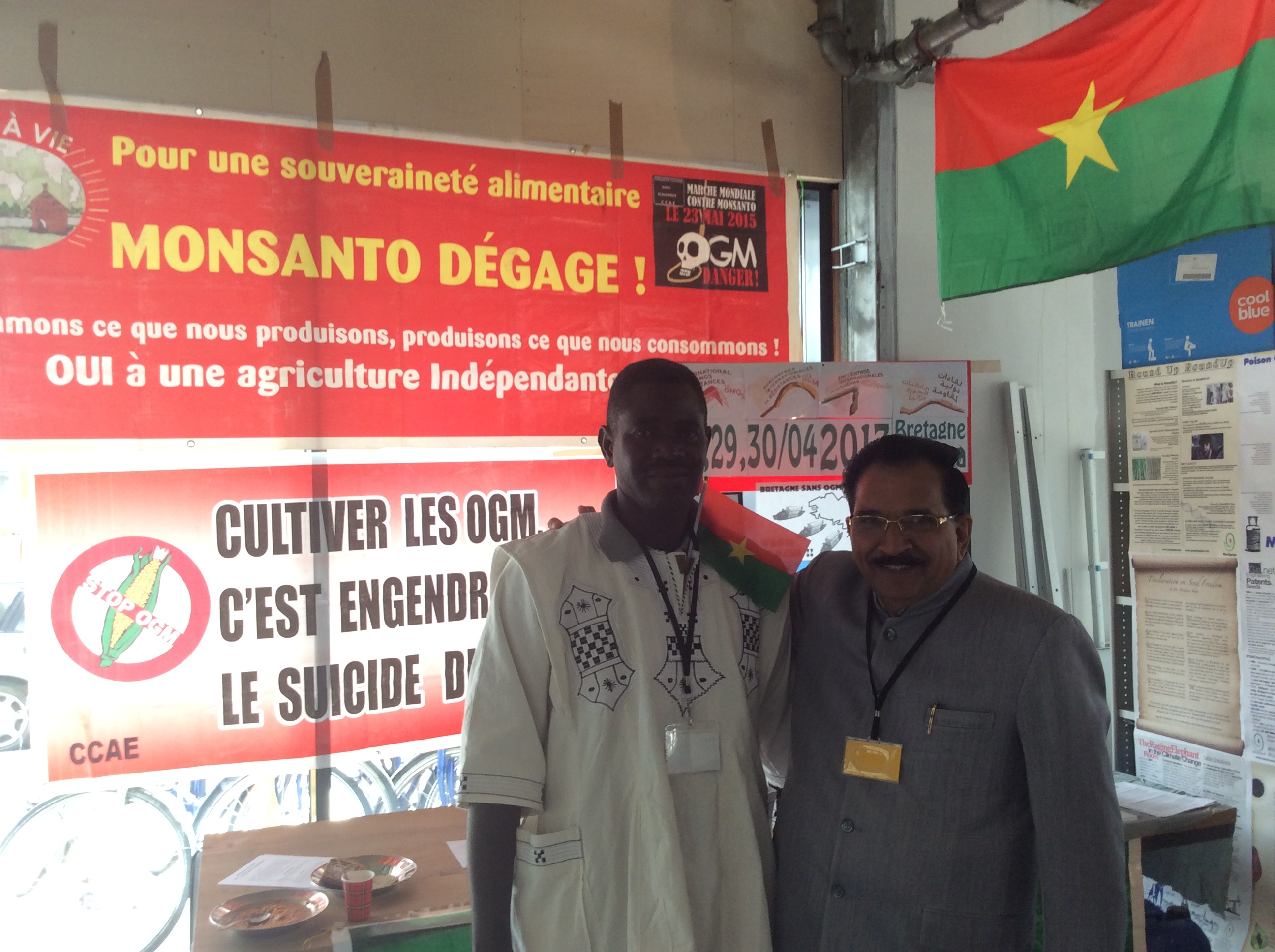
13.15: Ali Tapsoba (Burkina Faso) and Krishan Bir Chaudhary (India)
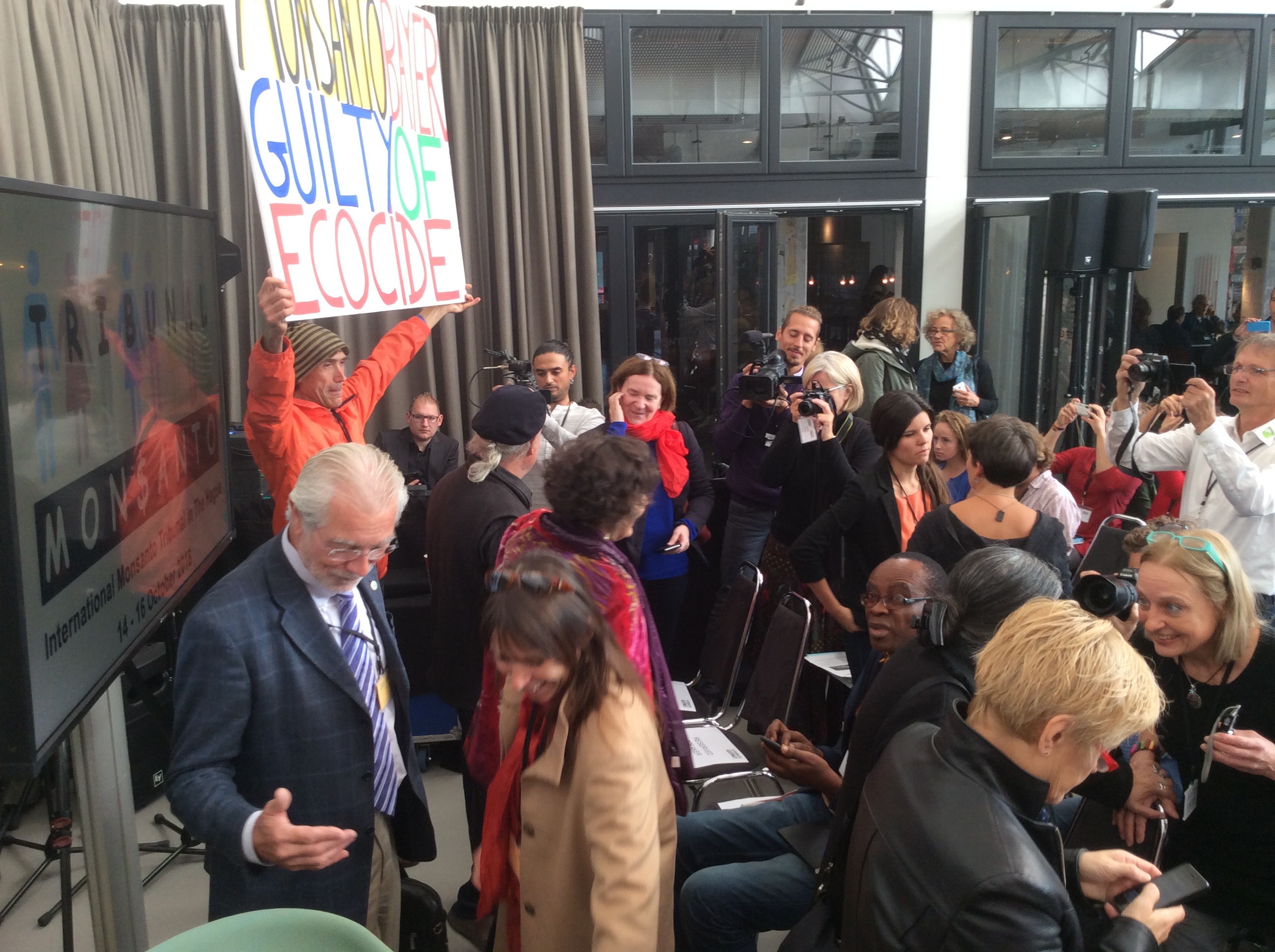
13.00h: Hans Herren, Valérie Cabanes, Ronnie Cummings, Renate Kunast, Nnimmo Bassey during the break at the end of the opening press conference
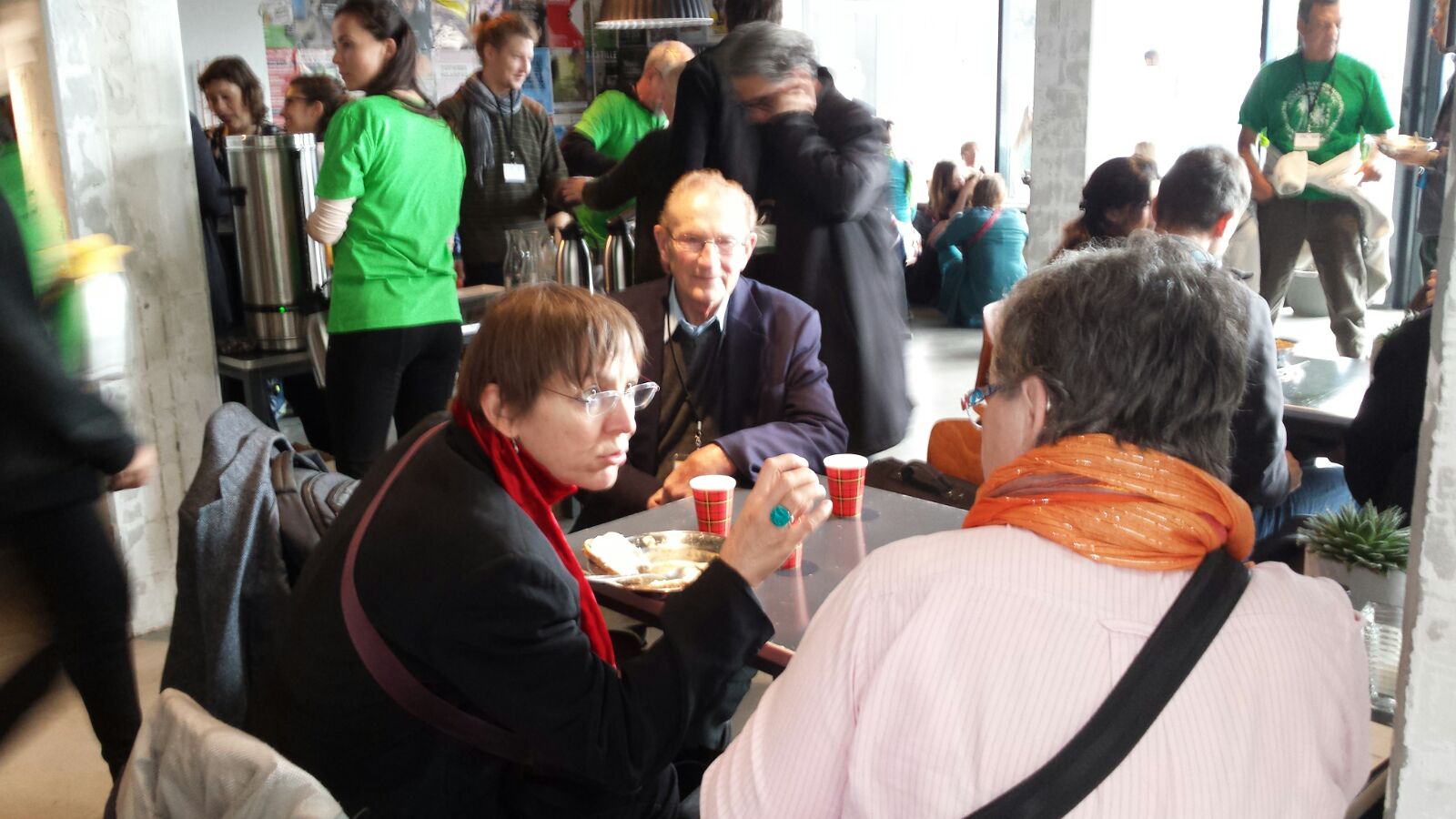
12.00: Percy Schmeiser is in the house!
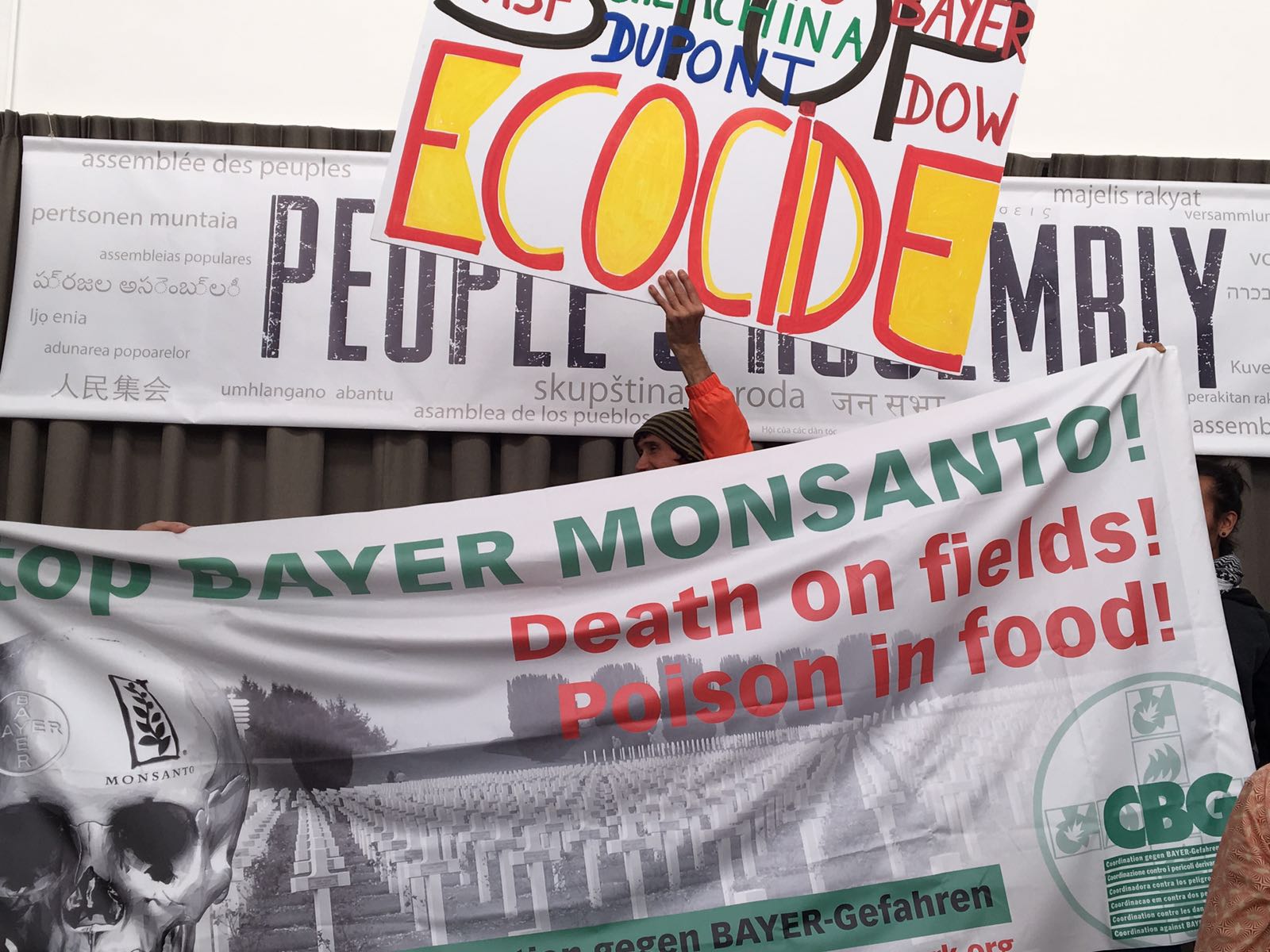
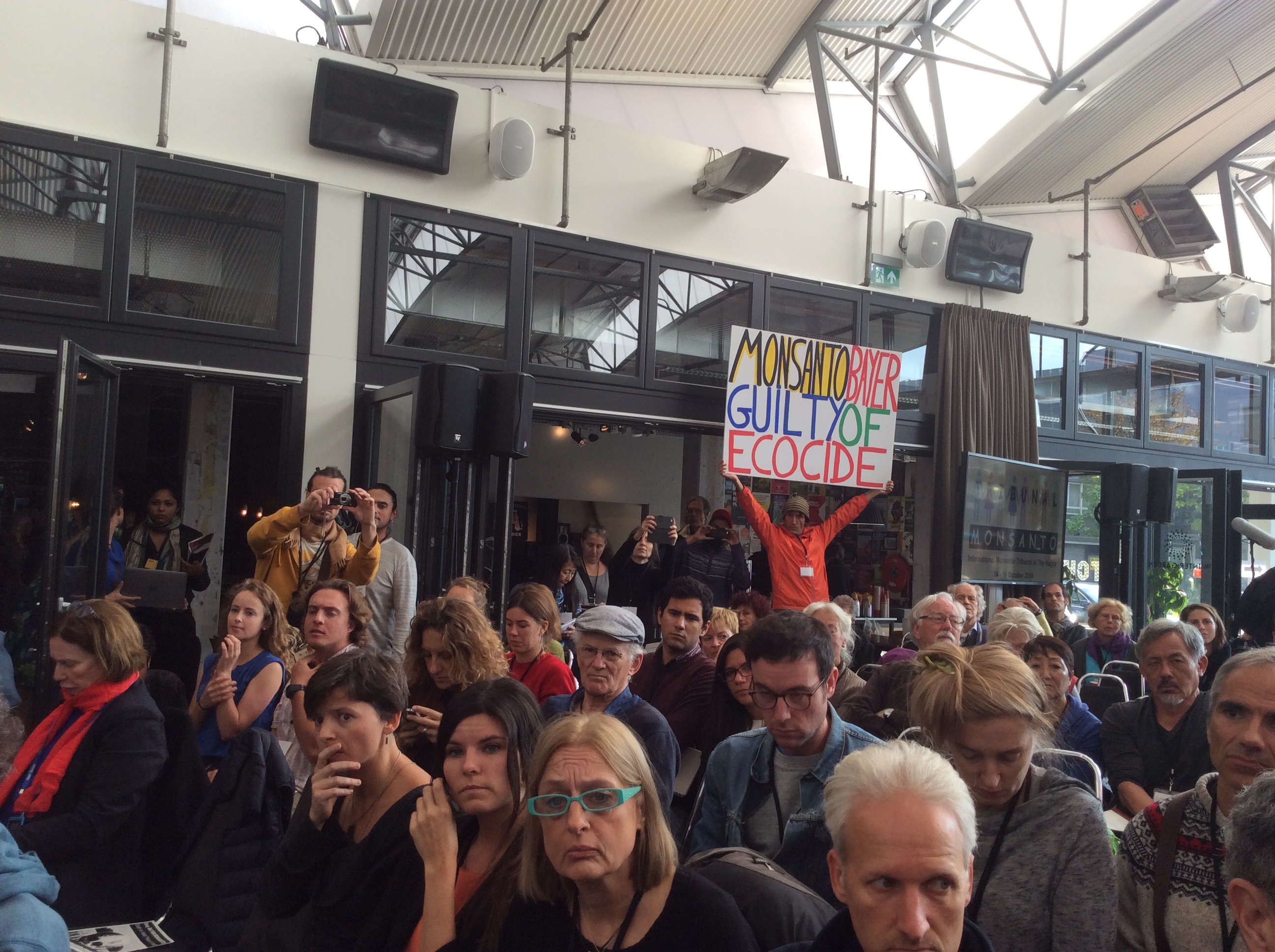
Audience attending the morning Press Conference and opening session “A Century of Ecocide and Genocide”
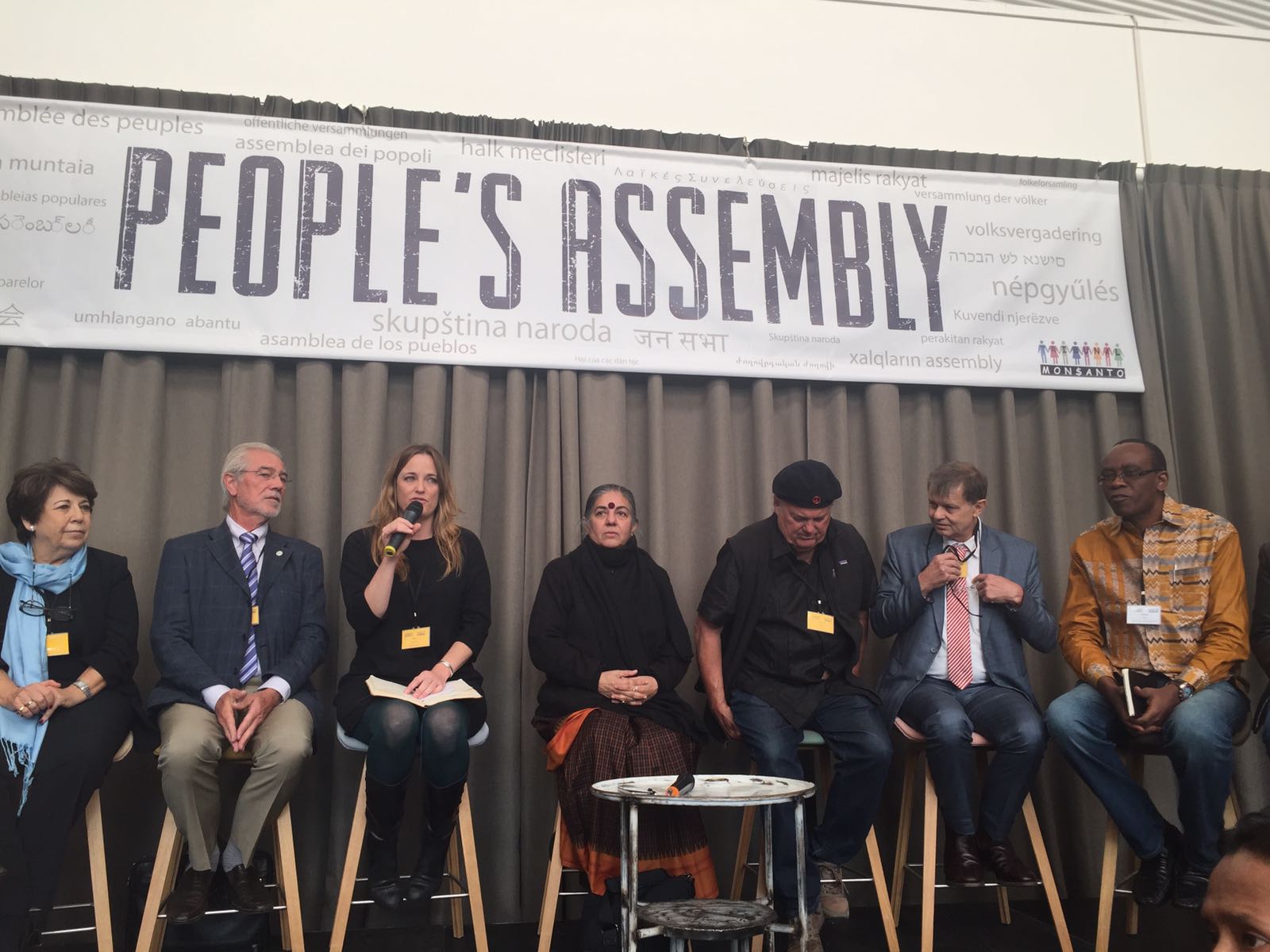
Mindi Schneider (holding microphone) asks about the Tribunal: “Monsanto tells us this isn’t a real trial, is that true?”
Corinne Lepage answers: – “The goal isn’t to give a nominal sentence. We are asking for an advisory opinion, to open a new way of thinking, a new way of legal thinking by real judges. The key idea is ecocide – acknowledging threats to the environment in a holistic way – and we seek to get ecocide considered a legitimate legal idea”.
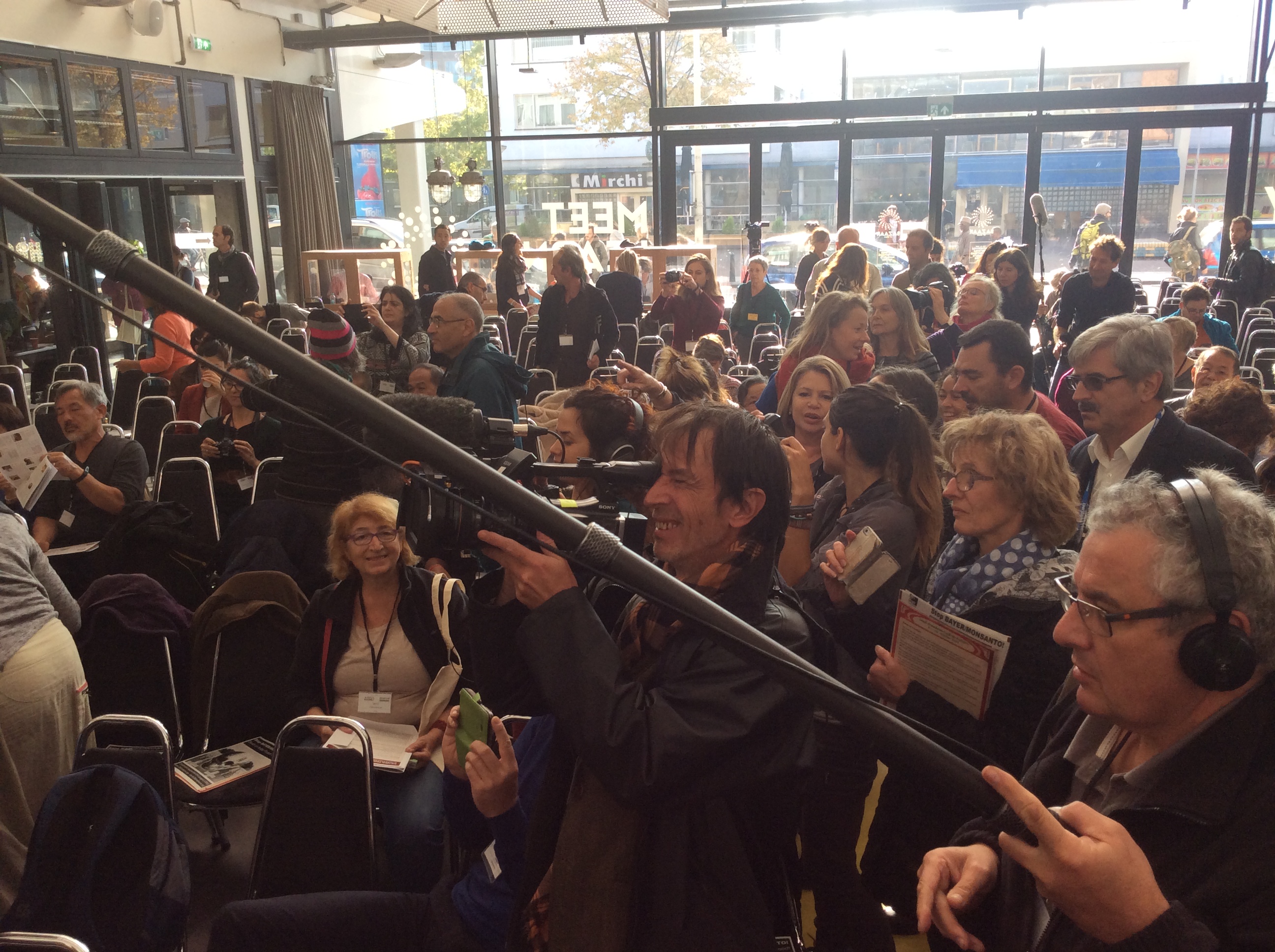
Press: “What will you do with the ruling of the Tribunal in the future?”
Emilie Gaillard answers: “We will create a brief to open a new way of reasoning in law with concrete the threats that will be presented at the Tribunal. The idea is to enrich the legal reasoning in international law. Last month the ICC said they are starting to look at crimes against the environment as crimes against humanity. It seems the way is opening to protect the environment, the earth, and future generations and this is a strong change of the paradigm. There is a confluence in the way of legal thinking and a new organization around the world – in Argentina, Hawaii, here, and in many other places. We are seeking to strengthen this convergence”.
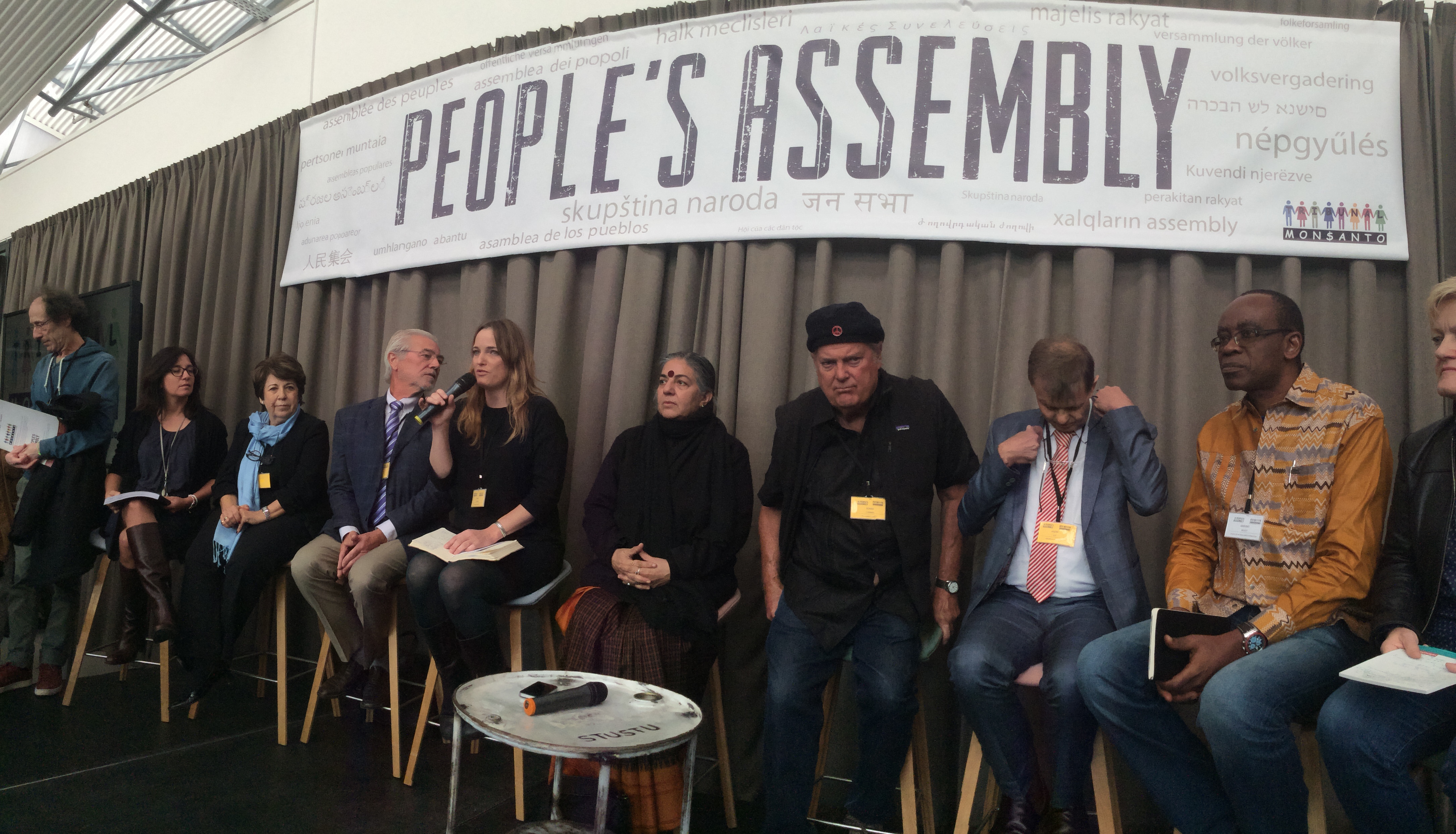
(left to right) Emilie Gaillard, Corinne Lepage, Hans Herren, Mindi Schneider, Dr Vandana Shiva, Ronnie Cummings, Andre Leu, Nnimmo Bassey and Renate Kunast
Renate Kunast: “We are living in the 21st century and we see the results of industrial agriculture of the 20th century – the real question now is what are we doing? Food prodution should be rights based – and there are two main rights. 1) We have the right to know how our food is produced, and whether the production process harms health or nature. Then we can decide whther to buy it or not to buy certain products. This is a human right in the 21st century. We are part of the economy and we have the right to know. 2) We have the right to safe food without residues, both for the consumer and the farmers working in the fields. These are the rights of the 21st century, if governments are not willing to represent us, we the people will do it on our own”.
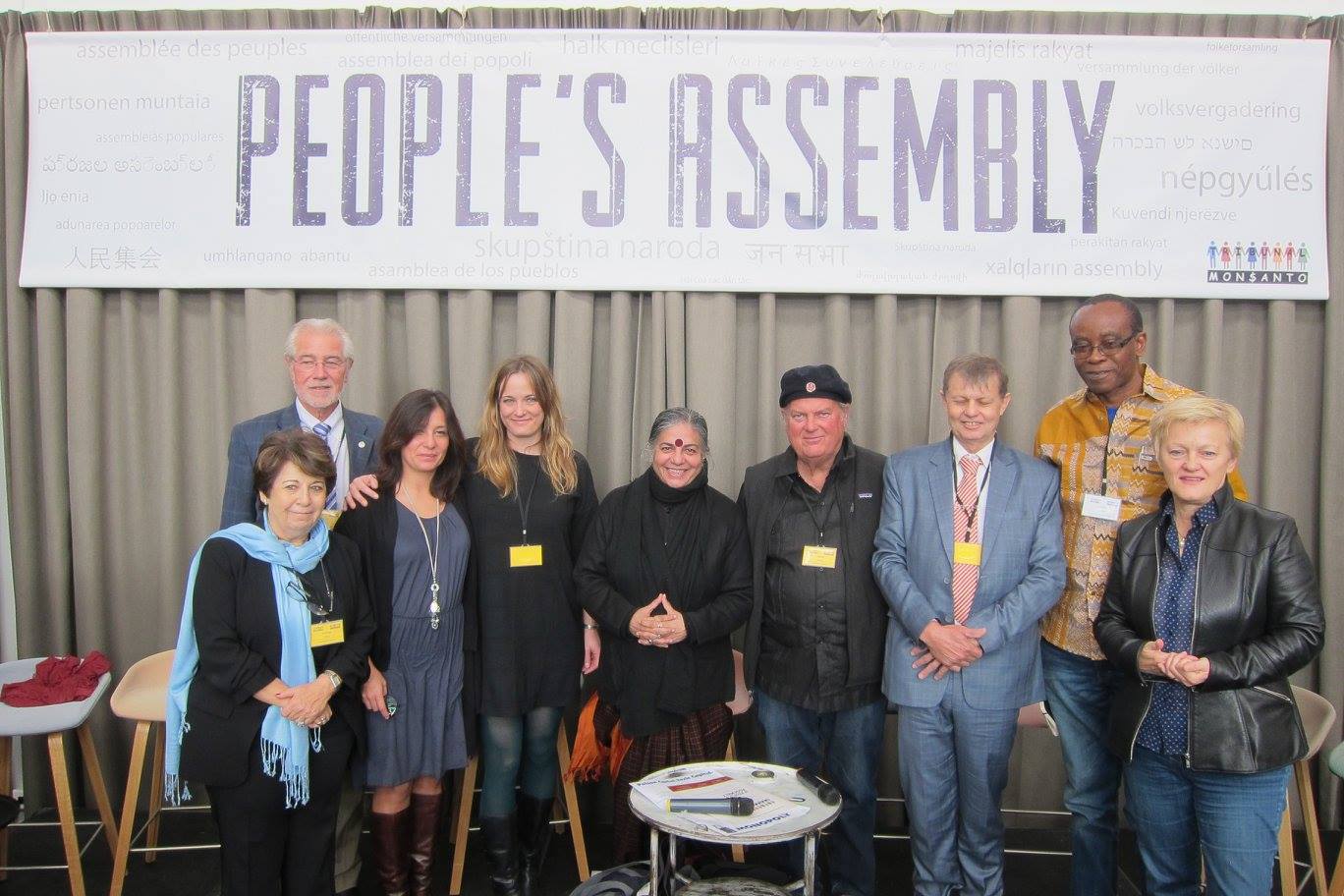
The Organizing Committee panel is complete.
From left to right: Corinne Lepage (CRIIGEN), Hans Herren (IAASTD), Emilie Gaillard, Mindi Schneider (ISS Institute), Dr Vandana Shiva (Navdanya), Ronnie Cummins (Regeneration International), Andre Leu (IFOAM), Nnimmo Bassey (Health of Mother Earth Foundation), and Renate Kunast
Hans Herren (Millennium Institute president and ICIPE director-general): “It is not enough to just feed the world, we want to nourish the world. We need more health per acre, not kilograms of starch per acre. I mean, how much more evidence do we as consumers and policy makers need? If it’s not us, if we don’t change the way, and we behave like nothing will change… In the end I have come to the conclusion that farmers will grow what you as a consumer choose to buy. As such, we need to vote with our feet, our wallet, we need to make sacrifices, or nothing will change. Lest things escape out reach, like Glyphosate. Glyphosate started as a pipe cleaner, now we eat it (…) we must come to our senses! We need to get back to reality: 60% of what you have in your plate needs bees. Alas, today it’ss all about business and short term cycle. This has led to mergers and companies too large to be held accountable in front of the law. Yet today, we have accumulated in seeds a huge amount of power. However, that power is getting lost by the minute by companies that are acquiring them”
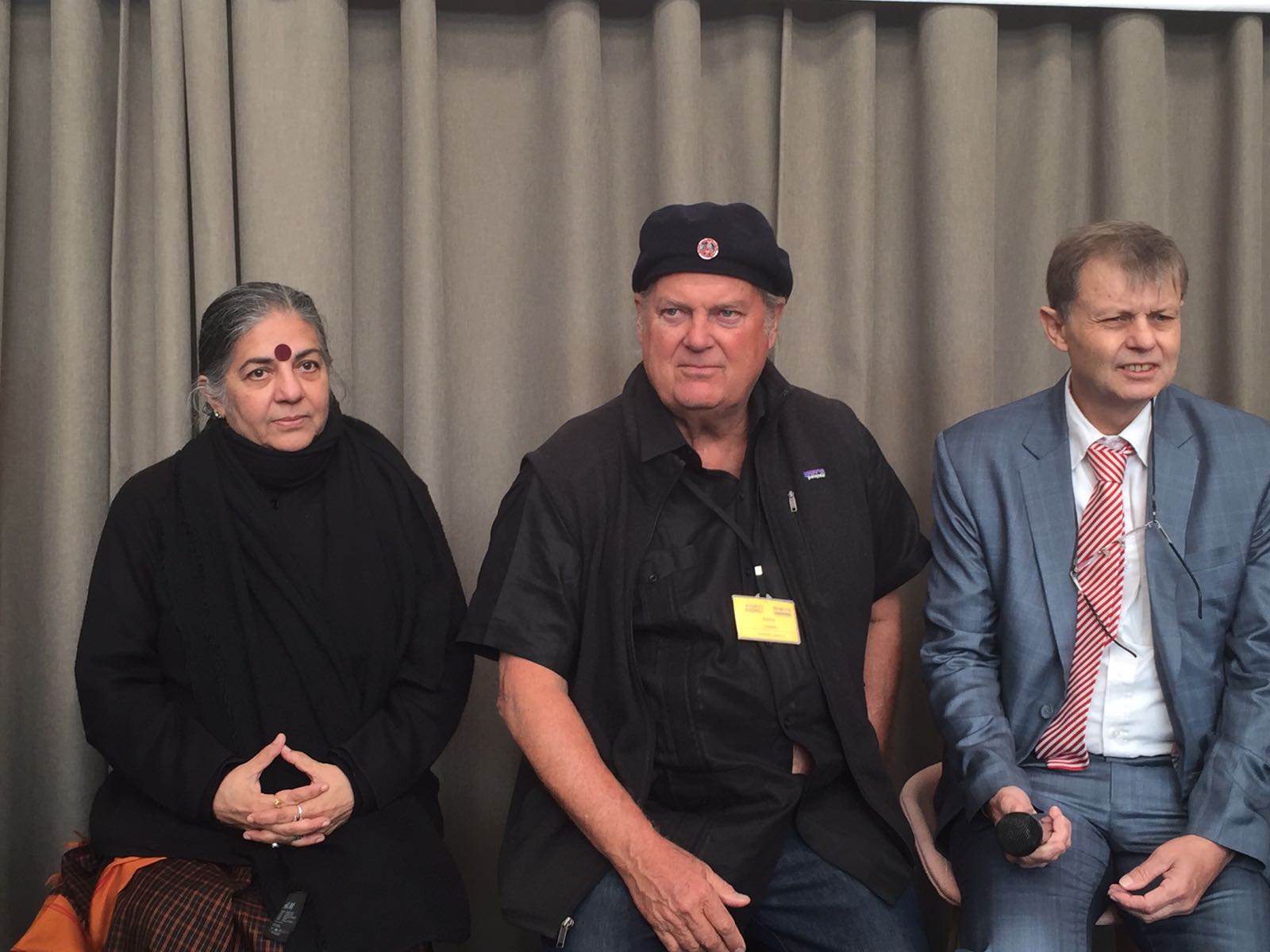
Andre Leu (IFOAM, Organics International): “We talk about ecocide, but we’re also really talking about genocide too. Children don’t have the enzymes in their liver to breakdown chemicals like Glyphosate. So there is no safe level for children. All the testing Monsanto does is on adult animals, and their testing does not take in consideration the fact that children cannot tolerate any amount of these chemicals. Published peer reviewed science shows clearly how glyphosate causes cancer, birth defects, and disrupts hormones. And epidemics of child obesity, diabetes, and autism are growing through the roof. The biggest crime is why are we poisoning our future – our children?”
Nnimmo Bassey: “Food is a celebration. Eating is a culture, a way of life. This Tribunal isn’t a struggle against a single corporation – it is a struggle for life, for freedom. It is a struggle from big companies holding mother earth as a slave for their profit. This is a very important moment for the future of humanity and for the future of our planet. To stop the toxic poising not just of our food systems, but our water systems. To stop the grab of our liberties just because the corporations have the power. I want to invite us to open our hearts and get ready to join hands in the struggles ahead. We will analyze and see that we are all together in this struggle”.
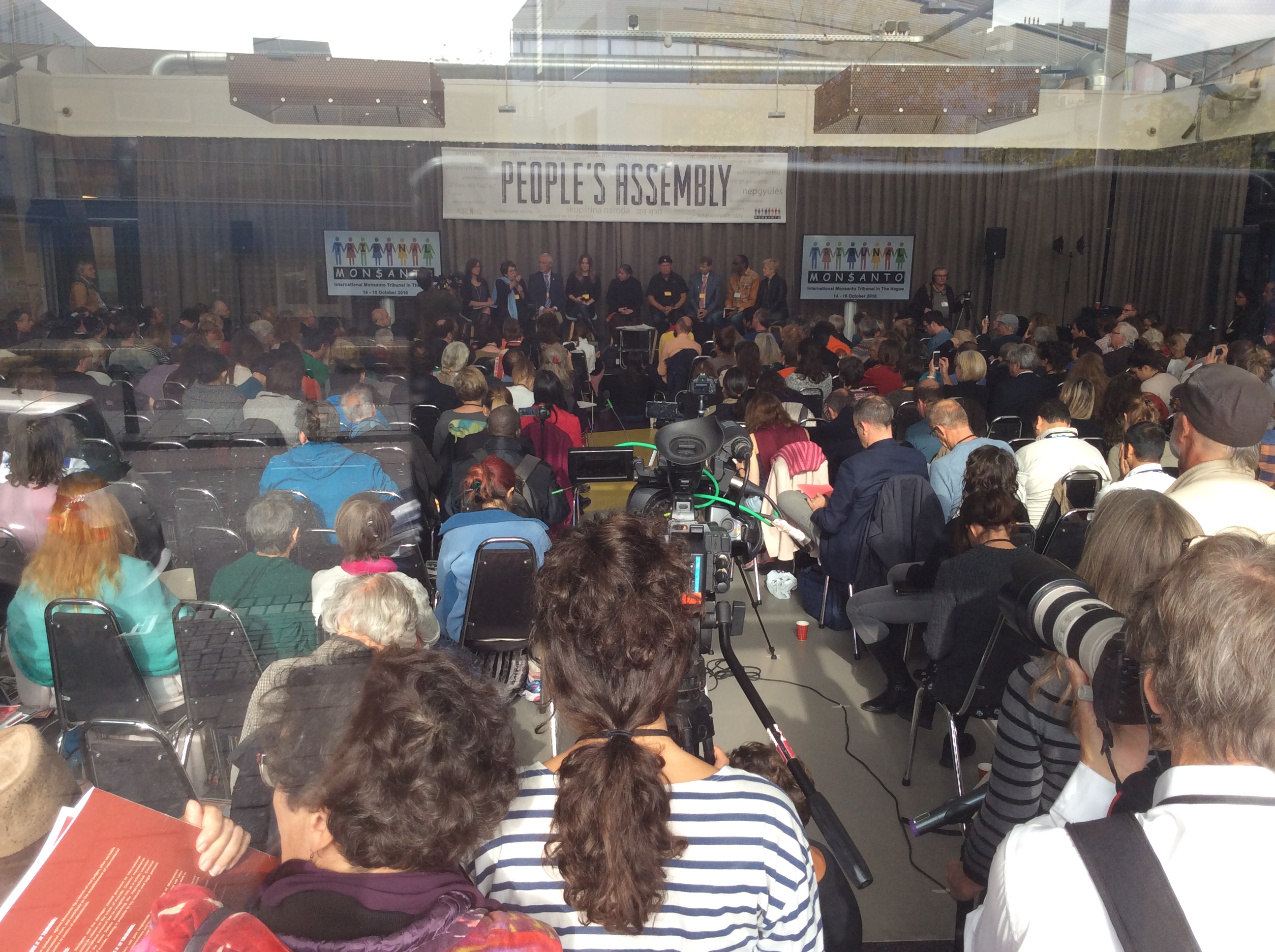
11.10 am- The press conference room is full!
Ronnie Cummins (Organic Consumers Association): “We have to get organized across borders. We have to come together in 200 nations – billions against Monsanto! Let’s come out of here with a fierce determination that if the governments of the world won’t usher in a new era, we the global grassroots will do it!”
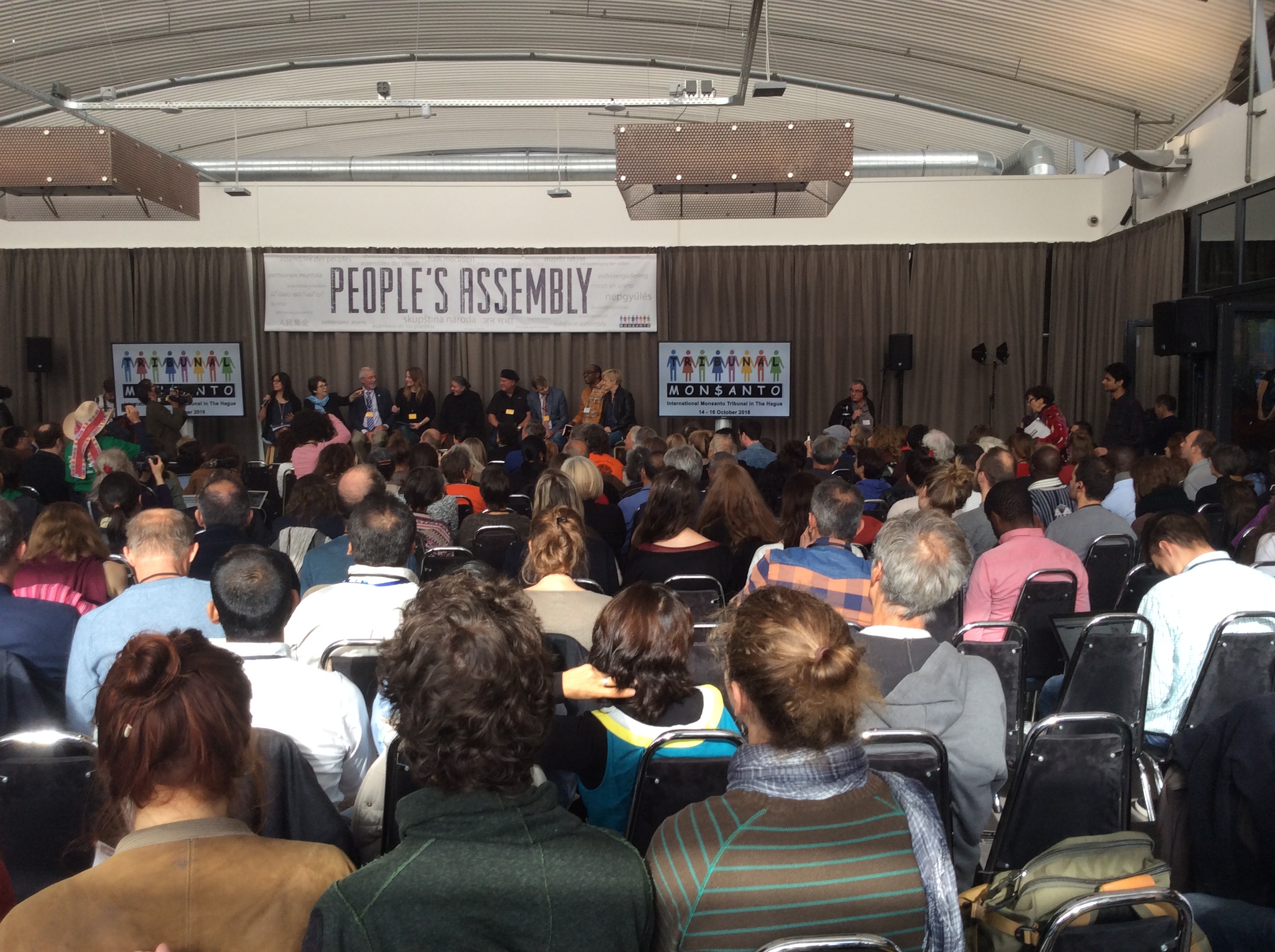
11:00am – The Press Conference has just started!
Press: “Shouldn’t there be a lawyer for Monsanto, just to be a fair trial?”
Vandana Shiva: “We invited Monsanto and they said no and the organizing committee didn’t want to appoint a lawyer in the place of Monsanto. We are putting on trial the biggest perpetrator of ecocide or genocide. They have controlled every platform of media, every platform of science, and for me, fairness is doing the tribunal and assembly by opening up the space for the rights of earth and people”.
Press (Regina Swartz, reporting for the German newspaper Jungeveld): “Did you invite some of the shareholder companies of Monsanto, like Blackrock, who actually own and make the decisions of Monsanto?”
Vandana Shiva: “The question you’ve raised is really the issue. This is what we are addressing. We are not just talking about the poison makers. We are talking about the 1% who are controlling the economy. We are talking about the Blackrocks and the Vanguards. Most of the ownership of these companies isn’t small shareholders. They are owned by big investment companies who hide in tax haves. This is the real work – we’ll have to do a tribunal and assembly on them in the future”.

10.55 am- Activists in the press conference room
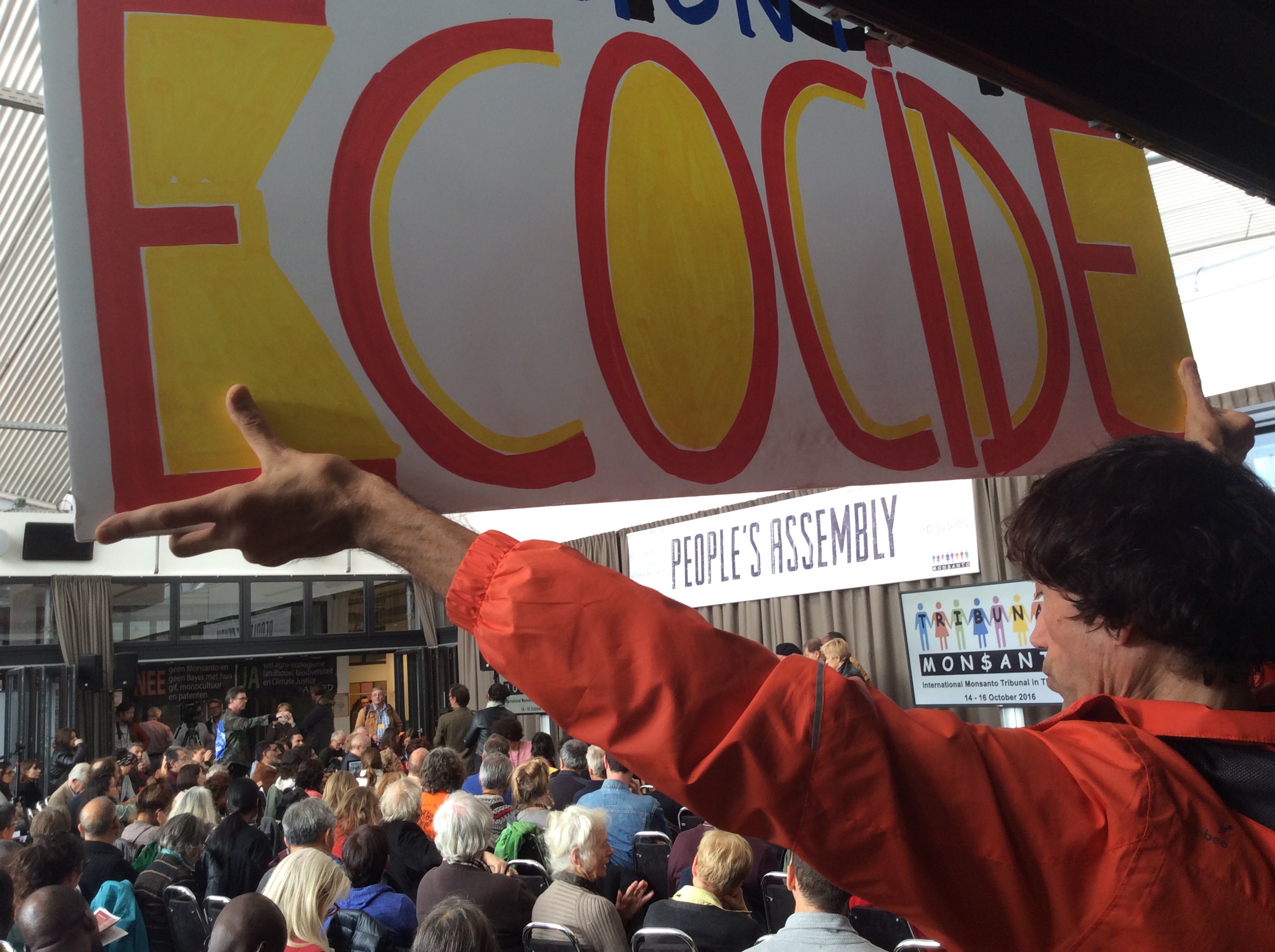
French activist Jean-Baptiste Redde at the Press Conference
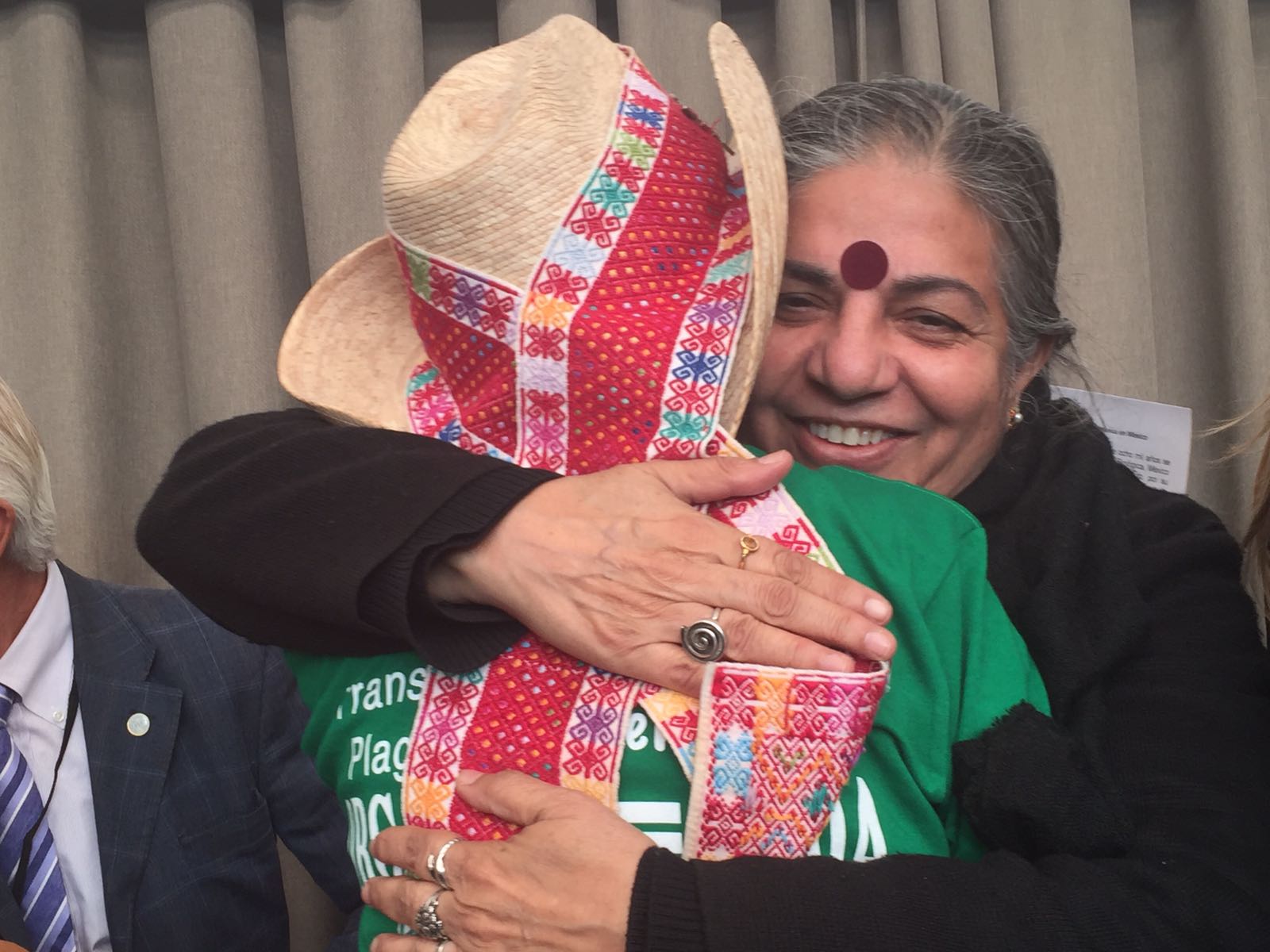
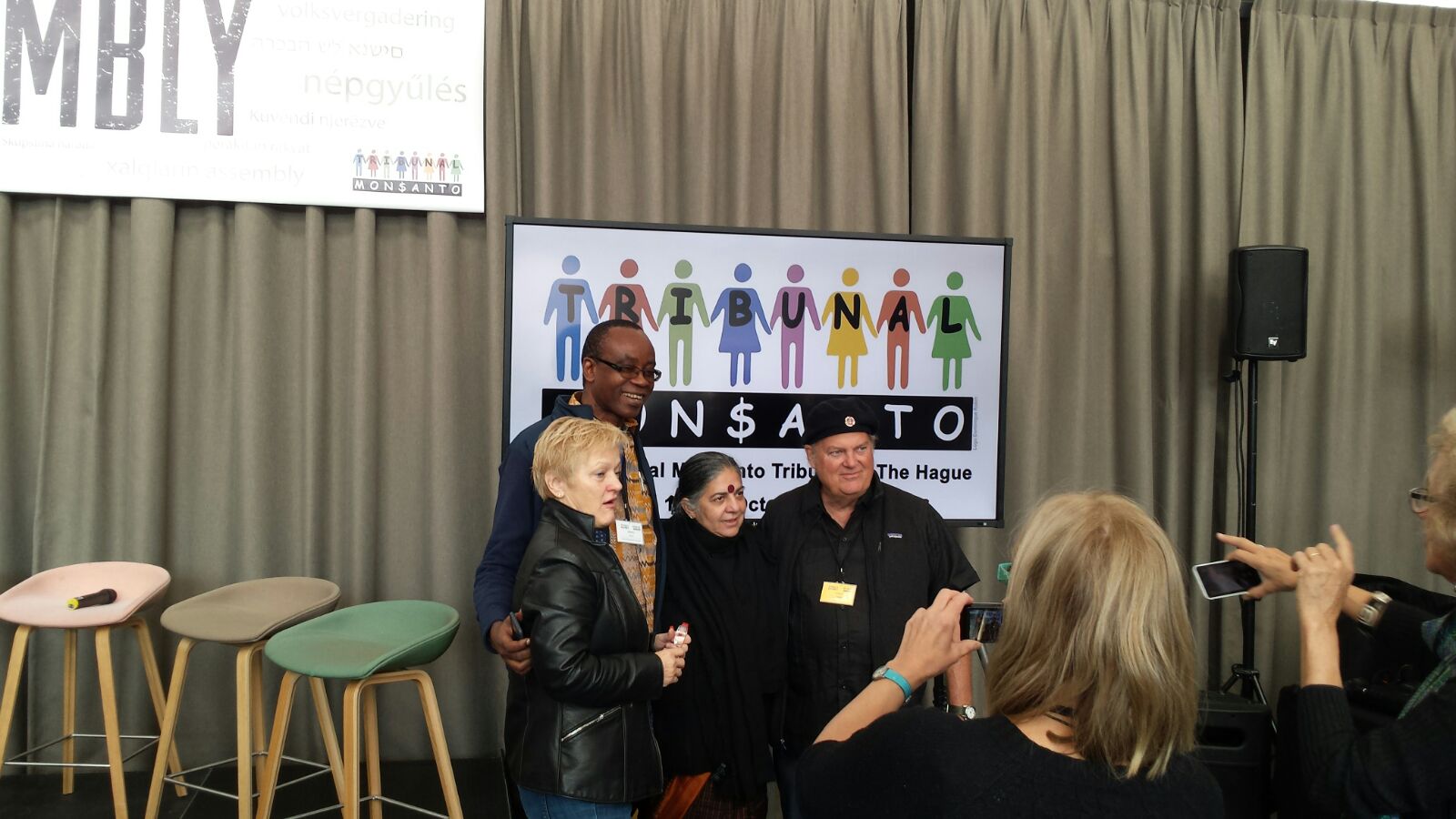
10.50 am- Members of the Organizing Committee and some main speakers greet Dr Vandana Shiva
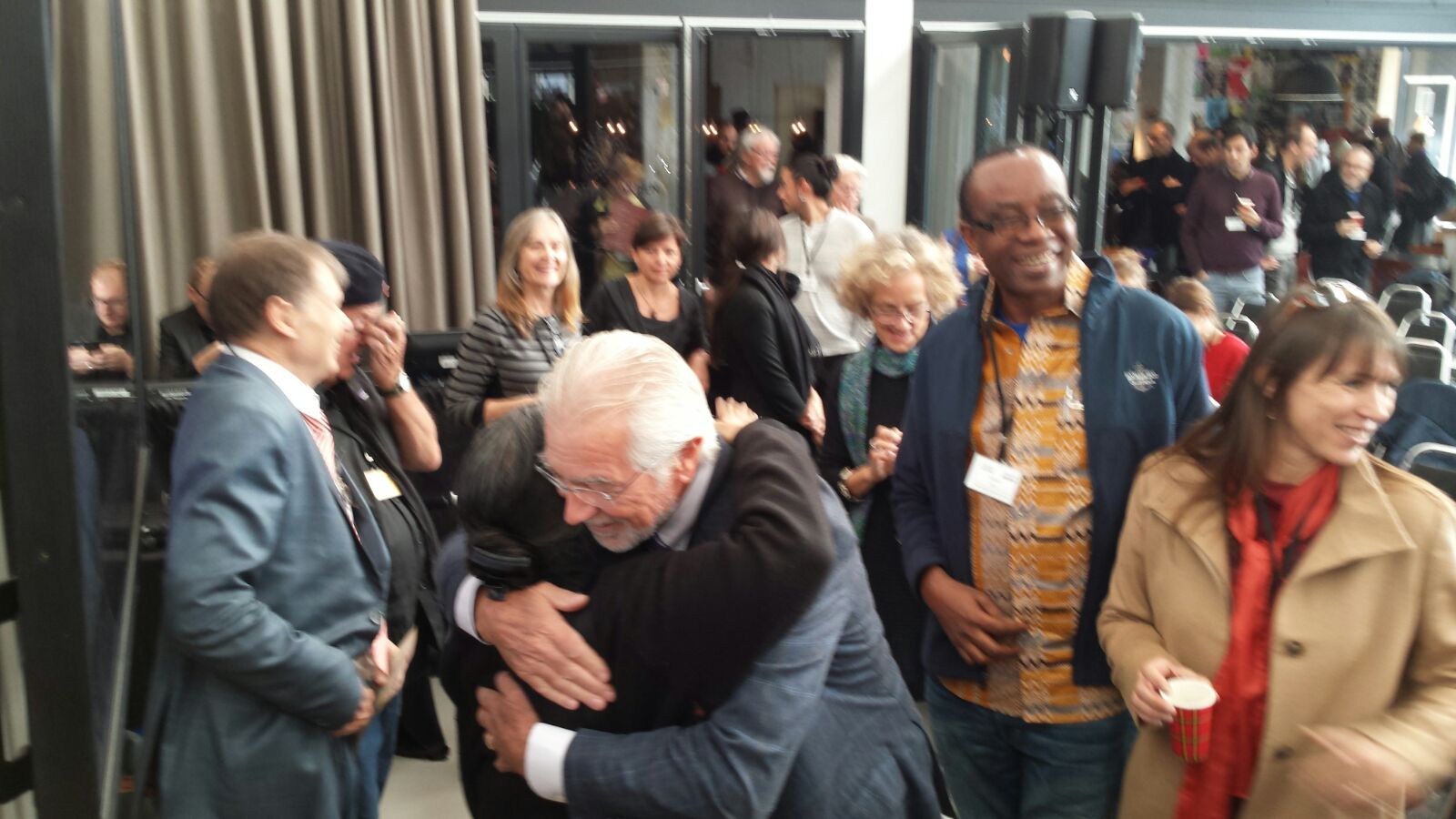
10.45 am: members of the Tribunal’s Organizing Committee greet before the beginning of the Opening Press Conference
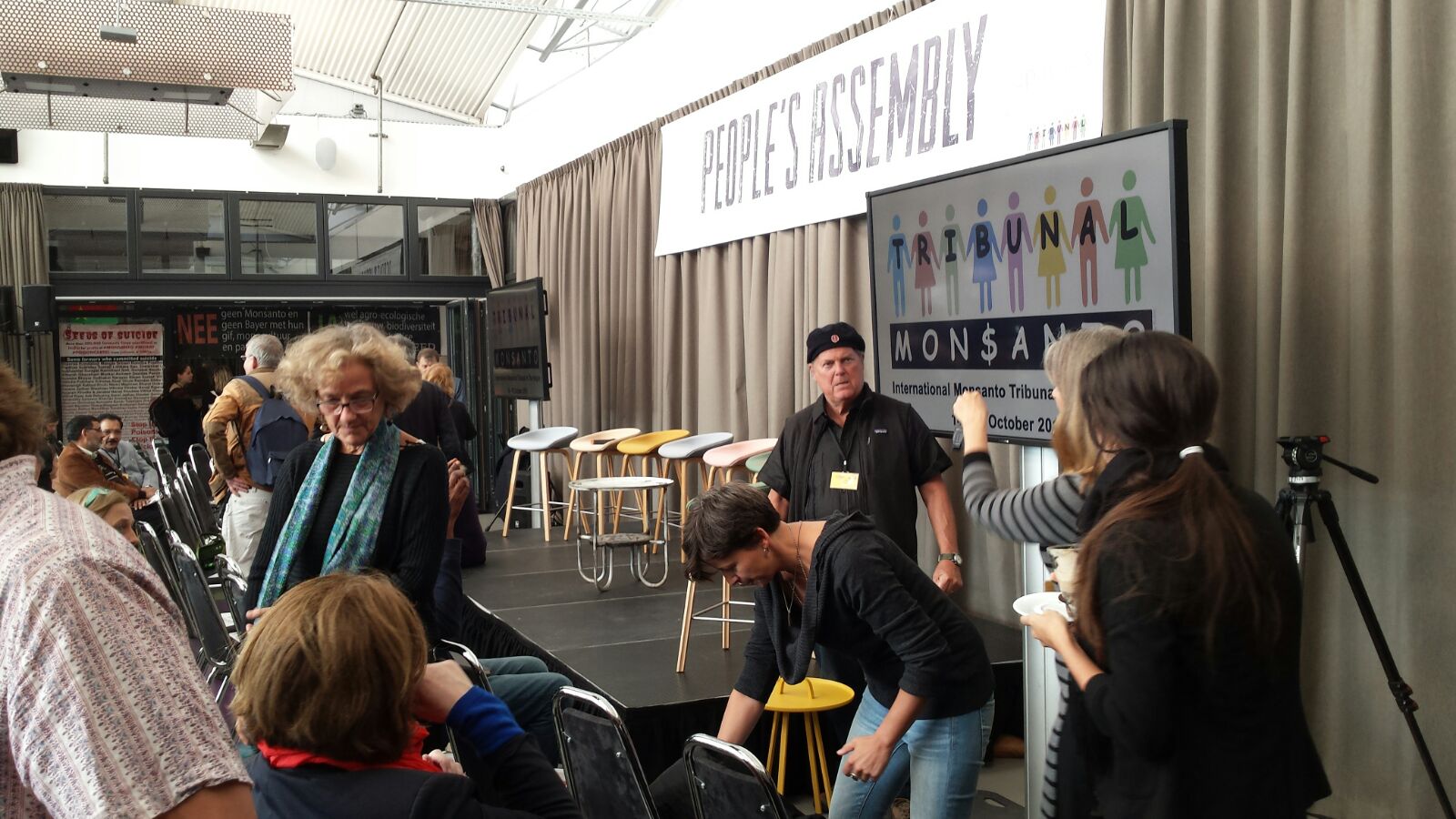
10.30 am – Press conference is about to begin…
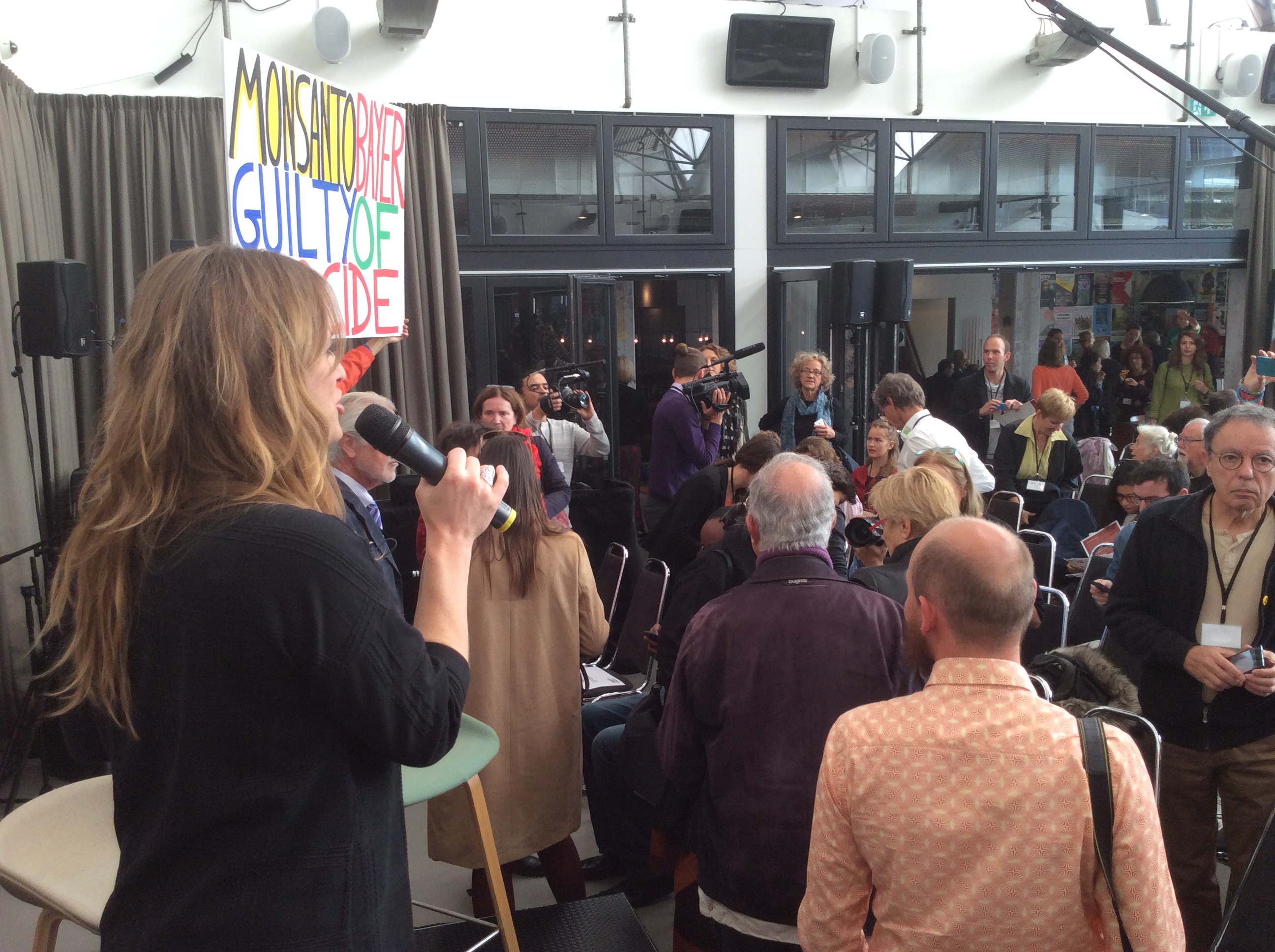
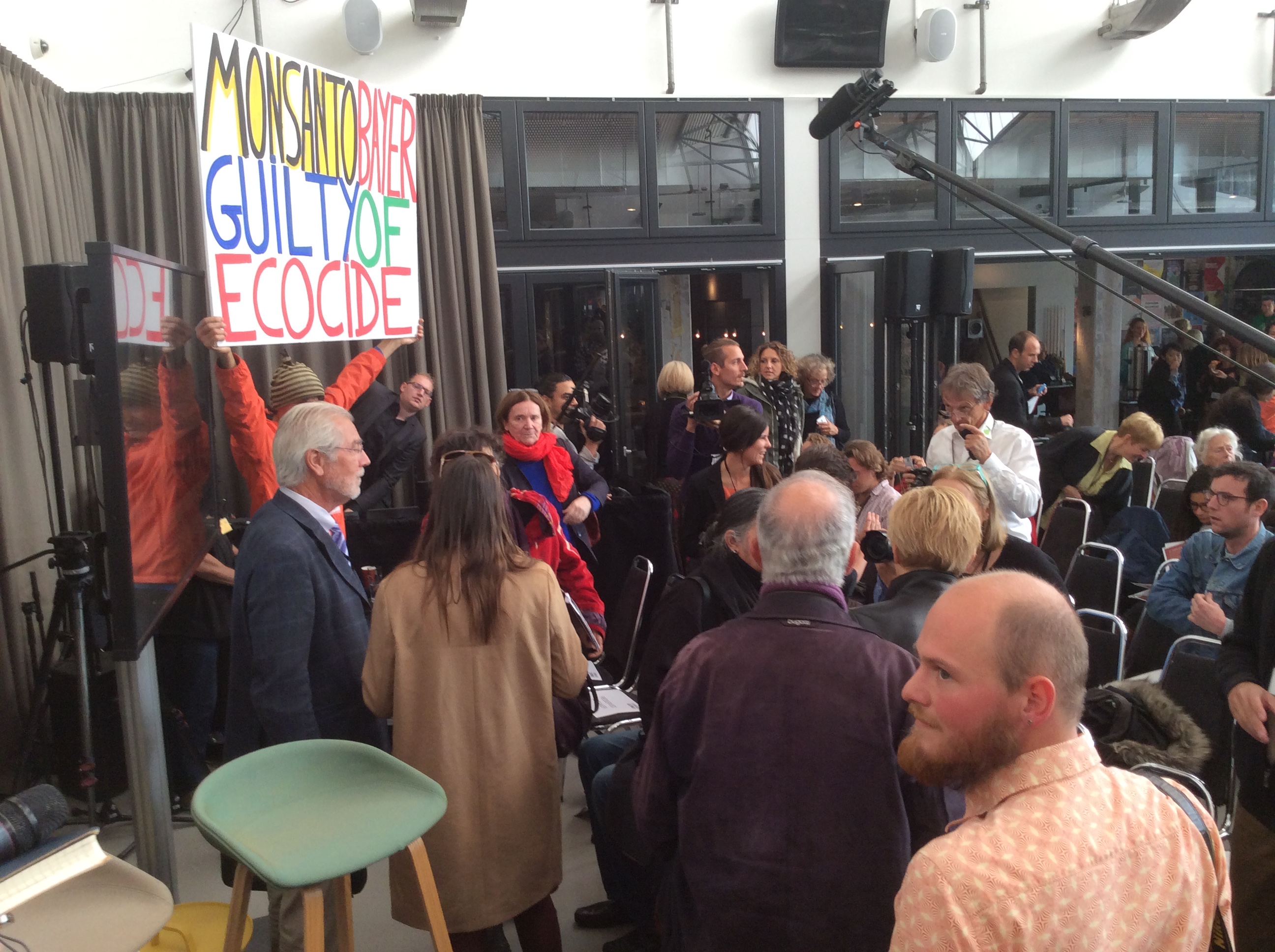
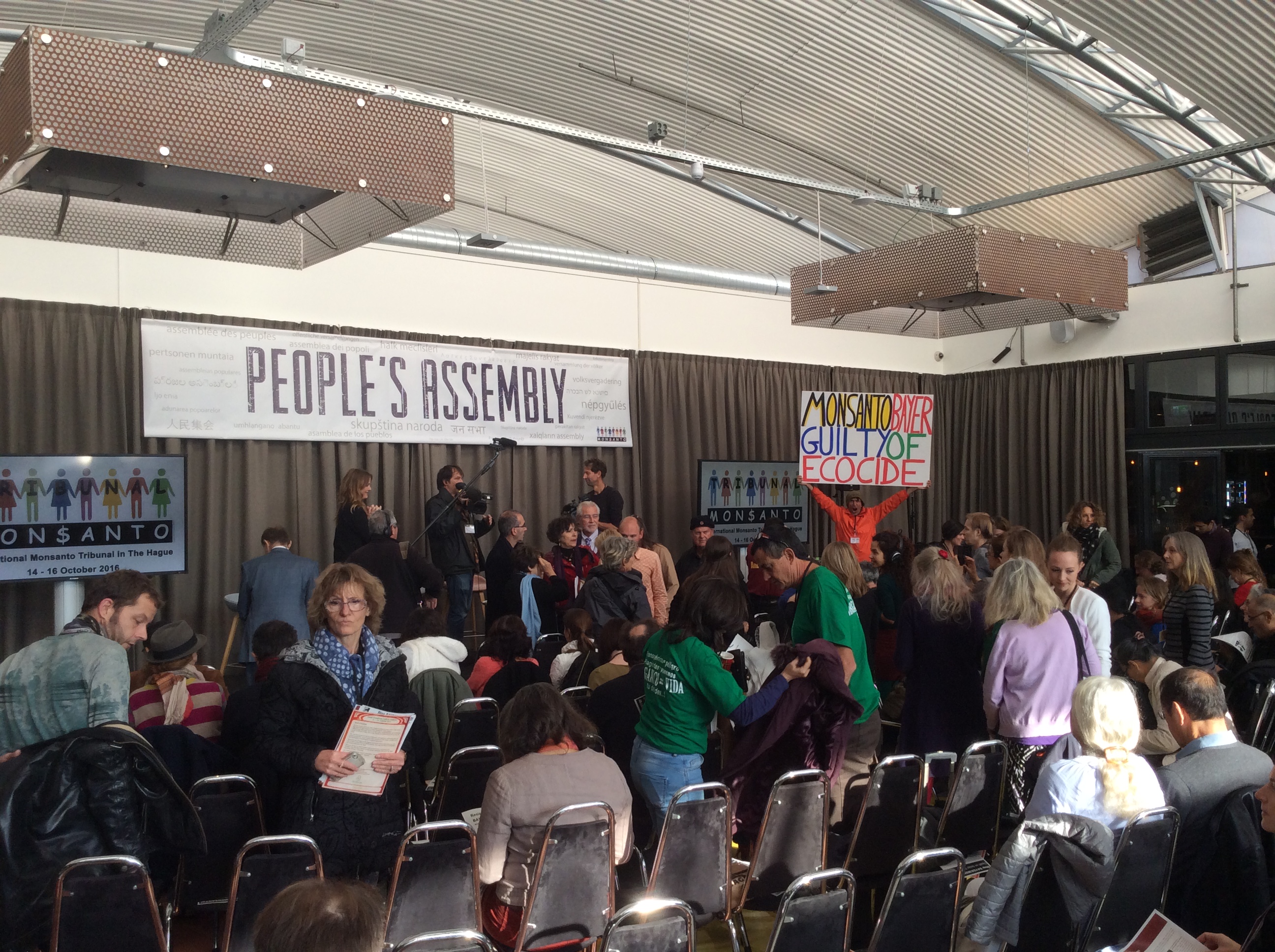
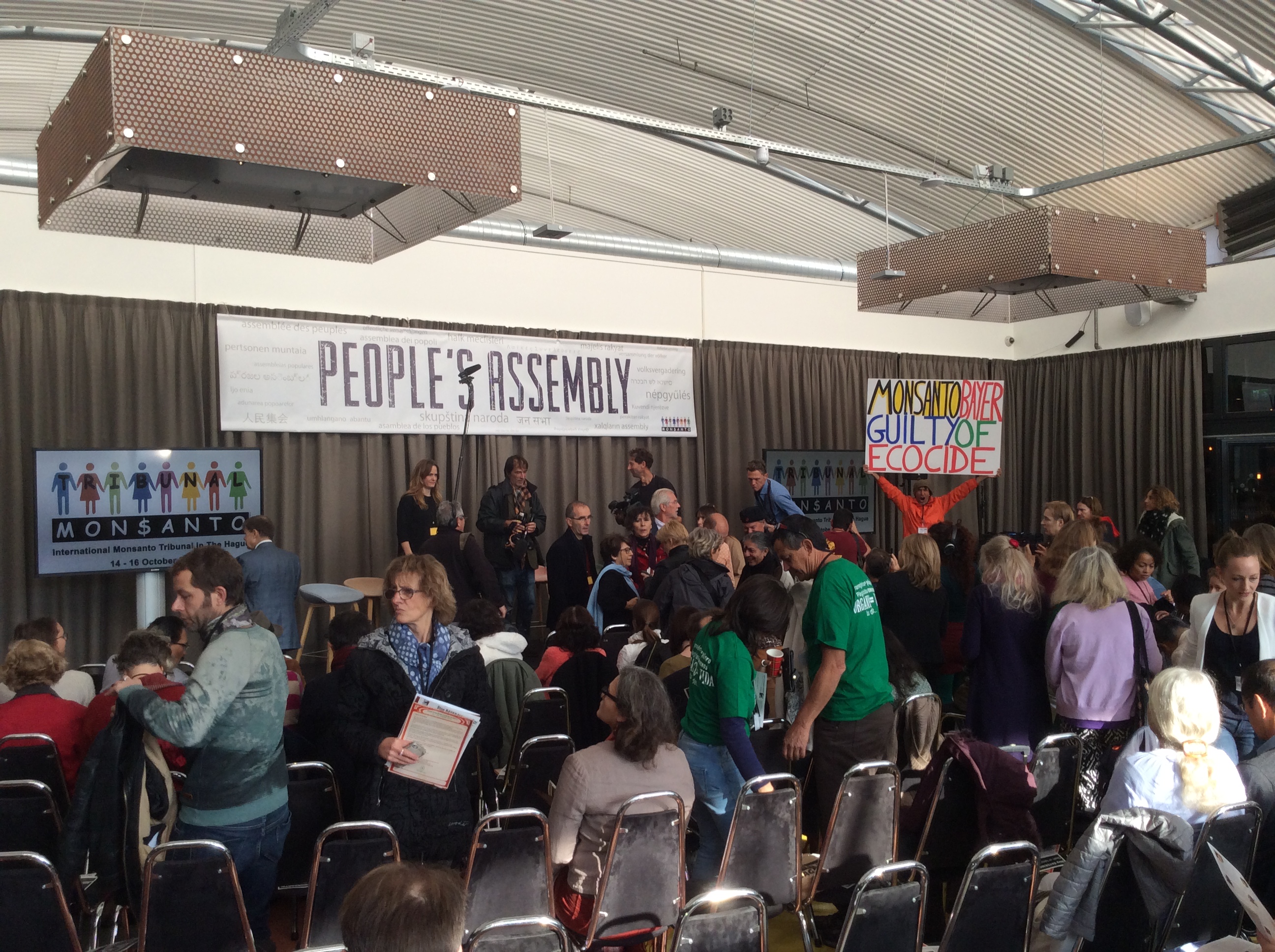
October 14th, Bazaar of Ideas, 10.30 am: preparations for the Opening Press Conference with the Organizing Committee of the Tribunal






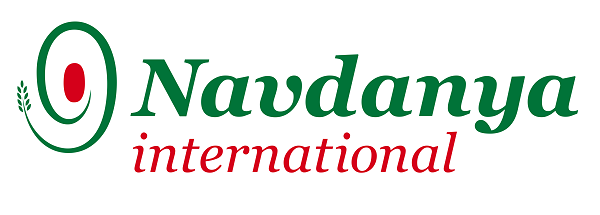
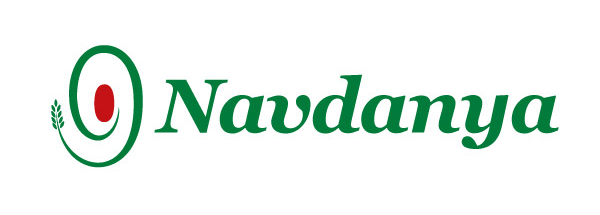
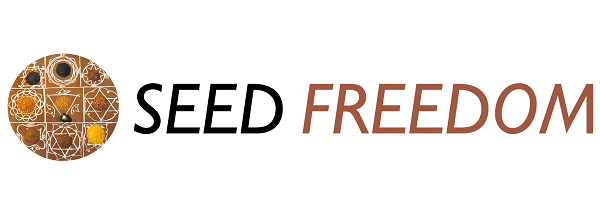
Pingback: A matter of fraud: hidden poisons in pesticides